SFNet’s 40 Under 40 Profiles









MEET THE INDUSTRY’S FUTURE LEADERS




We congratulate the 2023 RECIPIENTS OF SFNET’S on their well-deserved accomplishment.


















MEET THE INDUSTRY’S FUTURE LEADERS




We congratulate the 2023 RECIPIENTS OF SFNET’S on their well-deserved accomplishment.










SFNET’S 40 UNDER 40 PROFILES: P16








On March 8, International Women’s Day, SFNet president and former CEO of Gerber Finance and eCapital ABL, Jennifer Palm er announced the formation of JPalmer Collective. The asset-based lending firm will provide customized financing solutions with white glove, consultative services designed to help businesses grow sustainably and founders to retain their equity.

From promotions to new jobs, award winners share their career advice for the class of 2023 winners and what they have learned. 96


 BY EILEEN WUBBE
BY EILEEN WUBBE
Business disaster is only a click away. Cyberattacks are becoming an epidemic affecting all businesses. A single mishap can critically impair business operations or even shut down operations entirely resulting in catastrophic financial and reputational damage 104
BY BRIAN ALLEN AND THOMAS J. DEMAYOPanelist Hugh Larratt-Smith provides a recap of SFNet’s March 30th Crucial Conversations webinar, “The Value and Effective Use of Covenants in a Factoring Transaction”. 107
BY HUGH LARRATT-SMITHMany people, especially women and people of color, experience self-doubt and think they don’t deserve the success they’ve achieved. Known as “imposter syndrome,” this view of self can be debilitating if left unchecked. Here are ways to combat it. 110
BY SHEILA AMOThis column highlights the hard work and dedication of SFNet committee volunteers. Here we speak with Larry Flick, firm-wide vice chair, and chair of the Financial Services Industry Group at Blank Rome, LLP, and the chair of SFNet’s Membership Committee. 112
BY EILEEN WUBBEThis new column will highlight those times in our professional lives where we are especially proud of a successful outcome; the times where it was “all worth it.” Thank you to Mark Fagnani of PKF Clear Thinking and a member of the SFNet Content Council for suggesting the concept of this column. 111
BY EILEEN WUBBEThe Secured Finance Network is the trade group for the asset-based lending arms of domestic and foreign commercial banks, small and large independent finance companies, floor plan financing organizations, factoring organizations and financing subsidiaries of major industrial corporations.
The objectives of the Association are to provide, through discussion and publication, a forum for the consideration of inter- and intra-industry ideas and opportunities; to make available current information on legislation and court decisions relating to asset-based financial services; to improve legal and operational procedures employed by the industry; to furnish to the general public information on the function and significance of the industry in the credit structure of the country; to encourage the Association’s members, and their personnel, in the performance of their social and community responsibilities; and to promote, through education, the sound development of asset-based financial services.
The opinions and views expressed by The Secured Lender’s contributing editors and authors are their own and do not necessarily express the magazine’s viewpoint or position. Reprinting of any material is prohibited without the express written permission of The Secured Lender
The Secured Lender, magazine of the asset-based financial services industry (ISSN 0888-255X), is published 8 times per year (Jan/Feb, March, April, May, June, September, October and November) $65 per year non-member rate, and $105 for two years non-member rate. SFNet members are complimentary.
Secured Finance Network 370 Seventh Avenue, Suite 1801, New York, NY 10001. (212) 792 -9390 Email: tsl@sfnet.com www.SFNet.com
Periodicals postage paid at New York, NY, and at additional mailing offices. Postmaster, send address changes to The Secured Lender, c/o Secured Finance Network, 370 Seventh Avenue, Suite 1801, New York, NY 10001
Editorial Staff Michele Ocejo Editor-in-Chief and SFNet Communications Director mocejo@sfnet.com
Eileen Wubbe Senior Editor ewubbe@sfnet.com
Aydan Savaser Art Director asavaser@sfnet.com
Advertising Contact: James Kravitz Business Development Director T: 646-839-6080 jkravitz@sfnet.com
Cecile Latouche joined 36th Street in 2022 and succeeds Gerard Kammerer who remains with the firm as a senior advisor. She brings more than 15 years of equipment finance experience to the position, including prior senior risk officer roles, having established herself as a highly respected executive and leader in the industry.
Genevieve Forsman and Juliana Clark have joined as portfolio analysts in Los Angeles, CA. In this role, Forsman and Clark are responsible for account management, operational and collateral compliance, and portfolio monitoring. Forsman was previously an associate at TELEO Capital in the Los Angeles metropolitan area, and Clark held the position of associate at IEQ Capital in the San Francisco Bay area.
Axiom Commercial Finance has hired Sanou Cisse as senior account executive in its factoring team. Cisse’s responsibilities will include managing client relationships and supervising the loan process.
Blank Rome LLP announced that Sheherbano “Sherry” R. Mirza has joined the firm’s Chicago office in the Finance, Restructuring & Bankruptcy practice group. Mirza expands the firm’s growing Chicago office, which added partner Bill Katris in early March. She concentrates her practice on representing financial institutions, lenders, and funds on a wide range of financing and restructuring matters.
Joel Moss as a Bankruptcy and Restructuring Partner
Joel Moss has joined the firm’s New York office as a partner in its Bankruptcy &
Restructuring practice. Moss’s practice focuses on representing a broad range of clients including financial institutions, hedge funds, direct lenders and ad hoc secured lender and noteholder groups in complex in-court and out-of-court restructurings, workouts, rescue financings, liability management transactions and DIP and exit financings.
Cadence Business Finance announced the addition of Steven Janson and Mark Buren as managing directors, expanding the company’s footprint for asset-based lending solutions to middle-market companies. Janson joins in Charlotte, NC and brings 25 years of experience performing underwriting, relationship management and business development duties in corporate lending and asset-based lending. Buren covers the Mid-Atlantic market. With over 35 years of asset-based lending experience, as well as experience in healthcare finance, purchase order finance and factoring, he has worked on transactions up to $50 million at wellrecognized financial organizations.
CohnReznick Announces Expansion in Florida with Addition of Daszkal Bolton Team
The partners and employees of Daszkal Bolton (DB), a prestigious, regional South Florida accounting, tax, and advisory firm, have joined CohnReznick. This is the latest strategic expansion for CohnReznick to support geographic and client growth.
Shawn Flowers Joins CohnReznick LLP as ERP Principal
Shawn Flowers has joined the firm as a principal in its Technology+ practice. Flowers has extensive experience developing, deploying, and managing all facets of enterprise resource planning (ERP) systems across multiple industries including manufacturing, wholesale distribution, pharmaceuticals, software, and financial services.
Eastern Bank Launches Equity Alliance for Business, Further Advancing Growth Opportunities for Underrepresented Business Owners
As part of its deep and long-standing commitment to drive greater economic inclusion and mobility, Eastern Bank launched the Equity Alliance for Business to further advance the growth of underrepresented business owners and entrepreneurs. Specifically for business owners who are women or people of color and all their intersectionality, including the LGBTQIA+, veterans and disabled communities, Equality Alliance for Business provides a specialized credit offering designed to meet the needs of diverse business owners.
EisnerAmper
Naomi Barrett will work closely with leadership and colleagues to enhance and execute the firm-wide DE&I strategy. She will partner with service line and operations leaders to integrate and align the firm’s DE&I commitment to overall business plans and operating principles. Additionally, she will serve as an advisor to the DE&I Council and Employee Resource Group leaders by facilitating their programs and goals, including the ongoing support of the communities in which EisnerAmper serves.
A managing director at Getzler Henrich since 2014, Robert Gorin has more than 30 years of client-centric focus to business strategy and operations through his work in corporate turnarounds, process design and improvement, corporate mergers and acquisitions, and management consulting.
Gibraltar Business Capital (GBC) is pleased to announce the launch of its new equipment financing business, Gibraltar Equipment Finance (GEF). GEF provides term financing solutions complementing
GBC’s asset-based lending products and furthers GBC’s strong track record of business lending innovation. GEF will be led by equipment finance industry veteran Jeffry S. Pfeffer, serving as president. Pfeffer brings more than 35 years of innovative credit, lending, and equipment financing experience.
Carolyn D’Angelo, who also serves as president of Laura Ashley and oversees Nicole Miller, drives global operations under an asset-light model for the firm’s portfolio of brands. She focuses on new development, securing and managing licensees and retail partners, marketing, product design and delivering experiences to keep Gordon Brothers’ brands relevant and emotionally connected to the consumer.
Hancock Whitney has established a new companywide asset-based lending (ABL) division primarily serving 12 states across the southern United States. Mike Knuckles, an asset-based lending executive with decades of industry experience, will lead the line of business based in suburban Atlanta, GA, and direct all recruiting and hiring. Knuckles joined Hancock Whitney after serving as an executive vice president responsible for establishing and managing a successful ABL division for another Southeast based regional commercial bank for the past nine years.
Continuing its expansion with hands-on experienced process improvement experts, Steve Savoy and Frederic Vanlinthout have been named associate directors of Hilco Performance Solutions (HPS), a management consulting firm that consists of operational and financial experts
in the areas of Manufacturing, Supply Chain, Sales & Customer Experience, Organizational Design, and M&A.
Savoy has over 25 years of both industry and consulting experience supporting companies with their transformational efforts leveraging his knowledge of supply chain, operations, manufacturing, procurement, program management and strategy.
Vanlinthout has a BA in advanced applied economics and an MA in management engineering (materials technology), both from the University of Antwerp. He also holds an MBA (Finance) from Drexel University’s LeBow College of Business.
Finance Industry Veteran Jennifer Palmer Launches Asset-Based Lending Company: JPalmer Collective
SFNet President and former CEO of Gerber Finance and eCapital ABL, Jennifer Palmer, announced the formation of JPalmer Collective. The asset-based lending firm will provide customized financing solutions with white-glove, consultative services designed to help businesses grow sustainably and founders to retain their equity.
With 16 years of experience in the commercial finance industry, Palmer has helped fund the growth of many beloved and successful women-led and natural products brands, including Stasher, Baby Gourmet and Coola. She is joined by Melissa Fleishman as COO, a finance veteran with 25 years of asset-based lending expertise recognized as a distinguished leader in the industry by the Secured Finance Network, and Laura Newman as CFO, a CPA who has spent her career in the accounting and financial services industries on Wall Street and in Big 4 accounting. The firm is headquartered in New York.
Brian Rieber Joins LSQ Supply Chain Finance Team
LSQ announced the hiring of industry veteran Brian Rieber as vice president of Working Capital Solutions. In his role, Rieber will be focused on helping companies create supply chain finance programs to meet their liquidity needs. Rieber has more than 20 years’ experience
in the industry and is based in upstate New York and will be working with LSQ’s prospects and customers in the Northeast region.
McGuireWoods is bolstering its global banking and finance capabilities with the arrival of London partner Alan Holliday, who returns to the firm’s highly ranked debt finance practice after serving in a senior legal role at a leading UK financial institution.
Robert Ellenbogen will be responsible for delivering industry and companyspecific analysis to MUFG’s Leveraged Finance Platform in support of deal origination, sales and trading, and investor connectivity, with a focus on the energy sector.
In the new role, Christy Morgan will oversee all legal materials for onboarding clients and work on amendments for existing clients. She will partner with the underwriting, sales and client service teams to provide crucial support across the business. Her expertise in disclosure and regulatory requirements adds tremendous value to the company and its fast-paced growth trajectory.
Yan Zhang, who has extensive crossborder transactions experience, has joined the global law firm’s San Francisco office. Coming from Baker Botts, Zhang represents public and private companies in corporate and securities matters along with the financial institutions that invest in or provide services to them.
support the recapitalization of Advertiser Perceptions, the leading provider of research-based strategic market intelligence and analysis to the media, advertising, and ad tech industries, by Eureka Equity Partners. Additionally, Abacus made an equity co-investment in Advertiser Perceptions.
Million KMG Staffing Inc., dba KMG Healthcare (“KMG”), a provider of trained healthcare talent to hospitals and healthcare facilities
Healthcare IT solutions provider with extensive experience established a goal to grow and become a national provider to leading hospitals and healthcare systems
a leading global supplier of engineered materials with a strong focus on innovation and sustainability, Charlotte, NC
$31.2 Million Family-owned and operated manufacturer and distributor of high-quality home and garden equipment for professional and consumer use
facility Aurelius Finance Company
Financial Services
$5 Million Algenist, a clinical skincare brand delivering anti-aging based on natural, botanical ingredients such as Alguronic Acid from algae
$30 Million FitFlop, known for its ergonomic design and contemporary styling and offers sandals, sneakers, shoes, boots, plus select apparel items
$30 Million Big Box retailer, Mexico
Financial Services, Inc. (AFS) Non-bank $5 Million IT services company
Financial Services, Inc. (AFS) Non-bank $3 Million Contract and private label manufacturer of chocolate confectionary products
trade finance facility
facility
facility, which includes an AR and inventory revolver along with an M&E term loan
Avenue Capital Non-bank $40 Million LifeMD, Inc., a leading direct-to-patient telehealth company
Bank of America, N.A. [Administrative Agent]
Non-bank $525 Million Topgolf Callaway Brands Corp, an American global sports equipment manufacturing company that designs, manufactures, markets and sells golf equipment
Telehealth Senior secured credit facility
Golf equipment Senior secured ABL revolving credit facility
Bastion Management and Hudson Cove Capital Management
Big Shoulders Capital
BNP Paribas Securities Corp., MUFG Bank, Ltd., TCBI Securities, Inc., and KeyBank National Association and BNP Paribas [Administrative Agent]
Non-bank $100 Million NexGen Financial Inc. who works closely with sales affiliates and servicers to assist consumers with debt settlement across various creditors, Malibu, CA
Non-bank $1 Million Plastic injection molding with an automotive customer concentration
Bank $1.1 Billion U.S. Silica Holdings, Inc., a global performance materials company, Katy, TX
Debt settlement Senior debt facility
Plastic injection molding Term loan
Commercial silica Fourth amended and restated credit agreement, consisting of a $950 million senior secured term loan B due March 2030, and an increased revolving credit facility to $150 million
Brightwood Capital Advisors
Non-bank 300 Million Giving Home Health Care (“GHHC”), which coordinates skilled and unskilled home health and home aid services to long term chronically ill individuals in Arizona, Colorado, Nevada, New Mexico, Texas, and Utah.
Healthcare Senior secured credit facility
B. Riley Financial, Inc.
Non-bank $59.75 Million Harrow Health, Inc.’s acquisition of the exclusive commercial rights to five FDA approved ophthalmic products, Nashville, TN
Cambridge Savings Bank (CSB) Bank N/A BFC Solutions (BFC), a national provider of commercial HVAC and refrigeration filter replacement and related routine preventative maintenance services, Nashville, TN
Celtic Capital Corporation
Non-bank $2 Million 55-year-old California-based company that provides research and development, formulation and manufacturing of dry blended food products
Eyecare pharmaceutical Debt financing
Commercial HVAC Senior credit facility
Cargill Financial Services International, Inc.
Non-bank $145 Million Local Bounti Corporation, a breakthrough U.S. indoor agriculture company
CIBC Innovation Banking Bank $40 Million Viz.ai to expand the San Francisco-based company’s AI-powered care coordination platform and fuel its expansion, including potential acquisitions
Food $1.5 million accounts receivable line of credit and a $500,000 inventory line of credit
Agriculture New financing
Artificial intelligence Growth capital financing
Citi®
Citizens Bank, N.A.
Million Social Mobile, a leader in delivering custom enterprise mobility solutions
$925 Million CrossAmerica Partners LP, a leading wholesale distributor of motor fuels, convenience store operator, and owner and lessee of real estate used in the retail distribution of motor fuels
Million OYA Renewables, a leading energy transition solutions platform, Toronto, Canada
maintenance and welding services company
$2 Million Specialized healthcare solutions company
fuels
and restated five-year Revolving Credit Facility agreement
secured revolving credit facility Encina Private Credit, LLC
Crédit Agricole CIB [Sole Arranger and Bookrunner] Bank $100 Million Allegiant Travel Company, focused on domestic leisure travel and services to residents of under-served cities in the US., Las Vegas, NV
equity Senior secured credit facility Export Development Canada
$155 Million Global technology focused private equity firm for the acquisition of a leading provider of cloud-based enterprise software solutions
$10 Million Polaris Renewable Energy Inc. a Torontobased company engaged in the operation, acquisition, and development of renewable energy projects in the Americas
First Citizens Bank Bank $44.2 Million Affiliates of Kayne Anderson Real Estate and Remedy Medical Properties to finance a portfolio of medical office building properties
First Citizens Bank Bank $48 Million To finance the acquisition of the Dunson Grove apartment community in Davenport, FL
First Eagle Alternative Credit Non-bank $30 Million West Marine, an American company based in Fort Lauderdale, FL, which operates a chain of boating supply and fishing retail stores
Flatbay Capital LLC
$6.96 Million Commercial transportation company, Texas
Renewable energy Floating rate term loan facility
estate Financing
estate Senior secured loan
FILO term loan
Owner-occupied CRE
Capital
$800,000 Non-profit staffing firm
Factoring facility FVCbank Bank $20 Million Jushi Holdings Inc., a vertically integrated, multi-state cannabis operator
Non-dilutive debt financing GemCap Non-bank N/A Fuel transport company
Inventory financing
Non-bank N/A Technology distributor Technology Inventory and receivables revolver GemCap Non-bank N/A Whiskey wholesaler Spirits Inventory and receivables revolver
Million Private equity group
Goldman Sachs Lending Partners LLC, Bank of America, N.A., Barclays Bank PLC, Mizuho Bank, New York Branch, Morgan Stanley Bank N.A, PNC Bank N.A, Wells Fargo Bank, National Association, Societe Generale and Deutsche Bank AG, New York Branch, Sumitomo Mitsui Banking Corporation, Bank of Montreal and Citibank, N.A.
Gordon Brothers
Green Ivy, an affiliate of Chicago Atlantic
Bank $2 Billion Griffin Asset Management, a commercial aircraft leasing and alternative asset management business with offices in Dublin, Ireland, Puerto Rico and Los Angeles
Commercial aircraft leasing Senior secured warehouse facility
£5 Million Modus Subsea Services Limited, a leading offshore contractor delivering life-of-field support utilizing Smart Subsea Services
N/A Goodness Growth Holdings, Inc., a cannabis company whose mission is to provide safe access, quality products and value to its customers while supporting its local communities through active participation and restorative justice programs.
Offshore contracting
Cannabis Amended credit facility
Greystone Monticello Non-bank $201.3 Million Portfolio of New Jersey-based skilled nursing facilities Healthcare Total capital financing
Highbridge and Nant Capital Non-bank $22.5 Million NantHealth, Inc., a member of the NantWorks ecosystem of companies, and a provider of software solutions for the healthcare industry
Huntington Business Credit Bank
Needler Enterprises, Inc., an operator of grocery stores throughout Western Ohio, Eastern Indiana and Western Florida, headquartered in Findlay, OH
Jefferies Bank $130 Million Danimer Scientific, Inc., a leading nextgeneration bioplastics company focused on the development and production of biodegradable materials
JMB Capital Partners Non-bank $75 Million Sorrento Therapeutics, Inc., a biopharmaceutical company dedicated to the development of life-saving therapeutics to treat cancer, intractable pain, and infectious disease
Software Senior secured term loan
Grocery store Credit facility
Bioplastics Senior secured term loan
Biopharmaceutical Debtor-in-possession (DIP) financing
J.P. Morgan, Silicon Valley Bank, and KeyBanc Capital Markets Bank $95 Million Socure, the leading provider of digital identity verification and fraud solutions
J.P. Morgan and KeyBanc Capital Markets Inc., with participation by California Bank & Trust
Bank $125 Million Collectors Holdings, Inc., the global leader in authentication and management of collectibles, with offices in Los Angeles, New York, Seattle, Hong Kong, Shanghai, Tokyo and Paris
Iron Horse Credit Non-bank $2 Million Hydroponic grow systems and nutrients distributor
KeyBanc Capital Markets and City National Bank Bank $225 Million Scale Microgrids, a vertically integrated distributed energy platform, Ridgewood, NJ
King Trade Capital Non-bank $8 Million Growing sorbet brand
Macquarie Group [Administrative Agent], Helaba (Landesbank Hessen-Thüringen), and ICBC Standard Bank Plc (ICBCS)
Bank $200 Million Vesper Energy, a leading developer, owner, and operator of utility-scale renewable energy assets
Madison Realty Capital Non-bank $44 Million McKee Homes, a Raleigh, NC-based home builder and developer, and the Huff Family Offices, for The Palms at Edgewater, a 288-unit multifamily apartment complex in Summerville, SC
Monroe Capital LLC Non-bank N/A
Vytalize Health, which facilitates and manages risk-based contracts for primary care providers, serving more than 250,000 patients, Hoboken, NJ, alongside private equity sponsor, Enhanced Healthcare Partners
Identity verification Three-year credit facility
Collectibles authentication Revolving line of credit
Distribution: Hydroponic grow systems
Stand-alone inventory revolving line of credit
Energy Non-recourse project finance debt facility
Food Purchase order finance facility
Energy Upsized its existing letter of credit (LC) facility from $140 million to $200 million
Home builder and developer Transitional Loan
Monroe Capital LLC Non-bank N/A
To support the strategic investment and future growth of Amelia, a global leader in Conversational Artificial Intelligence (“CAI”), alongside private equity sponsor BuildGroup
Healthcare Senior credit facility and equity coinvestment
Monroe Capital LLC Non-bank N/A
To support the acquisition of Medusind, Miami, FL, a leading provider of technology solutions and revenue cycle management services to physicians and clients in the healthcare industry, by private equity sponsor Alpine Investors
AI Senior credit facility
Monroe Capital LLC Non-bank N/A
To support the continued growth of Snowden Lane Partners, an existing portfolio company of Estancia Capital Partners and a nationally branded, open-architecture, hybrid registered investment advisor and broker-dealer that provides wealth advisory services to high net-worth individuals, families, and institutional clients
Technology Senior credit facility
Wealth advisory Senior credit facility
J.P. Morgan, Silicon Valley Bank, and KeyBanc Capital Markets
J.P. Morgan and KeyBanc Capital Markets Inc., with participation by California Bank & Trust
Bank $95 Million Socure, the leading provider of digital identity verification and fraud solutions
Bank $125 Million Collectors Holdings, Inc., the global leader in authentication and management of collectibles, with offices in Los Angeles, New York, Seattle, Hong Kong, Shanghai, Tokyo and Paris
Iron Horse Credit Non-bank $2 Million Hydroponic grow systems and nutrients distributor
KeyBanc Capital Markets and City National Bank Bank $225 Million Scale Microgrids, a vertically integrated distributed energy platform, Ridgewood, NJ
King Trade Capital
Macquarie Group [Administrative Agent], Helaba (Landesbank Hessen-Thüringen), and ICBC Standard Bank Plc (ICBCS)
Non-bank $8 Million Growing sorbet brand
Bank $200 Million Vesper Energy, a leading developer, owner, and operator of utility-scale renewable energy assets
Madison Realty Capital Non-bank $44 Million McKee Homes, a Raleigh, NC-based home builder and developer, and the Huff Family Offices, for The Palms at Edgewater, a 288-unit multifamily apartment complex in Summerville, SC
Monroe Capital LLC
Non-bank N/A
Vytalize Health, which facilitates and manages risk-based contracts for primary care providers, serving more than 250,000 patients, Hoboken, NJ, alongside private equity sponsor, Enhanced Healthcare Partners
Identity verification Three-year credit facility
Collectibles authentication Revolving line of credit
Distribution: Hydroponic grow systems
Stand-alone inventory revolving line of credit
Energy Non-recourse project finance debt facility
Food Purchase order finance facility
Energy Upsized its existing letter of credit (LC) facility from $140 million to $200 million
Home builder and developer Transitional Loan
Monroe Capital LLC
Non-bank N/A
To support the strategic investment and future growth of Amelia, a global leader in Conversational Artificial Intelligence (“CAI”), alongside private equity sponsor BuildGroup
Healthcare Senior credit facility and equity coinvestment
Monroe Capital LLC Non-bank N/A
To support the acquisition of Medusind, Miami, FL, a leading provider of technology solutions and revenue cycle management services to physicians and clients in the healthcare industry, by private equity sponsor Alpine Investors
AI Senior credit facility
Monroe Capital LLC Non-bank N/A
To support the continued growth of Snowden Lane Partners, an existing portfolio company of Estancia Capital Partners and a nationally branded, open-architecture, hybrid registered investment advisor and broker-dealer that provides wealth advisory services to high net-worth individuals, families, and institutional clients
Technology Senior credit facility
Wealth advisory Senior credit facility
Natixis CIB Bank $1.225 Billion Vmo Aircraft Leasing (“VMO”), a global commercial aircraft lessor operating through offices in Dublin, San Francisco, and Singapore
NXT Capital [Joint Lead Arranger] Non-bank N/A In support of Graham Partners’ acquisition of Rhythmlink, a medical equipment manufacturer in Columbia, SC
NXT Capital [Administrative Agent, Joint Lead Arranger and Joint Bookrunner]
Non-bank N/A In support of Audax Private Equity’s, a leading middle market investment firm, acquisition of Krayden
O2 Sponsor Finance, a division of Old Second National Bank Bank $44 millionplus To support Soundcore Capital Partners' acquisitions of ACI Asphalt & Concrete, LLC (ACI) and ACS Asphalt Concrete Solutions (ACS)
Oakworth Capital Bank Bank N/A Navis Clinical Laboratories, a provider of innovative solutions tailored for healthcare providers who treat patients with substance use disorder, chronic pain and other chronic health conditions, Franklin, TN
Oaktree Capital Management, L.P.
Aircraft leasing Upsizing and extension of a fiveyear senior secured warehouse facility
Manufacturing: Medical equipment Unitranche facility
Middle market investment Senior credit facility
Concrete Senior secured credit facilities
Senior secured credit facility
$100 Million Harrow a leading U.S. eyecare pharmaceutical company Pharmaceutical Secured credit financing agreement
Ocean Bank Bank $5 Million Rapidly growing distributor of recycled paper and cardboard Recycled paper and cardboard Factoring facility
Pathlight Capital LP [Administrative Agent]
Non-bank $30 Million Vericast Corp., an advertising services company that helps thousands of businesses across various industries reach customers with digital marketing, print marketing, marketing technology and financial services
Pinnacle Capital Finance Non-bank $4.5 Million Winery, California
Pinnacle Capital Finance Non-bank $5 Million Semiconductor design and manufacturing company that specializes in digital microwave technology
Advertising FILO term facility
Asset-based line of credit, PO financing and term loans
Accounts receivable line of credit
Prestige Capital Non-bank $2 Million Female-founded organic baby food company Baby food Credit facility Republic Business Credit Non-bank $1.5 Million Distributor of women’s apparel Apparel distribution Traditional factoring facility
Republic Business Credit Non-bank $6.5 Million Gulf Coast-based second-generation food manufacturing company Manufacturing: Food Asset-based loan
Republic Business Credit Non-bank $5 Million Supplier of pipes, valves and oil transmission products and services, Kansas City, MO
Republic Business Credit Non-bank $6.5 Million Designer, manufacturer and wholesaler of missy and junior women’s clothes
and valves Factoring facility
Traditional factoring facility
Rosenthal & Rosenthal, Inc.
Non-bank $5.5 Million Specialty foods company, Southeast US Food Includes a $3.5 million recourse factoring facility and a $2 million purchase order line
Rosenthal & Rosenthal, Inc.
Rosenthal & Rosenthal, Inc.
Rosenthal & Rosenthal, Inc.
Rosenthal & Rosenthal, Inc.
Rosenthal & Rosenthal, Inc.
Sallyport Commercial Finance, LLC
Sallyport Commercial Finance, LLC
Non-bank $40 Million Jewelry manufacturer with more than $200 million in annual volume, New York
Non-bank $10 Million Beauty and cosmetics manufacturer and marketer, Pennsylvania
Manufacturing: Jewelry Asset-based loan
Manufacturing: Beauty products Asset-based loan
Non-bank $3.5 Million High-performing branded apparel company, California Apparel Purchase order financing loan
Non-bank $7 Million Rebar fabricator with $55 million in annual volume in turnaround, Pennsylvania
Non-bank $2 Million A fast-growing direct-to-consumer beauty and hair care brand, Ohio
Non-bank $750,000 Professional services business
Non-bank $1.75 Million Office furniture manufacturer
Rebar fabrication Asset-based loan
Beauty and hair care Inventory financing revolver
Professional services Accounts receivable funding
Manufacturing: furniture Consisting of a $1.5 million accounts receivable finance and a $250,000 cash flow loan
Sallyport Commercial Finance, LLC
Sallyport Commercial Finance, LLC
Non-bank $2 Million Oil and gas services
Non-bank $500,000 New business in the oil and gas services industry
Sallyport Commercial Finance, LLC Non-bank $1.5 Million Frozen food manufacturing company
Sallyport Commercial Finance, LLC Non-bank $1 Million Business providing services to the renewable energy industry
Second Avenue Capital Partners (SACP)
Second Avenue Capital Partners (SACP)
Second Avenue Capital Partners (SACP)
Siena Lending Group LLC
Non-bank $10 million Growing RTA furniture manufacturer
Oil and gas Accounts receivable finance
Oil and gas Accounts receivable finance
Manufacturing: frozen food Accounts receivable finance
Renewable energy Accounts receivable finance
Manufacturing: furniture Credit facility
Non-bank $25 Million National retailer of home goods Home goods Term loan
Non-bank $10 Million Beauty brand developer Beauty Credit facility
Non-bank $35 Million Grove Collaborative Holdings, Inc., a publicly traded company headquartered in San Francisco, CA and an e-commerce retailer that sells natural household and personal care beauty products
Silver Point Capital, L.P. Non-bank $125 Million Oatly Group AB, a Swedish food company that produces alternatives to dairy products from oats
Retail: Personal care beauty Asset-based revolving line of credit
Food Secured and guaranteed term loan B credit agreement
SLR Healthcare ABL Non-bank $2 Million Skilled nursing facility Healthcare Asset-based revolving line of credit
SLR Healthcare ABL Non-bank $6 Million Skilled nursing and rehabilitation center Healthcare Asset-based revolving line of credit
Sound Point Capital Management
N/A Gannett Fleming, a leading provider of infrastructure consulting services such as engineering, architecture, and construction and program management primarily for the transportation, water, federal, power, and energy markets, Camp Hill, PA
Sumitomo Mitsui Banking Corporation (SMBC) Bank $175 Million Hercules Capital, Inc. the largest and leading specialty financing provider to innovative venture, growth and established stage companies
TD Securities Bank $350 Million DataBank, a leading provider of enterprise-class edge colocation, interconnection, and managed cloud services
Engineering First lien senior secured credit facility
Specialty finance Committed letter of credit facility increase
Technology The $350 million credit facility includes a $175 million, 5-year term loan, a $125 million Delayed Draw Term Loan ("DDTL") which is undrawn at close, and a $50 million revolving credit line
Wells Fargo Commercial Distribution Finance Corporation [Administrative Agent]
Bank $700 Million ePlus inc.'s, a leading provider of technology and financing solutions, wholly-owned subsidiaries ePlus Technology, inc., ePlus Technology Services, inc. and SLAIT Consulting, LLC
Technology and financing Amended credit agreement consisting of a discretionary senior secured floorplan facility in favor of the borrowers in the aggregate principal amount of up to $500 million, an increase from $425 million, together with a sublimit for a discretionary senior secured revolving credit facility for up to $200 million, an increase from $150 million
Wells Fargo Bank, N.A. [Administrative Agent],Wells Fargo Securities, LLC, Sumitomo Mitsui Banking Corporation, DNB Markets Inc. and Credit Agricole Corporate and Investment Bank [Joint Lead Arrangers], Barclays Bank PLC, Nordea Bank ABP, New York Branch, Morgan Stanley Bank, N.A., BNP Paribas and First Financial Bank [Additional Lenders]
Wells Fargo Bank, National Association [Administrative Agent], Wells Fargo Securities LLC, PNC Capital Markets LLC, BofA Securities, Inc., Fifth Third Bank, National Association, Citizens Bank, N.A. and Truist Securities, Inc. [Joint Lead Arrangers and Bookrunners]
Wingspire Capital LLC
Bank $250 Million Excelerate Energy, Inc., an oil and natural gas company, The Woodlands, TX
Oil and gas Term loan facility
Bank $400 Million Koppers, a global chemical and materials company based in Pittsburgh, PA
Chemical Term loan B
Non-bank $125 Million Internationally recognized cosmetics company
Wintrust Financial Corporation Bank $50 Million SageSure, a leading provider of catastrophe-exposed property insurance
White Oak Commercial Finance, LLC Non-bank $2 Million Wholesaler of contemporary men’s apparel
Zions Bancorporation, N.A., through its Texas Division, Amegy Bank
Bank $45 Million Importer and distributor of iron castings for the water and waste water industries
Cosmetics Senior secured credit facility
Property insurance Expanded revolving credit facility
Apparel Non-recourse factoring facility
Iron Multi-year revolving line of credit facility







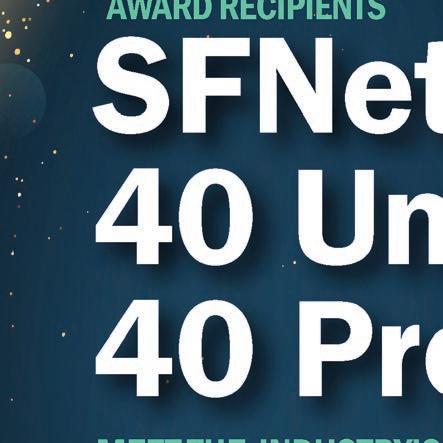



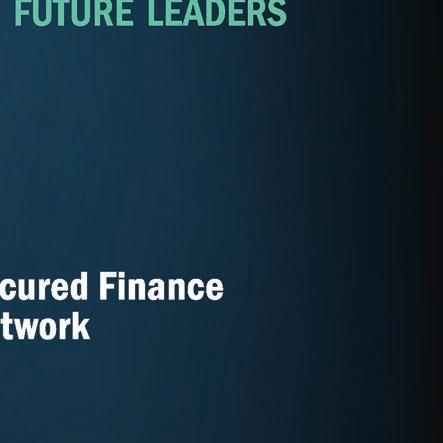



In 2016, SFNet launched the 40 Under 40 Awards as part of its mission to highlight the future leaders of our industry and honor their achievements. This mission has only grown more important during the last few years, amid the challenges of the pandemic and the need to attract and retain top talent with which just about everyone is grappling. The celebration in New York City is an event that brings together emerging leaders and titans of the industry like no other.
On the following pages, we spotlight the 40 recipients who are perfect examples of why the secured finance space is an “all-weather” industry. The 2023 40 Under 40 class will inspire you with their work ethic, creativity, moxie, and wisdom, which have enabled them to play significant roles in their organizations’ success.
SFNet 40 Under 40 Award recipients are not only impacting their individual organizations, but many are also highly engaged in SFNet, whether it be through their local chapter, contributing content to The Secured Lender , serving as panelists at events or volunteering on national committees. Many of the 40 also volunteer within their communities with organizations they are passionate about, such as youth coaching, mentoring at-risk kids, assisting the homeless, volunteering with animal rescue and religious organizations. I know the 40 Under 40 judges struggled to narrow the field to just 40 this year.
Speaking of the judges, the SFNet 40 Under 40 Awards wouldn’t be possible without the time and energy they put into this arduous, but rewarding, process. Thank you to 40 Under 40 Chair Candice Hubert of Chiron and judges Betty Hernandez of SLR Business Credit; David Kurzweil of Greenberg Traurig; Caitlin Sanders of Callodine Commercial Finance; Paula Currie of PNC Business Credit; Hamid Namazie of McGuireWoods; Mark Cucinello of JPMorgan Chase; and Jennifer Wallace of Wells Fargo Capital Finance.
On the following pages, not only can you get to know the members of the 2023 class, but you can also catch up with several members of past 40 Under 40 classes who are continuing to make their mark on the industry and sharing their sage advice on page 96. Past recipients have gone on to serve as members of the SFNet Management and Executive Committees, been promoted, or moved on to new opportunities that opened up to them. Candice Hubert, this year’s 40U40 chair, is also a past 40 Under 40 Awards recipient.
On page 94, read an interview that could have been called “40U40 Winner Makes Good.” Editor-in-chief Michele Ocejo
caught up with SFNet’s 2023 president, Jennifer Palmer (a member of the 40U40 inaugural class), who launched her own company earlier this year. Imposter syndrome can affect anyone at any stage in their career, not only the younger professionals on our teams. On page 110, How to Get Past “Imposter Syndrome” and Recognize Your Own Success , offers tips in overcoming it. Cyberattacks are becoming an epidemic affecting all businesses. Learn the steps you can take to protect your business as well as your clients on page 104, in Cybersecurity: What Lenders Need to Know by Brian Allen and Thomas DeMayo of PKF Clear Thinking.
RICHARD D. GUMBRECHT SFNet Chief Executive OfficerI look forward to celebrating with many of you on June 15 at The Plaza hotel. The 40 Under 40 Awards are an important way to express appreciation for our rising stars and celebrate our industry’s bright future.
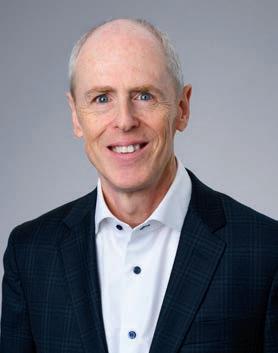
Michael Tebesceff is a director at BDO Consulting Group based in New York. He advises clients on operational and financial turnarounds with a specific focus on the healthcare industry. Michael also leads or co-leads several internal operating initiatives for BDO’s Business Restructuring & Turnaround Services team, including its summer internship program. For more than 12 years, Michael has advised businesses in distress. Presently, he serves as the interim operations director at a cancer treatment center in California and oversees several teams running the center’s operations, including call center, insurance intake, accounting, and financial planning and analysis. Michael’s deep experience has included advising key parties in the restructuring of multiple healthcare client engagements, such as advising senior lenders on the restructuring of a $300 million healthcare facility. Married and the father of two young children, Michael was recognized by BDO and Seramount as a Working Parent of the Year in 2022.
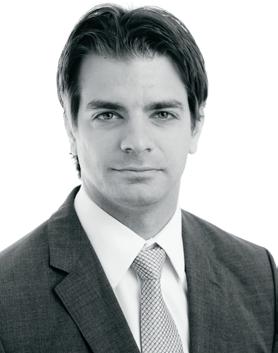
What is the best professional advice you have been given and how have you implemented it?
Earlier in my career, the best professional advice I received was to “show up every day and always try to make your leader’s job easier.” I took this advice to heart and try to instill this with everyone I work with at BDO. As I have progressed in my career, my focus has been to develop high-performing teams built on trust, psychological safety and common purpose.
I have been fortunate to work with very talented restructuring professionals and operators in an apprenticeship model, where I have had the opportunity to ask many questions, take on stretch assignments and grow on the job. I believe the greatest operators are constantly anticipating and course-correcting their business models to stay ahead of ever-changing environments and distressed situations. This ability to visualize the operational challenges and opportunities is one of the most important aspects of strategic planning and execution.
Another piece of advice that I have valued is to constantly focus on what we do, as restructuring can be a difficult business. It is critical to prioritize and stay focused on the most important things that will move the needle for the business. This requires setting realistic expectations for both results that are achievable and the time horizon to bring them to fruition. There are so many moving parts, and when you operate a business you have to orchestrate all of them. Usually, there are many areas of the business that are in distress, and it is important to pick wisely where to focus for better outcomes.
The best leaders are approachable, humble and flexible in their thinking. They are servant-leaders who put the needs of the team before their own. They effectively build and retain high-performing teams. The best leaders focus on the collective instead of the
individual. Further, great leaders are consistent and disciplined in their focus on continuous performance improvement.
Great leaders provide guidance, not direction, and allow their people to solve problems in unique ways. True leaders challenge you to grow in ways you never imagined, but they give you the support to make mistakes along the way so you can continue to evolve your thinking and approach to solving problems. That level of safety provides the opportunity for any business to innovate. Lastly, the best leaders also focus on their craft; they continue to develop their skills as they progress in their career, challenging themselves and their teams to achieve more.
I have been fortunate to have had great mentors throughout my career, and I am committed to continuing to mentor the next generation of leaders. Great mentors listen first and then provide honest, constructive feedback on both your superpowers and blind spots. While mentorship is often designated for a specific time period, I believe the best mentors are mentors for life. Use them to construct your personal board of directors and leverage them to help make career decisions, coach you through your toughest moments of growth and celebrate success.
I am a strategic operator at heart. I love getting deep into developing the long-term business strategy, and then seeing it come to life in the day-to-day operations that deliver exceptional financial performance. I am also deeply committed to paying it forward by developing and mentoring junior professionals. Long term, I would like to take a leadership role that balances both client work and business strategy as well as planning for the restructuring group at BDO.





Mike is a Director with BDO Consulting Group, LLC and is based in New York. Having spent more than 12 years helping businesses in distress, Mike advises clients on operational and financial turnarounds with a specific focus on the healthcare industry. He brings extensive knowledge and leadership skills to every project and exemplifies BDO’s core purpose of helping people thrive every day.
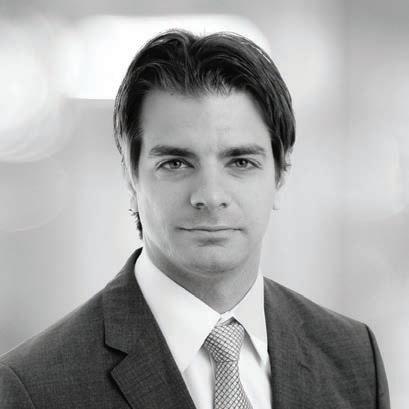 Tebesceff, Director
Tebesceff, Director
 Group,
Group,













Eileen Frino is a director at CR3 Partners, a national turnaround and restructuring firm. With over 15 years of experience in the consulting and financial services industries, Eileen advises clients on strategic and financial issues such as financial and operational restructuring, mergers and acquisitions, bankruptcy, out-of-court workouts, litigation, lender and M&A due diligence and performance improvement.
Eileen began her career at PNC as an underwriter within the New Jersey-based middle-market underwriting team. It was at PNC where Eileen received her formal underwriting and credit training. Just prior to joining CR3, Eileen spent time in Deutsche Bank’s M&A team, advising multinational clients on financial services transactions. In the intervening years, Eileen spent time at various consultancies, including Alvarez & Marsal and IBM, advising clients on a range of operational issues. Eileen’s educational background includes an MBA, concentration in finance, from London Business School and a B.S. in finance from Rutgers. In her spare time, Eileen is passionate about educating and developing the next generation of financial professionals.
EILEEN FRINO Director CR3 Partners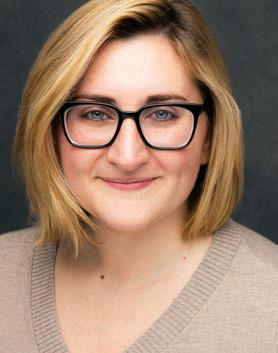
What is the best professional advice you have been given and how have you implemented it?
Get a sponsor.
We all know about mentor-mentee relationships. Indeed, most companies have formalized programs to match people across an endless number of dimensions – age, experience, goals, etc. Early in my career, I was fortunate to have one mentor explain the difference between a mentor and a sponsor. The key difference between the two being that much of what a sponsor does is advocacy-related work.
Sponsors tend to be individuals that are senior within an organization and/or industry – this is crucial since it provides them with a bird’s eye view of the organization, its strategy and goals, and how the talent pool fits within that structure.
As such, they tend to know what opportunities are available, how promotion and compensation decisions are made, and what a person needs to do in order to achieve their desired level of success.
Since receiving this advice, I have actively sought a sponsor within each organization. My criteria for choosing a sponsor comes down to two things: how do I get along with that person, and would I want to emulate their career. I have found that my development is positively correlated with successfully choosing a sponsor, and I would implore others to do the same.
The phrase “it takes a village” is often cited as a key to success in many settings. In my view, this is indisputable. However, you could have a city behind you, but if you can’t articulate where you are going and ask for help when needed, that city won’t be much help!
To that end, my view on self-advocating has evolved over the years and can be described as “respectfully relentless”. Said differently, I believe self-advocating is comprised of three key steps:
1. Know your goal(s)
2. Set tangible measures of success
3. Communicate your plan to your mentor(s) and sponsor(s), scheduling regular follow-ups to ensure progress and always ask for help when needed (as my mom say – “the answer is always no if you don’t ask”)
It should go without saying that self-advocacy is only as successful as your work-product is effective.
With many working remotely or hybrid the past few years, how can young professionals be sure to “stand out from the crowd” with upper management?
Even prior to remote working, I believed the way to stand out was to make life easier for your team. For me, the best way to do that is to have a keen awareness of your team’s priorities and a willingness to pitch in to accomplish the goals at hand.
I remember early in my career, the only task I was given in a meeting was to pay attention to body language. Another junior resource was brought in to take notes, so literally my only job was to watch the conscious and unconscious movements of our adversaries. When I asked my partner why this was a job, she very bluntly told me that listening is not limited to our ears.
I think part of what has made remote working so difficult is that we are limited in how we can listen. For example, we often only see half of a body at a time! Moreover, we are often being contacted over the myriad of communications platforms (Teams, Zoom, Slack to name a few) so multi-tasking has become our norm.
But I implore people to stop and take the time to listen. Often in conversations tone, body language and even pauses in dialogue can help you discern motivations and priorities. And to stand out in a crowd, identifying, understanding, and delivering on those is key.


















Nick McDearis is a managing director in the Ares Credit Group, where he focuses on the group’s commercial finance platform. Prior to re-joining Ares in 2021, Nick was a managing director at Monroe Capital, where he was co-head of the Atlanta office, focusing on cash flow and enterprise value investments into middlemarket companies. Prior to Monroe, Nick was a managing director at AloStar Capital, where he focused on asset-based and specialty finance investments. Prior to joining AloStar Capital, he was a principal in the Credit Group at Ares Management, where he held various roles between field exam, underwriting, portfolio management and originations for the commercial finance platform. Nick holds a B.B.A., cum laude, from the University of Georgia in finance and serves on the board of the Atlanta Turnaround Management Association. Outside of the office Nick enjoys spending time with his family and is passionate about all things outdoors. He resides in Marietta, GA with his wife of 11 years, Sammie, and their daughter, Blaire.
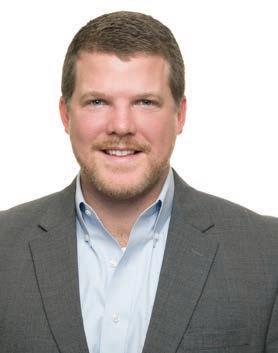
What is the best professional advice you have been given and how have you implemented it?
When I was a senior in college, interviewing for my first full-time job, the CEO took me aside and gave me the following advice which has stuck with me ever since.
He said, “Hey, look, you’re a great candidate and we’d love to have you on the team. Whatever you decide to do, I want to leave you with a few pieces of advice. #1 – Work at least 20% harder than your colleagues. Most people do the bare minimum, so you don’t have to work dramatically harder to differentiate yourself from the competition. #2 – Always continue learning. People who can only talk about their work are incredibly boring. Doesn’t matter what you’re interested in, but keep learning along the way. You’ll be smarter and much more interesting to have a conversation with than the person who can only talk about what they do for a living. Lastly, #3 – If you’re well liked, like who you’re working with, and generally like what you do, never take another job offer for less than a 30% pay increase. The goodwill you’ve built up and the unknowns of a new role are worth at least a 30% premium.”
I felt like it was good, real-life advice then and it’s served me well throughout my career, so I hope it’s helpful to those who are reading this.
What role has mentorship played in your career?
It’s been invaluable. My mentor, John Nooney, hired me out of college. I’ll never forget the first interview question he asked me – “So, what do you know about asset-based lending?” – to which I replied, “I looked it up last night and it seems like you lend less than what the asset is worth, so if you have to sell it, you get your money back…”. We’ve been friends ever since.
Mentorship has to be grounded in friendship. Unfortunately, I don’t think there’s a way to fabricate that. I believe there has to be a real connection, but when that happens, a real mentor will have your back, putting you into new, and sometimes uncomfortable, opportunities and supporting you along the way. They also care enough about you to call you out when you’re doing something incorrectly, which John has done many times. The trick is not making the same mistakes more than once.
What career trajectory would you like to be on?
I’ve been fortunate enough to work on some great teams, both within private credit and traditional banking. Eventually, I’d like to run a group or fund one day. I am trying to learn as much as I can along the way so that I’ll be well positioned for that opportunity when it arises.
What would you say to anyone considering a career in secured finance?
It’s truly a great field with tremendous opportunity, especially for young professionals coming in today as there’s a desperate need for talent as the baby-boomer generation retires. I would also encourage the young professionals entering our industry to start networking early. It’s such an essential part of career development. I was fortunate enough that my mentor encouraged networking at an early stage in my career, which led to business opportunities of course, but more importantly, some lifelong friendships that have been forged along the way.
When you contribute to the Secured Finance Foundation, you help fund important initiatives benefi tting secured lenders worldwide.

Professional Development through online and on-demand education and leadership programs

Industry Resources such as annual data studies, market sizing reports and the Compendium of Secured Finance Law


NextGen support via mentoring, guest lectures and our 40 Under 40 Awards

Support our Corporate Fundraising Campaign today.

Since joining Citizens Bank in 2018, Brendan has been a member of the Originations team responsible for sourcing and structuring ABL transactions for new customer relationships. The originations effort within Citizens ABL Group focuses on attracting lead relationships by providing thoughtful, holistic solutions in coordination with Citizens Capital Markets and Commercial Banking Coverage teams. Before joining Citizens, Brendan worked in portfolio management and underwriting at Wells Fargo Equipment Finance and Wells Fargo Retail Finance from 2014-2018. He began his ABL career at Gordon Brothers Group as an analyst in the C&I valuation & appraisal group.
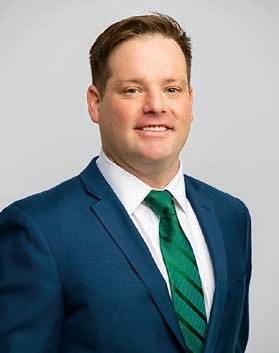
Prior to launching his career, Brendan graduated from Bentley University in Waltham, MA, with a bachelor’s degree in business management and a minor in finance. He played Division 1 hockey for Bentley and was a multiyear member of the Atlantic Hockey All-Academic Team. In addition to SFNet, Brendan is a member of Boston Corporate Finance Community NexGen Committee focused on leadership, collaboration and giving back to the community and volunteers his time during the winter months coaching hockey at Boston College High School.
Brendan and his wife, Liza, reside in Andover, MA and are the proud parents of three children, Avery (6), Maverick (4) and Olivia (3 months).
What is the best professional advice you have been given and how have you implemented it?
The best professional advice I was given early on in my career was to find a mentor to help guide you through. Whether it be formal or informal, establishing a relationship with someone you can trust inside the organization will be invaluable for your path to success. I have gained the most from bouncing my ideas and thoughts for my own personal growth opportunities with my own mentors for their input and suggestions to help me succeed.
How do you define a good leader?
The best leader always leads by example, in my opinion. A good leader earns the respect of their team by putting in the work and level of effort that they expect out of their teammates.
What advice would you give on how to self-advocate?
Don’t hesitate. No one is going to advocate for you if you don’t take the initiative. Always be true to yourself and have the difficult conversations if you need to. You might not always get the answer you want, but the conversations are always worth having.
What are your secrets to staying organized?
A tip I learned and established early on in my career was to never let an email go unanswered. I do not check my emails until I’m ready to respond, even if it’s with a simple acknowledgement. I am a big fan of calendar reminders to keep me on-track with deadlines.
What career trajectory would you like to be on?
I never want my career to go stagnant. I want to continue to grow and learn and add value whenever I can. I love providing guidance and helping the young professionals as much as possible and would love the opportunity to do more of that in the future.
With many working remotely or hybrid the past few years, how can young professionals be sure to “stand out from the crowd” with upper management?
The downside of working from home is not having enough face time. I think it’s easier for employees to get lost in the shuffle working from home and not being forced to sit in the office and have the opportunity to be included in meetings with upper management. My advice to young professionals would be to always work your hardest no matter what task or client it is. Do not let people forget about you just because you are working from home. Always check in with your boss even when they are not looking for you. Finish tasks as soon as you can and provide your boss with constant reminders that you are available and willing to do more is invaluable in the remote work environment.
What would you say to anyone considering a career in secured finance?
I would recommend to anyone considering a career in secured finance that they pursue it. I think that opportunities to learn on the job are endless and ever-changing. No two clients are the same, so you are constantly being challenged.
Citizens celebrates Brendan Harrison for demonstrating superior dedication and leadership as an Originator for the Asset Based Lending team, as well as his commitment to his community outside of Citizens. Congratulations to Brendan and all of the inspiring leaders recognized.
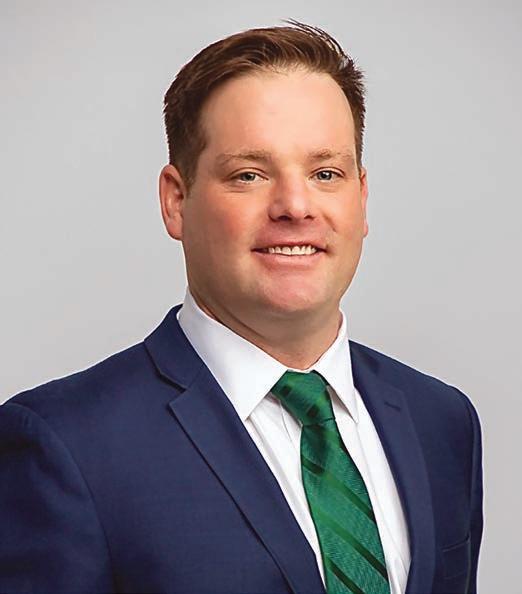
David Phillips is focused on business development & origination for Far West Capital/Advantage Business Capital. In 2016, David joined Far West Capital and entered the asset-based lending industry. In June 2018, Far West Capital was acquired by Advantage Business Capital. Shortly thereafter, David was promoted to SVP and was asked to lead and oversee all aspects of digital marketing for both firms.
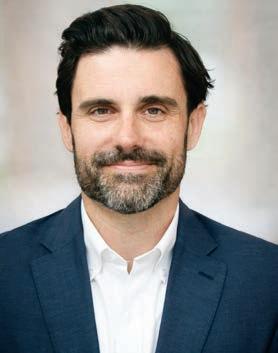
An active leader and mentor in his community, David is a board member and events chairman for the Turnaround Management Association (TMA) Central Texas. For the past seven years, David has been a mentor for the same group of at-risk youth through a local nonprofit called Explore Austin. Most importantly, David considers himself blessed and lucky to have met his wife, Kate. Together, they have three healthy, beautiful, and unique young children.
DAVID PHILLIPS Senior Vice President Far West Capital/ Advantage Business CapitalWhat advice would you give on how to self-advocate?
It has been my experience that senior colleagues across firms want to support hard-working and integrous younger people who take their work seriously. In terms of advocating for your professional development inside your organization: First, work to embody the Zen concept of a beginner’s mind, a.k.a. the sincere belief that you have something to learn from everyone. Second and equally important, always be prepared with an evidenced-based perspective on credit decisions large or small. Next, learn when and when not to contribute your point of view based primarily on if it helps your team make a better decision. As you do this over a long period of time, you are no longer “just” doing business development but instead working alongside operations and underwriting to help your team make smarter decisions. These habits will result in you evolving from a young professional to an emerging executive.
What role has mentorship played in your career?
Mentorship has been huge for me. However, I don’t believe the most effective way to receive mentorship is by asking for regular scheduled time from one or two specific people. I believe a much more accessible and wiser path is to pursue a sincere professional friendship and relationship with a wide variety of experienced industry men and women. With this in place and when you need guidance, you can call on the one or two mentor(s) most equipped to help you. I’ve found this philosophy to result in my having a wider network of professional support that doesn’t overburden or drain any single relationship.
What are your secrets to staying organized?
Regardless of industry or title, I believe every successful executive must be an exceptional salesperson and project manager. Regarding project management, I make a concerted effort with clients and colleagues to communicate with as much brevity, clarity, and responsiveness as possible. In order to communicate in a clear and timely manner, your mind as well as your workflow must be well organized. Lastly, an overlooked aspect of productivity is swiftly saying “No” to transactions or deals that aren’t great fits. Doing this will free up physical and mental resources for opportunities that are good fits.
What career trajectory would you like to be on?
I aspire to be one of the senior leaders of a multi-decade successful asset-based lending organization. I’ve always loved sports and team sports. Success in business and sports requires a highly functioning group of individuals with complementary roles and skills working together as a team. The work we do is simple, but not easy: 1) find and retain high-quality clients and 2) preserve capital and provide a risk-appropriate return to shareholders. This sounds like a challenging and exciting career to me. Currently, and in a junior capacity, I’m lucky to be working alongside an exceptional group of men and women where we’re doing this.

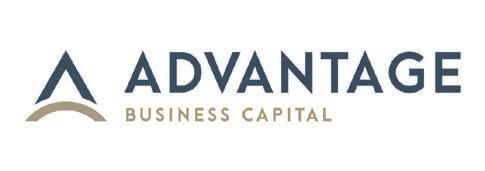
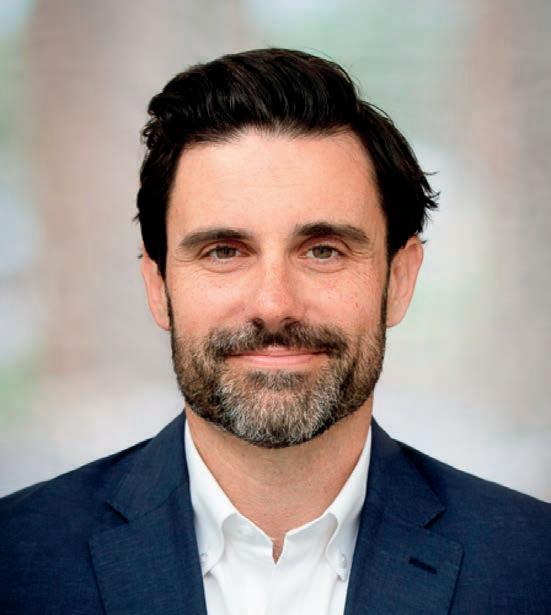
Congratulations David Phillips on being recognized by the SFNet Organization as one of their 40 under 40 Award Recipients. We are very proud of your outstanding achievements!

Alexander McKeown is a senior vice president, Hilco Consumer – Retail with Hilco Merchant Resources. He joined the company in 2017 with a focus on business development across its global retail platform. Since that time, Alex has originated and helped to structure numerous transactions, facilitating the restructuring and/or recovery of billions of dollars in asset value. In addition to his business development and deal making efforts, he has played an integral role supporting the company’s strategic growth initiatives. This has included the launch and development of ReStore Capital, a Commercial Finance Company focusing on Retail and Consumer Product Goods (CPG) companies; the growth and development of CareerFlex, a cloud-based outplacement and job search tool focused on retail employees affected by Reductions in Force (RIF); and HMR’s other core subsidiaries. Alex has held leadership positions with the Turnaround Management Association’s (TMA) and Secured Finance Network’s (SFNet) Chicago Chapters and is a member of the Association for Corporate Growth (ACG). Alex holds a BA in political psychology from Bates College in Lewiston, Maine.
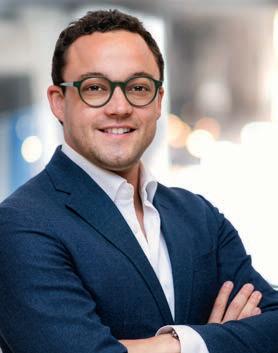
Best professional advice you’ve been given and how have you implemented it?
The best professional advice I’ve been given is also some of the best life advice I’ve been given, and it can be summed up in three words: “Do it now”. My father gave me this advice when I was one of the best procrastinators around in middle school. I’ll admit, it took me more than a few years to fully buy into the concept, but once I did, I found myself to be more productive and happier. I’ve since modified the advice a little bit and apply the saying differently in my professional and personal life. In my professional life, I try to tackle any tasks that are going to take me 15 minutes or less under the “Do it Now” mentality. I don’t have a specific time of the day that I allocate for this; sometimes it is in the morning, sometimes the evening, sometimes as they come. In my personal life, I had to expand my timing to be a bit broader – it’s tough to go to the gym or do that thing in your apartment in 15 minutes or less. It may not be a motto for everybody, but it works for me.
How do you define a good leader?
Being a good leader is such a tough thing to wrap your hands around – and I’m not proclaiming to be one. But I’ve been lucky in my career and each boss I’ve had has made me a better and more motivated worker. They’ve also become friends. There are a few qualities I’ve identified that make a good leader:
Expectations: Most of us know how important it is to set expectations, whether that be with your partner, family, co-workers, or direct reports. In a professional context, a greater leader is somebody that can articulate a vision for the art of the possible, what it will take to get there, and what the outcome is going to look like.
Autonomy: Once teams are bought into the “destination”, a great leader provides their team with autonomy to figure out the best way to get there. A simple example could be a PowerPoint presentation. A great leader will outline who the audience is, what the goal of the presentation should be, and any other important attributes. But, once the leader has outlined these parameters, they’ll leave it to their team / report to figure out how to get that done and will also be there as support or a sounding board to help provide guidance should it be needed. This not only frees the leader to focus on other tasks, but helps build an experienced and autonomous team.
Patience: Of course, no employee is perfect, and mistakes will be made. While it is important to have high standards and to hold your teams to them, it is also important to understand that learning and execution is a process. Helping your teams learn from mistakes in a constructive way builds trust and loyalty.
Interest: Last but not least, a great leader must have interest in their co-workers, teams, and employees. Work is a means to an end, but at the end of the day we are all people. It is absolutely critical that a great leader genuinely cares about the people they spend their time with day in and day out. This goes beyond perfunctory pleasantries. A great leader cares about who you are, your interests, your family, and your life. A great leader knows that there is more to you than just what you do while you’re in the office.

Christian Hernandez is a business development officer for J D Factors Corporation in Canada. After starting his career at J D Factors in operations, Christian moved into his current role in business development in 2016. Through hard work, determination and a strong competitive sprit Christian was awarded business development officer of the year in 2022 at J D factors.

Christian has completed his Business Administration diploma, with a specialization in logistics from Humber College in Toronto, Ontario. He has also taken post secondary accounting courses, as well completed certificate courses in collections and underwriting. Christian likes to donate his time to several community and business organizations including Food4Kids, The Salvation Army and several local chambers of commerce. In his free time Christian enjoys golf, lawn bowling and playing poker. Being accessible to his clients while maintaining time with his family is paramount to his success. He has been happily married for five years and is a father to two young children, Leo and Ivy.
What is the best professional advice you have been given and how have you implemented it?
The best advice I ever received was from a seasoned coworker, “Give good news quick, and bad news quicker!” Quoting my first ever deal, I messed up on rates. Rather than delaying the bad news to the prospect, I told him about the error right away, and worked to solve the issue. That client agreed to move forward and is still one of my largest clients to this day. A few years later, the client echoed that had I not addressed the issue right away, he would have gone in another direction. I cannot stress enough that communication is the key to successful business development. Dealing with issues head on right away provides both you and the client an opportunity to save our most precious commodity, TIME. We can never get time back, so don’t waste it.
How do you define a good leader?
To me a good leader provides you with the tools you need to do the job and gets out of your way so you can do it. Good leaders are there to support you and offer guidance when you need it.
What role has mentorship played in your career?
In one word, invaluable. I have been blessed with strong mentors who have been able to show me the path of success and some of the pitfalls of taking shortcuts. Being able to lean on their own real-world experiences has been pivotal in my successes. The ability to bounce ideas off each other and have another set of eyes gives you a real 365-degree approach to a problem and allows for better solutions.
How would you encourage young professionals to become more involved in their community or volunteer? How have these activities outside of work helped shape your professional life?
Some of the best personal fulfillment I have gotten has been from volunteering. Be it coaching kids or helping fill care packages for those in need. Taking a step back and looking at the world through someone else’s eyes gives some great perspective that helping someone is not that hard but makes a world of difference. You can really help someone just by lending an ear and listening. This skill directly translates to my professional career as listening and understanding the client’s needs is the most important thing when it comes to business development. Being able to understand the clients’ needs will allow you to offer up solutions that can help solve their current pain points.
What would you say to anyone considering a career in secured finance?
If in your career you are looking for challenges daily, then look no further than secured finance. The beauty of working in this industry is that no two days are the same. You get to learn about all sorts of industries; industries you may never have thought about and very niche products that have a bigger impact on the world than you may first have thought. You will meet all different types of people on a daily basis, from the super passionate inventor to the very specific CFO or controller. You need to be able to adapt and listen. Most importantly you need to be a problem solver. That is the single best reason to choose secured finance. You get to solve real world problems. Problems that can’t be solved by traditional lending methods. Instead, you are tasked with finding an outside-the-box solution that solves the client’s pain point.
Since 1989
• Cash for Invoices in 24 Hours
• No Application fees or hidden fees
• Customized low rates
• Free credit checks on your customers
• Non recourse Program (Credit Guarantee)
• Free Invoice Processing
• Dedicated Account Executives

• Real Time Online Access
• Fuel Card Services Available
• Improve Cash Flow and Reduce Credit Risk
• Reduce employee workload by outsourcing credit checking, invoice processing and collection duties
• Utilize credit strength of their customers to help create a strong credit standing on their own
• Receive invoice payments by direct deposit when money is most needed
• Have ready and available cash to pay suppliers and efficiently grow the business
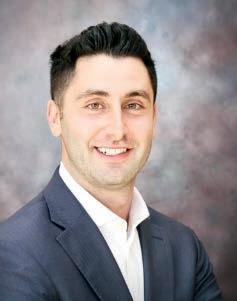
How do you define a good leader?
Anthony Carpentieri is an executive director in the ABL Credit Markets team at J.P. Morgan Commercial Banking, focusing on the origination and execution of asset-based middlemarket transactions. Anthony currently covers the NYC and Long Island markets and specialties within textile and apparel, beverage, and tech and disruptive commerce groups. Based in New York City, Anthony joined J.P. Morgan in 2012 as a credit analyst within ABL. He served on the credit team for three years before transitioning to the originations team as one of two associates across the country in a newly formed associate program. Anthony is a 2012 graduate of the Alfred Lerner College of Business & Economics at University of Delaware. His outside activities include mentoring JPM interns and he is a member of Street Wise Partners, a non-profit that supports employment opportunities for adults from under-resourced communities. Anthony has several mentees under the program who are involved in successful job searches in the corporate sector. Anthony and his wife live in Westchester County, New York.
I am lucky enough to work for a great leader within our ABL group, which makes it easier to define the attributes. I define a good leader as someone who leads by example, works well with others and is willing to give credit to those around them. A good leader effectively gives and receives feedback, and they communicate honestly and openly with their team. They listen to the ideas and thoughts of their colleagues, and most importantly, a good leader is an individual with integrity who can be trusted.
What advice would you give on how to self-advocate?
The best way to self-advocate is to work as hard as possible. I firmly believe that if you are good at what you do, you will get recognized for it. By taking on additional responsibilities or special projects, you will not only grow as an individual but also show those around you your capabilities. Additionally, it is important to recognize when you don’t know something, and to seek out the appropriate resources and guidance. Self-advocacy means advocating for yourself, and this includes asking for help when needed.
What is the best professional advice you have been given and how have you implemented it?
I have received many great pieces of advice in my career but here are the two I try to follow every day. The first is to make integrity and honesty a priority in everything you do. Having the trust of those around you is crucial to a successful career. The second piece of advice is to always be open and welcoming to honest and constructive feedback. Feedback is essential for personal and professional growth, and it helps you become a better
colleague and leader. I am consistently seeking to improve and do better, and in order to do this, I rely on the feedback of my team and colleagues.
With many working remotely or hybrid the past few years, how can young professionals be sure to “stand out from the crowd” with upper management?
It is crucial for young professionals to network with their colleagues and try to go out of their comfort zone. In a post-COVID world, it is important for people to communicate effectively, particularly with their managers. Whether in person or remote, personal connection is key. Young professionals will naturally “stand out from the crowd” by communicating directly and staying on-task and focused, regardless of their work location.
I would highly encourage anyone junior to make this a career path. During my 11-year career in ABL I have worked with a variety of businesses across an array of industries. I have worked with both large sponsors and 3rd generation owned middlemarket businesses that run their companies differently. Having discussions on the CEO/CFO level allows you to really build relationships and to see first-hand the impact JPM is having to help grow these businesses. I can honestly say I wake up everyday with a strong passion and desire to help my clients and believe that secured finance would be a great entry point into the banking industry. Secured lending incorporates cash flow and collateral expertise so it provides a more holistic view of credit and develops a broader skill set.


Dan Wells is a managing director at Regions Business Capital, responsible for leading all supply chain financing originations across the bank for direct and syndicated transactions. Working closely with corporate, commercial and specialized bankers, Dan has helped more than double the size of the total supply chain program since assuming this role in 2019. Throughout his 12-year tenure with Regions, he has held a number of key positions in originations, relationship management and underwriting. Dan is a two-time recipient of the Regions Chairman’s Club Award, recognized as one of the top 10% of company performers in 2018 and 2022.
DAN WELLS Managing Director Regions Business Capital
How do you define a good leader?
Prior to Regions, Dan worked in originations and underwriting with Truist Bank (formerly SunTrust Robinson Humphrey). He graduated from Auburn University, where he majored in finance. Based in New York City with his wife and two daughters, Dan is a recipient of the President’s Volunteer Service Award with New York Cares, a network offering volunteer opportunities with nonprofits and schools across NYC’s five boroughs.
A leader is someone who has the respect of their peers and is looked upon for their abilities to guide and counsel others. The best leaders don’t necessarily have all the answers, but they are able to communicate across levels and teams while bringing everyone together to find solutions or get a deal across the finish line. A leader will have the vision to set and achieve collective goals through self-discipline and by understanding the team’s strengths and weaknesses to bring out the best in each individual.
What are your secrets to staying organized?
Making lists—be it professionally or personally, big or small— making lists and prioritizing what to tackle first gives me clearer focus for the day/week/month ahead. Plus, crossing an item off the list promotes a sense of accomplishment and motivation to move on to the next challenge, project or task.
With many working remotely or hybrid the past few years, how can young professionals be sure to “stand out from the crowd” with upper management?
It is all about relationships that we build throughout our careers and this starts early on. The people we meet and the deals we work on as young professionals mold us into who we become later in life. Connecting as often as possible with more senior team members, implementing constructive feedback and being open to their teachings will benefit you in the long run. As you continue to build relationships, those connections will start to flow throughout the organization/industry and your name will start to come up more and more in conversations with senior
management. It is not going to happen overnight but if we don’t make the effort to seek out those conversations, we are holding ourselves back from growing.
How would you encourage young professionals to become more involved in their community or volunteer? How have these activities outside of work helped shape your professional life?
Focus on an issue or area that has a meaningful and personal connection to you and join a volunteer organization that has various projects to choose from so that you can mix and match different interests. Providing time and service to others who need our help creates a sense of belonging in the community that has a ripple effect on colleagues, friends and family members.
Devoting my time to volunteer activities, outside of work, and traveling to new places have given me a different perspective on how to communicate and see the world through a different lens. This comes full circle in the workplace with colleagues. There may be different views on a deal, different writing styles or different strategies to handle a process. In the end, it is about taking everyone’s view into account to find common ground so that the deal can get closed or the project can be finalized.

Mitch Rubin is a senior vice president of business development at U.S. Bank. Based in New York City, he is responsible for sourcing, originating, and structuring asset-based opportunities for middle-market companies and private-equity sponsors in the Northeast territory.
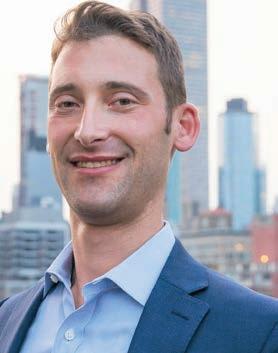
In November 2021, Mitch joined the U.S. Bank team after spending the previous 14 years at PNC Business Credit and Wells Fargo Capital Finance. He began his career as a collateral analyst and moved through the ranks to a senior relationship manager role and, ultimately, a business development officer role.
Mitch earned his degree in business administration, with a finance concentration from the State University of New York – Binghamton. Currently residing with his wife and two-year-old son in Westchester, New York, Mitch is an avid live music and sports fan, and loves to cook and travel.
MITCH RUBIN Senior Vice President, ABL Originations U.S. BankWhat is the best professional advice you have been given and how have you implemented it?
Work hard, play hard, have integrity and humility, communicate with others, and get to know fellow colleagues. Developing personal relationships is always advantageous. It’s important to be a resource for others and find ways to help, even if it doesn’t necessarily benefit you. Find time to mentor younger professionals, refer opportunities, be authentic and honest. Lastly, always be prepared and confident in your abilities.
What advice would you give on how to self-advocate?
An interesting question. Self-advocation is important, but simply telling managers you want to be promoted isn’t enough. Push for greater opportunities, speak-up when given the chance and don’t be afraid to ask questions. Building confidence in yourself to grow, learn, and communicate is a powerful thing. Make best efforts to have constructive and honest communications with managers for growth areas. It sounds simple but knowing what you want is easier than knowing how to get it, so don’t be afraid to ask for advice.
What are your secrets to staying organized?
Nothing out of the ordinary; I use a combination of spreadsheets, to-do lists, and my calendar. Being organized is one of the most important aspects of my job and one of my greatest strengths, whether managing prospective accounts, recalling something about a potential lead or remembering if it’s my turn to drop off/ pick up at nursery school. As we’ve shifted to more of a WFH model, it’s taken on even more importance to be on time for calls and confirm in-person meetings.
With many working remotely or hybrid the past few years, how can young professionals be sure to “stand out from the crowd” with upper management?
Have a positive attitude, be proactive and get involved, don’t be afraid to fail! If a managing director sends an open invitation for a lunch or team-building meeting, make your best effort to attend. Ask managers for additional assignments, and when you get your shot, show everyone what you can do with confidence and enthusiasm. Ask if your company has a rotational program to maximize exposure. Befriend a senior colleague you feel comfortable asking questions. Trust me, they learn from your questions and will appreciate the technology advice they are bound to ask you for. Be sure to join and attend young professional networking events, as these are a great way to meet people and ask for advice from your peers.
Asset-based lending isn’t a “flashy or sexy” lending product, but it’s well known and delivers a birds-eye view into a variety of industries and products. Seeing firsthand the job growth and creation it ultimately provides is rewarding. Additionally, one gets exposure to high-level management that other industries likely don’t provide. At my first job out of college, I was excited to sit in a conference room asking the CEO and CFO questions while being on a routine field exam.
The secured finance industry provides excellent growth and advancement opportunities and as an added benefit is made up of a fantastic group of people! Unfortunately, I don’t have the space on this page to elaborate or thank each one personally, but I am grateful for their support and guidance for helping me get to where I am today.


Vlad Paskas joined Siena in 2017 as a collateral analyst. In 2020, he became a field examiner and shortly after, in 2022, was promoted to assistant vice president of audit management. In his role, he performs field examinations for the firm’s prospective and existing borrowers in the United States, with borrowing needs from $7 to $100 million. He also teaches collateral analysts and field examiners the importance of audit and risk management practices to prevent fraud. Prior to joining Siena, he graduated with a bachelor’s degree in International Business from University of Bridgeport in 2015. In 2016, Paskas also earned his MBA degree in analytics intelligence at the same school. He was the captain of the men’s and women’s swim team where he won three silver medals at the NCAA Division 2 Championships (in 2012, 2013, and 2014), and 1 bronze medal in 2015 in various freestyle events. He resides in Miami, Florida with his wife, Katya.
What are your secrets to staying organized?
I can’t live without having a schedule and that is the number one thing that keeps me organized. It is very important for me to know what I need to do and when do I need to do it. I always try to prioritize my tasks and tackle them in that order. I do my most challenging work when my energy is at its highest and I save lessdemanding work for other time. I have been doing this ever since elementary school.
Staying organized can be challenging, but I think it is essential for good productivity and reducing stress. Taking regular breaks can help prevent burnout and improve focus. Going for a short walk can help you with this.
Also, learn to say no. Saying no to things that don’t align with your priorities or goals can help you stay focused on what’s important.
Lastly, keep a clean and tidy space. A clean and organized workspace can help reduce distraction and increase productivity. Take a few minutes each day to tidy up your workspace. Get rid of outdated and duplicated items, information, and emails.
To me, a good leader is someone who inspires and motivates their team to work towards the same goal. A good leader should be empathetic and have a clear vision of where they want to take their team and organization. They need to delegate tasks effectively, provide constructive feedback, and offer support and guidance to their team members. I think providing constructive criticism (both good and bad) is the most important thing, because that’s how you tell your teammates what they need to work on to improve their performance and get better at things.
A good leader leads by example and sets high standards for themselves and their team. They need to be honest, transparent, and accountable for their actions. It is important for good leaders to admit when they are wrong and lay out an action plan on how to fix their own mistakes. I think people can be very appreciative of that which can create a positive and inclusive work environment.
Finally, a good leader is someone who values their team members’ well-being and growth. They invest in their team’s development and provide opportunities for learning.
What would you say to anyone considering a career in secured finance?
If you are considering a career in secured finance, it can be a challenging yet rewarding field to work in. Secured finance involves assessing and managing risk in lending, as well as analyzing financial data to make informed decisions.
In order to excel in our field, you will need a strong understanding of finance and accounting principles, as well as excellent analytical and problem-solving skills. Also, you must be able to communicate effectively with the clients (both current and prospective) as well as your co-workers.
Additionally, you have to be detail-oriented, organized, and able to manage multiple tasks and deadlines. A passion for continuous learning and staying up to date with industry trends is also crucial for success.
But the thing I like the most about secured finance is that you can learn a lot! Clients and companies come from a different industries, so you always learn new things and you never get bored.




Siena Lending Group is proud to announce that Vlad Paskas, Assistant Vice President of Audit Management, has been named a winner in SFNet’s 40 Under 40 Awards 2023. This prestigious honor reflects Vlad’s significant professional achievements, contributions to his community and dedication to the secured finance industry.








“On behalf of our entire firm, I want to congratulate Vlad and all the other recipients of this year’s 40 Under 40 Awards,” said Dave Grende, CEO of Siena Lending. “Vlad has been a valuable member of the Siena team since 2017, and I know he will accomplish even more in the years ahead.”
Mirlande is a partner in the firm’s Finance, Restructuring and Bankruptcy practice and is based in New York. She has over a decade of experience representing clients in a wide range of complex financing transactions, including cash flow and asset-based facilities, syndicated, club and bilateral credit facilities, revolving and term credit facilities, acquisition financings, leveraged financings, including leveraged buyouts, as well as investment grade financings. Mirlande concentrates her practice on representing national and regional banks, private credit funds, other financial institutions, corporate borrowers and private equity firms in a diverse array of middle-market and large cap transactions. Her practice spans a variety of industries, including healthcare, manufacturing, technology, life sciences, retail and other service sectors. Mirlande has long had a passion for finance. Prior to beginning her legal career in New York, she majored in economics at Emory University and excelled in contract drafting and interpretation at Howard University School of Law, where she was a Merit Scholar and a member of the Howard Law Journal.

How do you define a good leader?
A good leader is a person who is highly adaptable and receptive to innovative ideas. Secured financing requires that a leader understands how to quickly pivot based on the circumstances and particulars of a transaction, business, or industry, as well as a client’s specific goals. Good leaders must understand their limitations and cultivate an environment of respect, effective and open communication, positivity, and gratitude. Such an environment creates a culture where members of the team feel valued, included, and are encouraged to participate and share their innovative ideas for the overall success of the organization and its clients. Moreover, good leaders foster collaborative environments and rely on the experience and abilities of their team members. No one person will be an expert on everything, and good leaders understand that they are unable to effectively lead or become successful unless work is appropriately delegated to those with the right knowledge and skills. Good leaders who are zealous about their work will inspire others to be similarly enthusiastic and strive to provide their best work product. Finally, leaders should lead by example and exhibit the characteristics that they value or want to see in their colleagues and subordinates. At Blank Rome LLP, we understand great leadership and build diverse teams across different practice areas with attorneys having the proper expertise and experience to complete our client’s transactions successfully and efficiently. We are business-minded attorneys who are enthusiastic about secured financing and have a keen understanding of the ever-changing world of finance and industries in which our clients operate. Due to our firm’s culture and great leadership, we can use the abilities of our team to find innovative solutions to issues in complex transactions, while providing nimble and customized services based on an understanding of our clients’ businesses.
What is the best professional advice you have been given and how have you implemented it?
The best professional advice that I have received is to be receptive to learning from everyone. Humility is the key. Throughout my career, I have gained a wealth of knowledge and insight from various colleagues, clients, acquaintances, and friends. I welcome advice from others at every stage of the organizational structure. Being receptive to learning means also being receptive to correction and constructive criticism. My eagerness to learn from all and my openness to correction has allowed me to provide excellent client service. My team members appreciate that they can contribute to the transaction and are willing to speak-up to prevent errors and to provide novel ideas. Several years ago, a valued paralegal sent me an article about a new case law in Wisconsin, which led to even more vigilant review of UCC filings. I enjoy learning and strive to continually acquire substantive subject matter knowledge as well as knowledge about best practices, the market, and various industries. Our profession and this industry are in constant state of change, and I embrace the wisdom from various sources to stay abreast of these changes.
With many working remotely or hybrid the past few years, how can young professionals be sure to “stand out from the crowd” with upper management?
Whether you work remotely or in an office different from your management team, you should take every opportunity to attend events and meetings with upper management. When appropriate, at these events and meetings, speak up and share your abilities, thoughts and ideas. In addition, foster strong relationships with others in your organization who have a direct line of communication, and can speak highly about you, with upper management.
Blank Rome LP proudly congratulates Mirlande Telfort on her selection to the Secured Finance Network’s 40 Under 40. We applaud her commitment to the highest standards of achievement and are honored to call her our colleague.
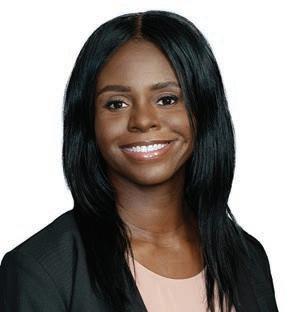 Mirlande Telfort, Partner | Finance | mirlande.telfort@blankrome.com
Mirlande Telfort, Partner | Finance | mirlande.telfort@blankrome.com
Blank Rome is an Am Law 100 firm with 14 offices and more than 650 attorneys and principals who provide comprehensive legal and advocacy services to clients operating in the United States and around the world. Our professionals have built a reputation for their leading knowledge and experience across a spectrum of industries and are recognized for their commitment to pro bono work in their communities. Since our inception in 1946, Blank Rome’s culture has been dedicated to providing top-level service to all of our clients and has been rooted in the strength of our diversity and inclusion initiatives.

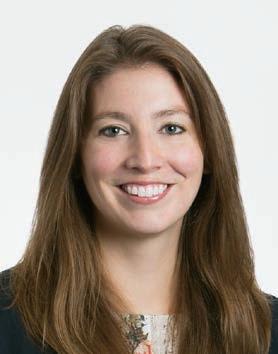
What role has mentorship played in your career?
Sarah Kessler is a partner in Chapman and Cutler LLP’s Banking and Financial Services Department and member of the Commercial Lending Group. She focuses her practice on private equity-related finance, representing lenders and borrowers in both fund finance and acquisition finance. Sarah has significant experience in financings to borrowers that are themselves financial players, such as REITs and broker-dealers. She also works collaboratively with the Chapman Practice Innovations team and her clients to identify pain points in their day-to-day or transaction processes and develop process improvement workflows and techenabled solutions. Outside of Chapman, Sarah volunteers to assist refugee families who settle in the Chicagoland area through her church and the nonprofit organization Refuge One. Sarah received her law degree, magna cum laude, from Indiana University, Maurer School of Law, and her undergraduate degree from the University of California, Berkeley. Sarah resides in Chicago with her husband and two children.
The practice of law is an apprentice-based model and having mentors is an important factor in career happiness and success. I remember as a junior attorney looking at the firm partnership and assuming that everything had gone “just right” for them to get there. Now, years later, I understand that mentorship has played a critical role. Good mentorship creates a safe space that permits vulnerability and sharing. Some level of hardship and conflict are a natural part of any career path, and my mentors have helped me learn positive and proactive ways to push through and resolve difficulties. My mentors have also helped guide me in balancing my commitment to my firm and clients with my personal life. When I pursued IVF for my kids or became a caregiver to my mom during her cancer treatments, I felt vulnerable in asking for accommodation or seeking advice on what to prioritize over a certain time period. Without my mentors, who helped normalize my experience by sharing their own stories and providing positivity and encouragement, I would not be where I am today.
What advice would you give on how to self-advocate?
Self-advocacy comes up in a variety of different situations—growth opportunities, compensation, workload and responsibilities, pace of advancement, or dynamics with a colleague. Self-reflection is the start to good self-advocacy. You need to really understand your “ask” and whether that “ask” is reasonable and will promote or resolve an issue. My life experiences and family forming journey were challenging, but advocating for what I needed at the time led to a positive and trustbuilding experience with my supervisors and colleagues. You will never know until you ask. The key is to be positive in your approach and open to different responses than you anticipated.
With many working remotely or hybrid the past few years, how can young professionals be sure to “stand out from the crowd” with upper management?
Excellent work product will always stand out. Taking ownership of assignments that are immediately at hand and being as thoughtful with those assignments as possible is a significant differentiator. Building a career means you are incrementally building your reputation through the day-to-day work. Substantively correct (to the best of your ability as you’re learning), polished and timely work product is entirely in your control. In my experience when a young professional demonstrates this type of dedication, and the “reach” assignments or special opportunities naturally follow in due course.
What would you say to anyone considering a career in secured finance?
Secured finance is an industry niche that provides a range of opportunities for growth and supports a wide variety of interests. Many businesses in different industries have secured debt to support their working capital or growth needs, and a career in secured finance is an opportunity to learn about the financing backbone of those industries. Supply chain issues are particularly relevant today, and there is an entire area of secured finance related to that movement of goods. There are so many different types of career paths available to develop and expand your strengths, whether they be in analytics, risk, managing teams, or law.
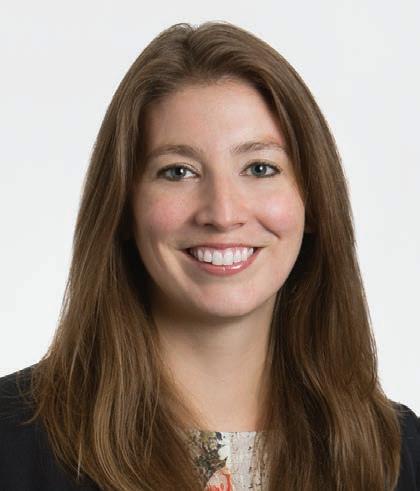













We are proud of Sarah’s dedication, leadership, and contributions to the secured finance industry and her initiatives to advance mentoring and exceptional client service.
“Focused on finance” is more than a catchy slogan at Chapman; it underscores everything we do. With a 110-year history supporting us, Chapman represents nearly every type of lender and investor—including private equity firms, investment funds and specialty lenders— in a broad range of transactions from the straightforward to the highly complex.















Alison Bure is a partner in the finance and restructuring group of Faegre Drinker Biddle & Reath LLP. Alison serves as a trusted advisor to leading national banks, corporations and financial institutions in their complex debt financings and other commercial finance transactions. She represents her clients in syndicated and bilateral loan transactions, including senior secured credit facilities, mezzanine debt financings and private equity deals, with additional expertise in securitizations, corporate trust and restructuring transactions. The businesses funded by her deals include multinational corporations, Native American tribal enterprises, large agribusiness providers, public utilities and traditional manufacturing companies. Alison balances her professional work with her community stewardship. She volunteers with the Minnesota Chapter of the Cystic Fibrosis Foundation, and for the last several years, she has been a member of the organization’s board of directors. She also dedicates a significant portion of her legal practice to pro bono service.
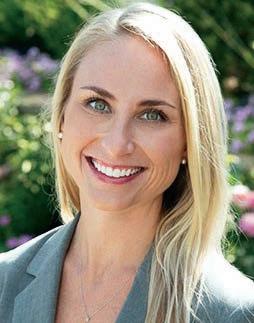
Alison earned her J.D. from the University of Minnesota Law School and her B.B.A. from the University of Wisconsin. She resides in Minneapolis with her husband and son.
What is the best professional advice you have been given and how have you implemented it?
I received two pieces of advice that resonated with me at particular stages in my career, the first as a new lawyer and the second as a senior associate, and they both continue to serve an important purpose.
Early in my career, I was told to just say “yes,” and for many years, that is exactly what I did. Saying yes to every opportunity opened many doors and pushed me outside my comfort zone. It allowed me to gain a broad range of experience, expand my knowledge, and build new relationships. It led to leadership roles and even brought me to Tanzania for pro bono work.
As I became more senior and established in my role, I received seemingly opposite advice – don’t be afraid to say “no.” I didn’t stop saying yes, but I started to factor in my goals and priorities when deciding whether to pursue an opportunity. Learning to say no helped me set boundaries, focus on the work that I enjoyed, and devote time to the things that were important to me.
In implementing both pieces of advice, I learned there is no dichotomy between them. Today, I continue to raise my hand and take advantage of as many opportunities as I can, but I recognize that my time is valuable, and I use it wisely.
How do you define a good leader?
A good leader inspires and empowers others, is resilient, and embraces change. Good leadership means leading by example. A good leader must also have compassion and be dedicated not only to the mission but also to the team.
What role has mentorship played in your career?
Mentorship has played a vital role in my career at all stages. I have
been very fortunate to have wonderful teachers, advisors, and friends that have served as invaluable mentors. As a law student, a professor and a clinic director went above and beyond their traditional roles as I was taking the critical first step into the practice of law. From the first day at my firm, the senior members of my team have shared their knowledge, helped me overcome challenges, and served as my advocates and cheerleaders. I am deeply grateful for all my mentors. I strive to pay it forward and mentor junior lawyers and other professionals in secured finance to help them succeed and I find it just as rewarding.
What career trajectory would you like to be on?
I want to be on a trajectory that continues upward, but not in a straight line. My line will have some (hopefully modest) peaks and valleys. There are times when a career comes first but there are also times when other things in life need to take priority. I want to be able to build a career, and a life, which allows for that.
How would you encourage young professionals to become more involved in their community or volunteer? How have these activities outside of work helped shape your professional life?
I would encourage young professionals to identify something they care about, whether it be a particular cause, a hobby or something else, and find a way to get involved. Community service and pro bono work can be fulfilling and rewarding in ways that you could never imagine. For me, community service and pro bono work have led to amazing opportunities personally and professionally, new relationships that have turned into lasting friendships, and a feeling that I am making a difference.

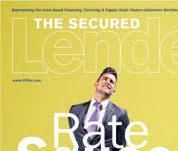


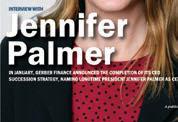

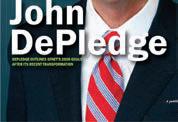
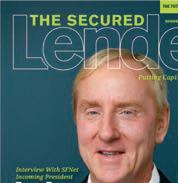
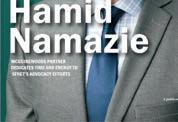

The industry’s most trusted resource for credible news published for almost 30 years, with over 6000 readers per issue, SFNet’s The Secured Lender has an audience that is engaged, refers to the magazine often and 47% of respondents to a recent survey have taken action as a result of reading advertisements in the publication.
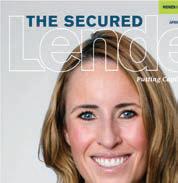
7 out of 10 B2B readers say they spend more time with industry related print publications than with mainstream business or consumer print magazines, according to the Association of Business Information & Media Companies.

Christopher J. Marquez is a principal in Goldberg Kohn’s Commercial Finance Group and focuses his legal practice on the representation of financial institutions in complex lending transactions.
Chris has extensive experience in structuring, negotiating, documenting and closing leveraged acquisition and working capital financings, recapitalizations, senior secured, split lien and unitranche transactions, and cross-border finance transactions. His practice covers a wide range of the middle market, with deal sizes ranging from $5 million to $400 million, and involves borrowers across a broad spectrum of industries and sectors. A significant portion of his work also includes representing lenders in connection with inter-creditor and subordination issues, loan workouts and restructurings, and Article 9 remedies.
Chris joined Goldberg Kohn in May 2012 and is a member of the firm’s Administrative and Business Development committees. He earned his J.D. from the University of Michigan Law School in 2010, and his B.S. from the University of Michigan in 2005. He is admitted to practice in Illinois and California.
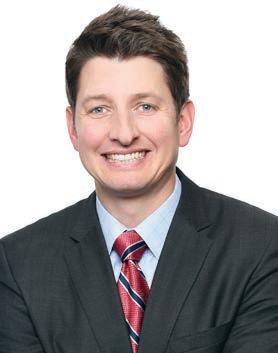
What is the best professional advice you have been given?
Invest in every deal as if it’s your own. You are part of the deal team and everyone on the team plays a valuable role, even if you are only responsible for one small piece of a transaction. Challenge yourself to answer every email, question or issue that arises on a matter, even if you are not the one tasked with formally responding. Do not shy away from the complicated aspects of a transaction. Ask plenty of questions.
How do you define a good leader?
I’m a firm believer in leading from the front. Set the example by the actions you take. When it’s the end of a quarter, late at night before a closing, make it easy for your teammates to follow your example by placing yourself visibly at the front line with them. Maintain focus, remain calm and keep a positive attitude under pressure, even during the toughest of negotiations. Set your teammates up for success, communicate with them early and often about deal developments, timelines and expectations.
What role has mentorship played in your career?
Mentorship – being a mentor as well as being a mentee – has been critical to my professional development. Earlier in my career, I had the benefit of working closely with multiple partners for a variety of clients on varied transactions. Each partner offered different insights, perspectives, practice tips and working styles for me to cherry-pick from as I molded my own practice. Now as a mentor, I am able to hone valuable leadership, management and interpersonal skills. You
don’t need a formal program to experience the benefit of mentorship, nor do you need to limit yourself to a single mentor/mentee. Be willing to listen. Often the best mentors have also been good mentees.
What are your secrets to staying organized?
Don’t procrastinate; if you can complete a task quickly in the current moment, do it - you never know when the next task or project will arise. Leave some room for unexpected issues and assignments. Delegate where possible. Take detailed notes and review them often. Utilize your email inbox as a to-do list, this will force you to keep it decluttered and to triage priorities.



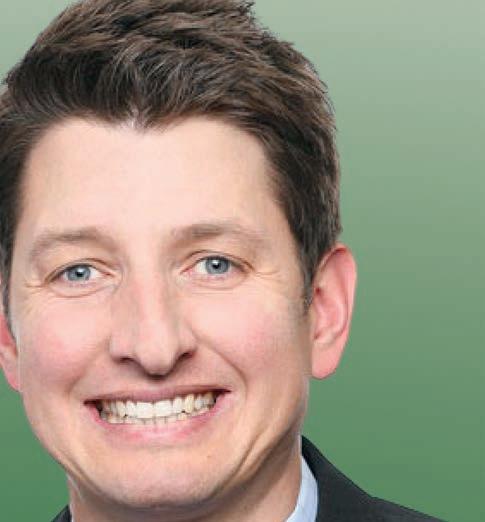



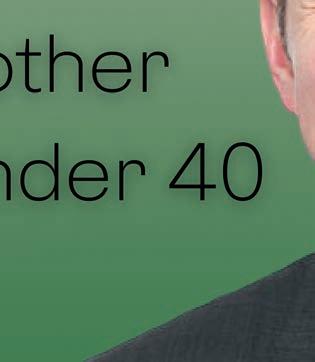
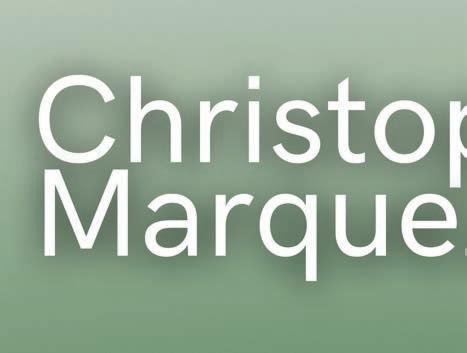
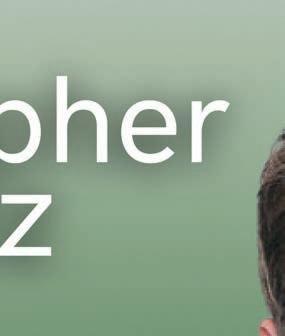
Alex focuses his practice on representing borrowers, private equity sponsors and their portfolio companies, direct lenders, and lead arrangers in connection with syndicated and bilateral loan financings, including senior secured financings, first lien, second lien, mezzanine, asset-backed, unsecured, and bridge financings. Alex works on transactions which arise in the context of acquisitions, refinancings, and transformative transactions. Among other selected lender side representations, Alex has represented Monroe Capital, Boundary Street Capital, Brevet Capital, and several other direct lenders in connection with senior secured credit facilities to fund acquisition financing and refinancing transactions extended to middle market companies in industries spanning from digital infrastructure to consumer products, and healthcare.
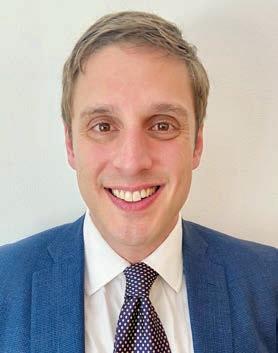
Be thoughtful. This begins with listening carefully to your client. In any given transaction, there are myriad competing priorities, issues, and misaligned incentives. By trying to address every potential issue with the same fervor, attorneys run the risk of overwhelming their client, their colleagues, and their counterparties, resulting in information overload and a failure to progress towards consummation of the transaction, let alone resolution of the most important points. Instead, be thoughtful about the handful of points which are most economically impactful to your client and prioritize them. The single best indication of your client’s priorities are the points that your client consistently asks you about or comments on. By listening attentively to your client’s questions, you can often distill their overriding economic objectives and tailor a plan to affect their desired outcome. Resist the initial urge to offer up solutions or terms that you’d customarily propose for a party in a similar situation until you are sure that a course of action applies to the fact pattern at hand. Listen to your counterparties, analyze their responses in detail, and understand their economic incentives. By taking the time to frame and explain practical solutions to a counterparty from their perspective, you are much more likely to convince them to accept your proposal.
A good leader inspires others on the team through transparency, delegation, and training. Leaders disseminate relevant information effectively, share their expectations, break down silos among team members, help the team to see the “big picture” and drive towards a common goal. When junior associates feel that they are empowered to take ownership of a workstream or document, and that their senior values their judgment and effort, they are more likely to overperform and flourish with new responsibilities. A good leader consistently provides junior members of the team with guidance, context, models, and constructive feedback. Good leaders model high quality workproduct and effort themselves and, as a result, colleagues welcome and respect their guidance and constructive feedback.
What role has mentorship played in your career?
I’ve been fortunate to have a mentor who is a leading subject matter expert as well as a practice group leader within the firm. He enthusiastically shares his knowledge, management insights, and candid feedback with me. This relationship has exponentially accelerated my professional growth and shaped my career path. This mentorship is particularly successful because I feel comfortable reaching out to him with questions about a provision, deal term or situation, however bespoke or complex. My mentor has invariably encountered the issue before and has seen the gamut of possible resolutions and how they play out in practice.
The same factors which deter others from careers in secured finance; attorneys who opt for practices such as M&A typically cite the dry and technical nature of lending deal terms and documents, the risk aversion of certain lenders, a preference for delving deeper into a company’s underlying business than the nuances of its capital structure, and the compressed time schedule for documenting an acquisition financing versus the underlying acquisition; are what makes secured finance a fascinating and rewarding field to practice in across economic cycles. Once you see how subtle differences in an intercreditor agreement or a call protection provision radically transform the economics of a given transaction, and you’ve had the privilege of seeing a credit from an original financing through multiple add-ons and incremental facilities, an amendment and restatement and, ultimately, takeout of the facility, you’ll be hooked. I’ve particularly enjoyed working with clients as they’ve navigated COVID impacts, a rising interest rate environment and spread widening, supply chain disruptions, and idiosyncratic business challenges. Because secured finance requires particular subject matter expertise, the sooner a young professional with a knack for secured finance decides that they’d like to spend their career in this area, the better.



Greenberg Traurig congratulates all of the honorees, including our own Alexander Sellinger, on his recognition as one of this year’s 40 Under 40 Award recipients.
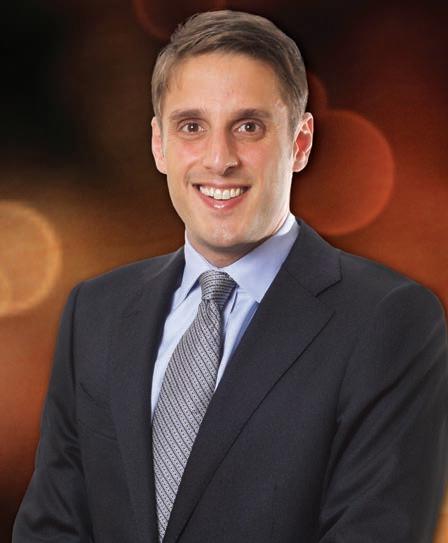
Greenberg Traurig is proud to support the SFNet’s commitment to driving mentorship and collaboration, and in celebrating the achievements of future leaders in the secured finance industry.

Holly Loftis is a partner in the Haynes and Boone Fund Finance practice group. She routinely advises banks and other financial institutions on the structuring, documentation and negotiation of various fund finance products, including revolving lines of credit to private investment vehicles secured by the vehicle’s unfunded capital commitments from its investors and other related assets. She is a credible, trusted advisor to her clients and has represented over 20 different financial institutions on such secured subscription financings, including broadly syndicated financings with lender commitments upwards of $5 billion. Holly is a member of the U.S. planning committee for the Women in Fund Finance, an initiative under the Fund Finance Association that focuses on increased engagement, recognition and promotion of women leaders within the alternative investment fund finance industry. Holly also serves as a thought leader in her industry, having authored several articles on various topics related to subscription credit facilities, including articles that have been published by Bloomberg Law and Lexis Nexis.
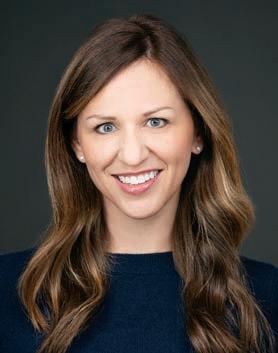
The mentorship that I received over the years, particularly as a junior and mid-level associate, was critical to my success, and I will always appreciate the more senior attorneys that I worked with over the years that took an interest in me. As a junior attorney with a transactional focus, I spent most of my time completing assignments and working directly for a more senior associate, who, notwithstanding his heavy workload, always made time to stop by my office and provide in-person feedback or to provide a detailed email explaining how I could do better next time. I’ll never forget the first time I received his feedback on some exhibits to a loan agreement. I felt that I had done a great job with the assignment and was incredibly surprised to learn how many times I missed the mark. Without him having taken the time to provide such critical feedback, I would have likely made the same mistakes the next time I was tasked with a similar assignment. I was able to incorporate his instruction into many of my drafting assignments after that and become a dependable thoughtful drafter. As I became a mid-level and senior associate, I spent more time working directly for our lender clients, rather than for senior attorneys. This required learning a new skillset, which was how to provide excellent client service. The partner I spent most of my time working for provided nonstop guidance on this. We would discuss it in the office if we ran out to grab coffee and on the phone. He was constantly pointing out how I could attach one additional document to a client email, and it would have made the client’s life easier or how certain information was best delivered over the phone. It is really these soft skills that often don’t get taught but when paired the more technical skills you learn early on enables you to take your career to the next level.
With many working remotely or hybrid the past few years, how can young professionals be sure to “stand out from the crowd” with upper management?
I think this has been really challenging for many young attorneys. Without the frequent in-person office interactions, even the short ones from passing by that more senior attorney in the hallway, many young attorneys have reported a need to get creative and be more persistent with the senior attorneys to find ways to stand out or even remind the senior attorneys they are there to help. My best advice would be to constantly remind people of your availability to stay on everyone’s radar and to have as many phone or zoom calls with the senior attorney as they will take (if in-person meetings are not an option) requesting feedback. Back when everyone was in the office and I was staffing junior attorneys on transactions, I often worked most with those who sat near me. The number of times I passed by those attorneys in the hallways or had them run down to my office with a question kept them top of mind for me. Now, with attorneys being in the office on different days and a lack of the convenience of physical proximity, junior attorneys should utilize email, phone call and the firm’s chat feature to solicit feedback, and it will require more persistence. I really think junior attorneys can stand out if they request and continue to request feedback on their assignments because you will not only demonstrate an awareness of the issues, but you will continue to improve your skillset for the next time.












Abbey Ruby is a financial services attorney in Holland & Knight’s Nashville office and Practice Group Leader of the firm’s global Financial Services group. Abbey counsels lenders, agents, private equity sponsors and corporate borrowers in complex financings and related transactions, including general corporate lending transactions, acquisition financings, first and second lien facilities, bridge loan facilities, mezzanine loans, asset-based lines of credit, real estate and construction financings, capital call/subscription facilities, restructurings and workouts. Abbey’s experience spans a wide range of industries, with particular emphasis on healthcare. Her experience includes term and accounts receivable loans to owners and operators of senior living and behavioral health facilities, as well as multifamily real estate loans. Additionally, her experience also includes cross-border and multicurrency facilities, as well as advising private equity firms and their portfolio companies on a wide variety of financing transactions and real estate developers in financings involving state and national tax credit programs.
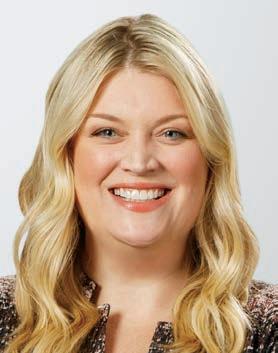
What is the best professional advice you have been given and how have you implemented it?
Say yes – to new opportunities, new work, and new relationships. Having exposure to many different types of work and segments within financial services will allow you to be more flexible to chase new opportunities and also to pivot when the market changes, because it always will change. It can be scary to try new things, or hard to take on more if you’re already busy, but it truly pays off.
What role has mentorship played in your career?
I’ve been lucky to have some wonderful mentors who have taught me not just the hard skills of secured finance law, but also the soft skills of effective communication, a strong work ethic and how to grow and maintain business as a woman in a historically male-dominated profession.
What advice would you give on how to self-advocate?
Don’t go it alone. Find people within your organization who you feel comfortable with, and then don’t be afraid to ask them to help advocate for/with you. Also, don’t assume that people know what you want out of your career and what your needs are (big or small). Being able to succinctly share with those in leadership positions what you want or need makes it far more likely that you’ll be able to achieve those goals.
What are your secrets to staying organized?
Have a system and stick to it, every day. Falling behind makes it that much harder to catch up. Also, ask high-performing individuals in your organization what they do to stay organized and see if their system would benefit you in your similar work. Finally, don’t be afraid to change
your system if it’s not working as well as you need it to, or to explore new technologies which are always evolving and can be great tools for organization.
What career trajectory would you like to be on?
The one I am on right now! That hasn’t always been the case, and I’m glad I wasn’t afraid to seek new opportunities, scary as that can be. Finding an organization that shares your vision for your career, and will support you in those endeavors, is key. But you must first define what your career goals are because they are not the same for every person. Some truly great organizations may just be the wrong fit for what you want and need at that stage in your career.
With many working remotely or hybrid the past few years, how can young professionals be sure to “stand out from the crowd” with upper management?
Communication is a key skill to successful remote work - be sure people know what your schedule is and when you might not be available, what you are working on, and the value you are adding to your team and projects. Good work will always be recognized, but it can be harder to see when teams are not together in person, so making sure to communicate these things is key.
What would you say to anyone considering a career in secured finance?
Don’t let a lack of background or education in finance keep you away from this field, especially on the legal services side. I see too many young people, particularly women, who could be great at this work because they are organized, detail oriented, hardworking and excellent communicators who self-select out because they didn’t study finance in college.

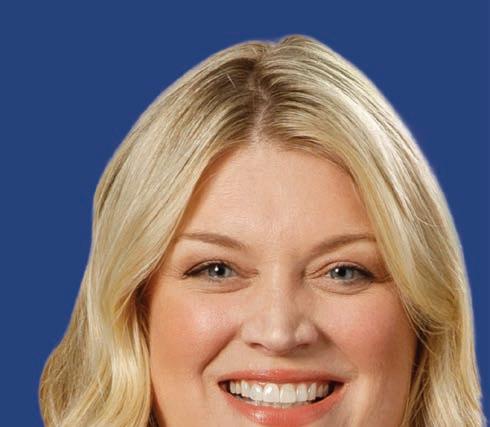


Michael Rich is an associate in Otterbourg’s banking and finance department. Mike represents factoring companies, lenders and other financial institutions, as well as borrowers, in a variety of factoring, lending and corporate transactions. Mike has worked on financing transactions covering a wide range of industries, including staffing, technology, transportation, oil and gas, lender finance and government contracting. Mike has experience in factoring, asset-based lending, inventory lending, trade finance and specialty finance. He maintains an active role in all of his client matters and is the primary contact for many of the Firm’s clients. In connection with such representation, he advises clients on all aspects of lending transactions, including the drafting, negotiation and closing of various credit facilities.
Mike earned his Juris Doctor from St. John’s University School of Law, magna cum laude, and his B.S. in criminal justice from St. John’s University, summa cum laude. Mike lives in New York City with his fiancée, Jenna.
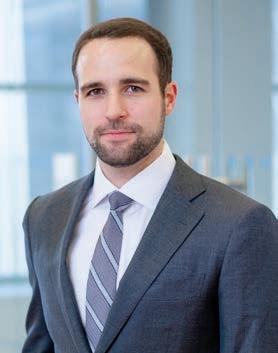
What is the best professional advice you have been given and how have you implemented it?
One of the best pieces of professional advice I have been given is to learn how to efficiently and effectively manage the deal process while getting the deal done for the client on their terms. In any financing transaction you want to be able to walk your client through, and make your client feels comfortable with every aspect of the deal and negotiation process. However, certain clients have different pain points and learning what those are and being able to identify them based on the client you are representing makes life easier for your client. This also makes the overall deal process smoother for all of the parties involved in the transaction. On any given deal, you might be presented with ten issues, but only five of those might be important to a particular client. In managing the deal process, an attorney should be able to walk through all those issues and emphasize those that are most important to the client and their institution. As an attorney, you never want to be an impediment to the deal process. For me, personally, learning and understanding how to manage the deal process as a junior associate has paid dividends with clients and with the partners I work with.
A good leader not only leads by example, but pushes the next generation to lead by example. In the finance and business world, leaders need to be able to trust and delegate tasks to their subordinates. When a good leader believes that you are ready, they let you take control. A good leader is a sounding board when you are concerned, have questions or need general career advice. A good leader will not only provide their input and make you feel comfortable with any potential issue, but they will also encourage
you to find a solution to the problem you sought their advice for. A good leader encourages you to take control of your own career. In my opinion, this pushes growth and independence and helps create the next generation of leaders. Ultimately, I have tried to emulate the leaders at Otterbourg and hope the younger associates I have the pleasure of working with do the same.
With many working remotely or hybrid the past few years, how can young professionals be sure to “stand out from the crowd” with upper management?
While working from home limits actual face-to-face interaction with upper management, you can still be seen while working remotely as a young associate by performing just as you would in the office when you are at home. When you are working remotely, you are still expected to be available and do your job during “office” hours and beyond. So long as you treat both settings the same, upper management will take notice when you perform well. For instance, when you do a good job for a client, they are not afraid to let people know, especially if it is after office hours or over the weekend. When that information gets to your supervisor, they will send that information up the totem pole and it will eventually make its way to upper management. If your institution follows a hybrid model, when you are in the office make sure to be active around the office and attend firm and client events. It goes a long way when a young professional makes it a point to get out and interact with the staff, other attorneys and, most importantly, clients.

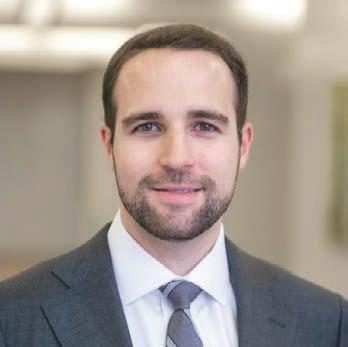
Matthew Weiss is an associate in the Bankruptcy, Restructuring & Creditor Rights Practice Group at Parker, Hudson, Rainer & Dobbs LLP. He’s a graduate of the University of Georgia and the University of Georgia School of Law. Following law school, Matt clerked for the Honorable Marvin H. Shoob of the United States District Court for the Northern District of Georgia. Matt’s practice focuses on creditor rights and insolvency-related litigation in bankruptcy, federal and state courts. Matt serves on the Board of the Atlanta Bar Association Bankruptcy Section and has been named for the “On the Rise” distinction by The Daily Report, as one of the “Ones to Watch” by The Best Lawyers in America, as a “Rising Star” for Bankruptcy and Business Litigation by Super Lawyers, and as one of Georgia’s “Legal Elite” by Georgia Trend Magazine. Matt has also been published in the Georgia Law Review, the American Bankruptcy Law Journal, the Journal of Corporate Renewal, and the American Bankruptcy Institute Journal.
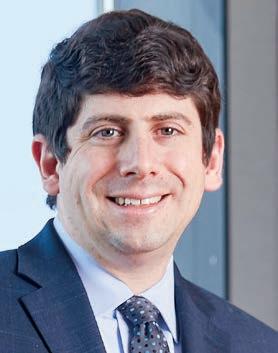
How do you define a good leader?
A good leader is someone who sets a positive example and works for their own success and for the success of their team members. Throughout my career I have tried to demonstrate the attributes of a strong leader, even where I was not the most senior attorney working on a matter. For example, in a recent trial in a bankruptcy case, I took a lead role among several law firms representing multiple clients in drafting briefs for the bankruptcy judge’s consideration.
What role has mentorship played in your career?
I have been fortunate to have a series of strong mentors during my career in bankruptcy. At each step, professional mentors at Parker Hudson and my previous firms provided me with guidance on how to be an effective bankruptcy lawyer, how to be a good litigator, how to generate business, and how to be a good firm citizen. I’d like to think that I have played the same role for junior attorneys that I currently work with at Parker Hudson.
What advice would you give on how to self-advocate?
Being a good self-advocate requires strong communication skills. It’s important to let those who you work with, including partners or other senior managers, know what your needs are and where you want to take your career. I’ve been fortunate at Parker Hudson to work with other attorneys who have been very focused on helping me accomplish my professional goals.
What would you say to anyone considering a career in secured finance?
I think a few things are important for anyone interested in becoming
a bankruptcy lawyer. First, it is critical to develop strong litigation skills in addition to the transactional skills that are typically associated with a commercial finance or bankruptcy legal practice. In particular, I would encourage potential lawyers to consider a clerkship (either with a bankruptcy court or a district court) to become familiar with what happens in the courtroom. Second, it is important to develop a strong skillset in other litigation or transactional work because bankruptcy can be a cyclical practice. Overall, I have found bankruptcy to be a very rewarding area of the law to work in.
How would you encourage young professionals to become more involved in their community or volunteer? How have these activities outside of work helped shape your professional life? Community engagement should be a critical piece of any young professional’s career plan. Through my involvement with numerous boards and leadership programs, both in the bankruptcy/insolvency world as well as with various religious, political, and civic organizations, I have met a broad range of people who have served as professional mentors, served as sources of new business, and introduced me to various networks that have allowed me to further my career. I think my involvement with the local Bankruptcy Bar Association has been particularly beneficial, as it has allowed me to meet many other bankruptcy attorneys practicing in Atlanta and to interact with many of our local bankruptcy judges. These interactions are helpful when I’m in the courtroom and am a familiar face to the bankruptcy judge or opposing counsel and when other bankruptcy lawyers think of me and Parker Hudson to refer potential business.


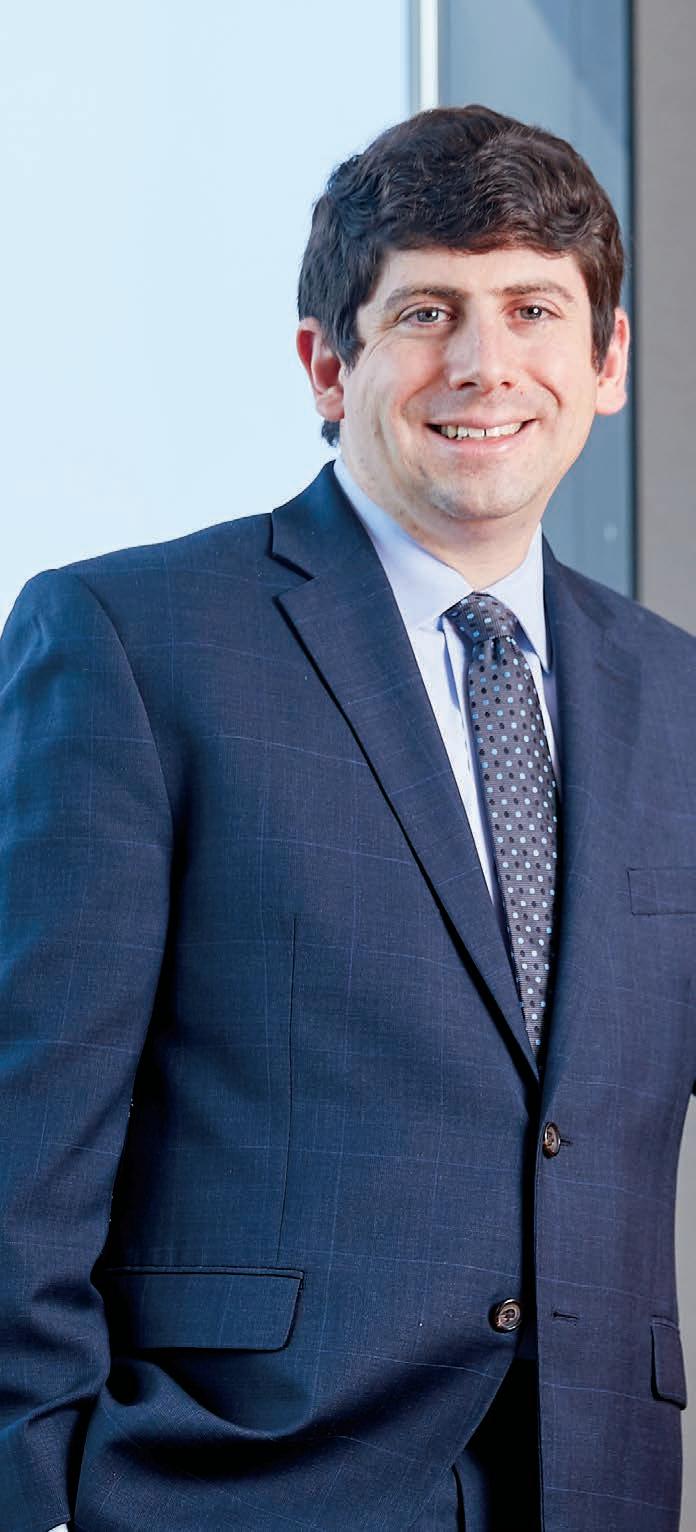
on being named a recipient of the SFNet’s 40 Under 40 Award.
We celebrate Matt and the other recipients recognized for their contributions to the secured finance industry.


Kelechi Adibe is a partner in Sidley Austin’s global finance practice group. Kelechi’s practice focuses primarily on advising commercial banks, direct lending funds, investment banks, as well as private equity and financial sponsors in asset-based and cashflow facilities, acquisition financings, cross-border financings, syndicated and bilateral financings, unitranche financings, as well as workouts, restructurings and other distressed financings. His work spans a wide range of financial markets and deal sizes.
Kelechi is actively involved in Sidley Austin’s recruiting efforts both on and off campus and he currently serves on the firm’s Summer Associate Program Committee. He is also active in several legal industry diversity initiatives, including the Sidley Prelaw Scholars Program, the Sidley 1L Diversity Mentorship Program and other pipeline programs in Chicago.
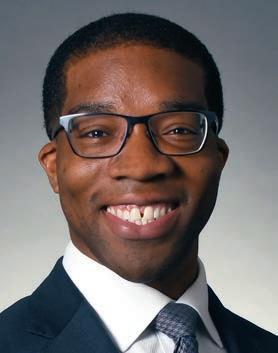
Kelechi graduated cum laude from the University of Michigan Law School. He received his B.A. in economics (with high honors) and political science from the University of Michigan, where he graduated with distinction.
What is the best professional advice you have been given and how have you implemented it?
Some of the best professional advice I ever received came from a seasoned colleague who emphasized the importance of understanding the human element behind every transaction. Junior lawyers, after getting a little experience, often begin to view each transaction as just another one of many, and they forget that behind every financing there is a transformative acquisition helping a founder achieve her mission, a seasonal business looking to meet payroll in the off-season, an owner selling for life-changing sums, or some other very human motivating force for the transaction. Losing sight of that means not truly understanding the perspectives of the other transaction parties and, as a result, not providing the best client service. Since receiving that advice, I have made sure to always take the time to consider the concerns, motivations, and goals of my clients and their clients on each transaction, which allows me to tailor my counsel and provide more personalized service. That approach has helped me develop stronger relationships with my clients and gain a deeper understanding of their needs and, ultimately, it gave me a greater sense of purpose and fulfillment in my work.
How do you define a good leader?
I am very fortunate to work under phenomenal leadership within the global finance group at Sidley Austin, and I have witnessed the defining characteristics of good leadership first-hand. In addition to having excellent communication skills, an ability to inspire and guide, and a clear vision for their team, good leaders should be earnestly open to feedback, including constructive criticism. They cannot merely ask team members for their honest thoughts and expect them to feel comfortable sharing. But by actively seeking feedback, reflecting on their performance, and making improvements, good leaders can set a positive example for their team and create an environment where
everyone feels empowered to share ideas, learn from mistakes, and grow together.
What advice would you give on how to self-advocate?
In an ideal world, our supervisors and mentors are perfectly aware of all our efforts, and we all humbly reap the benefits as we work toward our goals. In reality, we need to be our biggest champions. Keeping track of your accomplishments and their impact on your organization’s success will help you understand your worth and provide a strong foundation for your self-advocacy. Additionally, showcasing those accomplishments, whether in connection with a review process, in discussions with colleagues, or otherwise, will help leaders on your team understand your value to your organization, and give them tangible information to use as they provide support and guidance to you on how to achieve your goals – and it is essential that you clearly communicate those goals to them.
What would you say to anyone considering a career in secured finance?
A career in secured finance offers a unique blend of intellectual challenges, professional growth, and the chance to work on significant transactions that impact businesses and economies. The field is continuously evolving and requires that we all keep up with the latest industry trends, legal developments, and regulatory changes. That dynamic environment ensures that the work remains fresh and engaging. Nonetheless, I would encourage anyone considering a career in secured finance to reach out to professionals in the field to learn more and determine whether it aligns with their interests and aspirations, and if secured finance seems as though it would be a good fit, they should embrace the journey, build strong relationships with mentors and colleagues, and be prepared to learn and grow throughout their career.









Serena G. Granger is of counsel in the Global Finance practice of Paul Hastings and is based in the firm’s New York office. She advises banks, private credit funds and other loan market participants on transactions across the capital structure. She has represented banks, private credit funds, sponsors and borrowers in syndicated financings, club deals, unitranche financings, high- yield offerings and other debt issuances, equity offerings and investments, including in connection with leveraged buyouts, recapitalizations, restructurings and structured credit transactions across many industries. Serena creates bespoke market and transactional analysis for clients on strategic and structuring matters in finance transactions. She develops proprietary loan market data analytics, leveraging artificial intelligence, machine learning and other technology-enabled solutions, including the Global Finance practice’s award-winning PH Market Scorecard, an interactive data analytics platform. Her loan market updates and market analyses have been published in various publications, including JD Supra, Lexology and Refinitiv. She received her A.B., cum laude, from Princeton University and her J.D. from Columbia Law School, where she was a Harlan Fiske Stone Scholar.
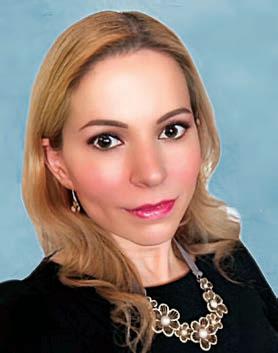
How do you define a good leader?
A good leader is confident, leads by example, practices accountability, clearly outlines objectives (and then delivers on them) and protects and advocates for their team. Sometimes that final prong, to protect and advocate, can be the most critical in distinguishing the good leaders from the exceptional ones. A good leader may inspire and obtain results, but an exceptional leader makes those wins into group accomplishments, which fosters a collaborative and results-oriented dynamic.
What advice would you give on how to self-advocate?
Focus on your audience and their primary motivators when advocating for yourself. Whether self-advocating comes naturally or not, reframing your communication based on what engages and drives your audience serves to align your objectives with theirs (and ideally your organization’s), and also prevents self-advocacy from appearing to be self-aggrandizing or bragging. Advocating for yourself in this manner creates a shared purpose, making your audience—whether that is your direct supervisor, your peers, your direct reports or otherwise—invested in your success and hopefully motivated to help further it.
What are your secrets to staying organized?
Staying organized is a perpetual work in progress. First, determine the objective behind getting and staying organized. Then create an organizational system to deliver the desired results. To ensure the organizational system works going forward be willing to deftly adapt and adjust that system as needs and priorities evolve.
Once the initial organizational system is implemented, reevaluate it periodically and remain open to improvements (whether from
technological advances, process changes or others’ feedback) to stay organized long-term and to scale appropriately if/as needed.
With many working remotely or hybrid the past few years, how can young professionals be sure to “stand out from the crowd” with upper management?
Spend time learning about upper management’s priorities and then figure out how to best serve those objectives based on your skillset and interests. Find ways to get involved in different projects or initiatives that will provide visibility into upper management and/or make you more visible to upper management. Select a project or initiative to get in front of upper management that aligns with your passion, strengths, workload and schedule, and you will be able to distinguish yourself in an impactful way.
What would you say to anyone considering a career in secured finance?
If secured finance is calling to you, explore different opportunities to determine what potential career paths in this space play to your strengths and keep you intellectually engaged. There are many different professional opportunities in secured finance, which are well served by a variety of different strengths and skills. Find your métier in secured finance and your work will be professionally and personally rewarding. If that calling evolves over time, pivot into a new opportunity in this space, and you will be able to continue learning and conquering new challenges throughout your secured finance career.
Caroline Gorman focuses her practice on public finance and on all aspects of secured and unsecured financing, including construction and real estate loans, acquisition financing and asset-based financing. She regularly represents clients as bond counsel and underwriter’s counsel related to tax-exempt financing for 501(c)(3) entities, governmental units and other entities.
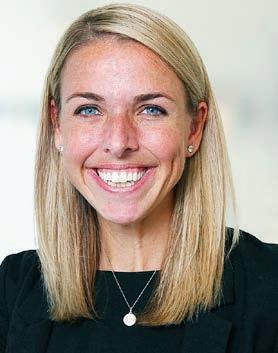
Caroline’s practice involves structuring and completing project financings for the construction of major infrastructure improvements for nonprofit institutions. She also represents clients with respect to restructuring projects involving multinational enterprises and post-acquisition integration.
Caroline serves as a member of Stradley Ronon’s board of directors.
Caroline also currently serves as co-chair of Stradley Ronon’s business department and co-chair of the finance and real estate practice group.
What is the best professional advice you have been given, and how have you implemented it?
Whether you consider an experience to have been positive or negative, there are things you can and will learn from it. It’s more fun when the experiences are positive, but sometimes the best stories and lessons come from the experiences that felt terrible in the moment.
How do you define a good leader?
A good leader is someone who has a vision but appreciates the perspective of those around them. A good leader is willing to recognize their own limitations. A good leader looks out for their people — both those junior to them and those senior to them. They are someone who knows that it is never just about them but also about the clients, the team, and the firm.
What role has mentorship played in your career?
Having a mentor or sponsor is good — having several is better. Finding many mentors/sponsors who serve all of those different purposes is invaluable. I have been extremely lucky in my career at Stradley Ronon to have several colleagues, Stradley Ronon partners and former partners, industry friends, and work buddies who all have helped me further my career in different ways. I would not be in the position(s) I am today without their help.
What are your secrets to staying organized?
Two methods. First, have a list of what you need to accomplish that day in front of you at all times. Add everything you need to accomplish — personal and professional, major “to-dos” — to the things you can do in less than a minute; you can even add items you did that morning if it helps you understand the shape your day has taken. Checking things off helps you see what you are accomplishing and prioritizing. Seeing
the items that remain on the list helps you understand the priority for the next day. Repeat each day. Second, if you can’t find something you’re looking for, clean your office.
What career trajectory would you like to be on?
There’s a quote that an ultramarathoner I follow always uses: “Relentless forward progress.” She references it for races, but I think it’s the perfect way to think about your career (and life in general). Your career is not always going to be easy, fast or a straight shot, but as long as you are moving forward, you are getting somewhere. Be flexible. No matter what you plan for your career, you do not know what will happen over time, so just keep moving forward in a direction that makes sense for you today.
With many working remotely or hybrid the past few years, how can young professionals be sure to “stand out from the crowd” with upper management?
You don’t have to be in person to be seen and show yourself as a dedicated team member. The best young professionals I work with are the ones who are proactive in asking for help, work, new projects and new experiences. Being willing to take things on and letting those more senior to you know that you are consistently looking for those opportunities from the start are the best ways to stand out.
What would you say to anyone considering a career in secured finance?
I would say emphatically, “Yes, go for it.” A career in secured finance means that you can have a long career doing really interesting work. It’s a small community, and if you’re lucky, you get to know and work with some of the best people.
Diona Rogers represents financial institutions in commercial finance and secured lending transactions. In this fast-paced industry, she works closely with bankers and other lenders on the legal and financial terms of proposed ABL, structured finance and other lending transactions. Diona drafts and negotiates credit agreements, subordination agreements and other loan documents, ensuring in each case that her client’s interests are protected. She also helps amend credit documents to respond to changes in a borrower’s status, including changes in collateral or corporate structure. Diona has worked on complex loan transactions that have financed corporate and M&A activity throughout Chicago and across the U.S. and Canada. She speaks the language of her financial services clients and shares any legal issues that she anticipates may impact a particular financing. Together, they work collaboratively to resolve any questions and pave the way for a successful transaction.
Diona holds a J.D. from Loyola University Chicago School of Law as well as an MBA from Loyola University Chicago Quinlan School of Business, enabling her to apply a strong business-minded perspective to legal matters.
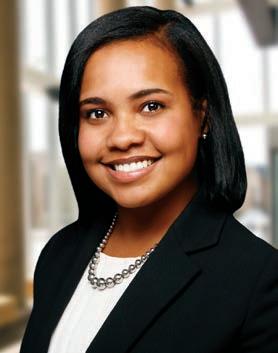
What is the best professional advice you have been given and how have you implemented it?
I have received lots of great professional advice over the years, but one of my favorites is to build strong relationships. The financial services industry is much smaller than it seems. Bankers, lawyers, and other financial service providers often move around within the industry. Building solid relationships that migrate with the individuals as they move over time has been a very beneficial and genuinely enjoyable experience.
How do you define a good leader?
A good leader is someone who not only leads by example, but who also creates pathways and opportunities for others to learn and grow under their leadership. A good leader is a team player who motivates the team to work together to achieve their goals. A good leader also adapts well to challenges and changing circumstances and is compassionate to others. Finally, a good leader values integrity and fosters healthy, creative, collaborative, and supportive professional environments.
What role has mentorship played in your career?
I have had the pleasure of having many amazing mentors throughout my legal career. Each of my mentors has played a vital role in my growth and development as an attorney. My mentors helped me navigate during the early stages of my career and continued to guide me as my career progressed. My journey was only successful with each of my mentors’ continued kindness and guidance. I have also had the pleasure of mentoring several young attorneys. I hope to pass along the invaluable knowledge and advice that my mentors were kind enough to share with me along the way.
What advice would you give on how to self-advocate?
I am honestly still working on developing my self-advocacy skills. I have a habit of stepping back and instead “letting my work speak for itself.” While this approach worked well during the earlier stages of my career, I have now reached a level where self-advocacy is not only beneficial, but essential, to my practice. Thus, although I am giving this advice to others, this also serves as a reminder to myself. Do not be afraid to advocate for yourself. Know your worth and trust your capabilities. Do not limit yourself, your abilities, or your accomplishments to make others more comfortable.
What are your secrets to staying organized?
I am absolutely a lists person. I don’t think it is a coincidence that I ended up in a profession centered around closing checklists and open items lists. I keep lists for almost everything in both a personal and professional context. Whenever I feel a bit out of sequence, I make a list to organize my thoughts. Essentially, lists are how I get through my days and stay organized.
How would you encourage young professionals to become more involved in their community or volunteer? How have these activities outside of work helped shape your professional life?
Look for causes that you care about and are personally connected to. Many people assume that to make a difference, they should join larger more-established organizations with grand missions. Personally, I connect more with causes that are near and dear to my heart. It can be as simple as organizing a community beach clean-up or helping with other tasks around your local community. Getting involved with a good cause does not have to start as an earth-shattering or worldchanging activity. There are groups and organizations for almost any good cause you can think of, and if not, don’t be afraid to create one!








Brian Jansen is a partner in Winston & Strawn’s finance practice and advises lenders and borrowers on middle market finance transactions. His clientele is split almost evenly between lenders and borrowers, giving him a uniquely balanced perspective and a commercial approach to transactions. Brian understands the importance of relationships in the marketplace. He advocates for his client’s positions while showing respect for the other parties and seeking practical solutions for all involved.
His pro bono work has included years of service for Uncommon Cacao, a social benefit enterprise working to build a transparent, prosperous supply chain linking cacao farmers in Belize and Guatemala with chocolate makers in the United States.
Brian received his B.S., cum laude, in finance from Iowa State University in 2008 and his J.D. from the University of Kansas School of Law in 2011.
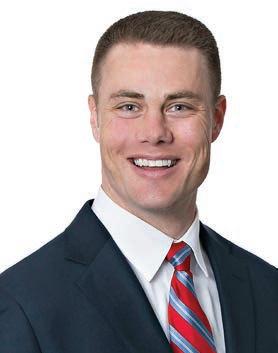
A good leader can be defined in many ways, but some traits that I believe are key to effective leadership include:
Service. I subscribe to the servant leadership model. Good leaders serve and support the people they are leading, invest in their individual development, and empower them to maximize their contributions. They are motivated by the best interest of the team, not personal gain.
Integrity. Good leaders must be honest, ethical and trustworthy. They are committed to doing what’s right, even when it is difficult. They also treat people fairly; the same way they would want to be treated.
Empathy. Good leaders understand and empathize with the people they lead. They are able to put themselves in others’ shoes and see things from their perspective, which allows them to build strong relationships and create a positive work environment.
Vision. Good leaders have a clear and compelling vision for their team, and they are able to communicate that vision in a way that inspires and motivates others to work towards it.
Overall, a good leader is one who is able to inspire and motivate others, build strong relationships, and lead by example.
Here are a couple of specific tips that I find particularly helpful in staying organized with email communications and folder organization.
Categories in Microsoft Outlook. Everyone can relate to having way too many emails. And everyone probably has some method for trying to keep them organized (whether in folders, flags or otherwise). One of the systems that saves me the most time is the use of Categories in Microsoft Outlook to indicate the nature of the emails. For example, the red category means “to do”, the green category means “signed” (i.e. signatures or signed documents), the light-orange category means
“short-term reference” and dark purple is “long-term reference”. Not only does that visually give me a sense of what prior emails are important, but I can also sort by Category to quickly find relevant emails when I need them.
The “Miscellaneous” folder. A natural tendency is to want subfolders that are more and more specific to their intent and contents. I have learned the value of using a “Miscellaneous” folder for each matter as a repository for any files or information that I cannot immediately categorize into one of my other standard set of folders. Sometimes the task of sorting information on the front end deters us from saving that information. The Miscellaneous folder makes it easier for me to save items without finding the perfect place and surprisingly easy to recall those items later.
Overall, I think any method of organization needs to be relatively easy to apply (e.g. keyboard shortcuts to apply a Category, a standard set of folders, etc.) and consistent across time and matters. Beyond that, find what works for you and stick with it.
With many working remotely or hybrid the past few years, how can young professionals be sure to “stand out from the crowd” with upper management?
Be proactive about connecting with your managers. Operating in a post-pandemic work environment requires more intentionality than ever. Whether it is picking up the phone rather than sending an email or taking the initiative to go to lunch, there are many ways to develop connections with your co-workers beyond seeing each other in the office every day. These small efforts matter—and they distinguish young professionals from their peers. Of course, doing your job well is still one of the best ways to stand out from the crowd.











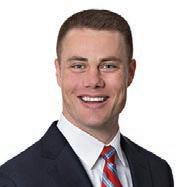
Rob Gould is managing director at Gordon Brothers. He has over 12 years of experience within the commercial and industrial sector. Rob is responsible for sourcing, negotiating, and executing complex single and multi-asset distressed investments involving wholesale inventory, accounts receivable, and machinery and equipment. In addition, Rob manages a team responsible for deal underwriting, financial management, and ongoing commercial and industrial deal operations. He has expertise in a variety of sectors including floor coverings, home products, mobile modular, meat processing, transportation, oil and gas, building materials, consumer electronics and warehouse assets.
Prior to this role, Rob was a senior valuations analyst within the Valuations team at Gordon Brothers where he completed wholesale and industrial appraisals to support the asset-based lending community.
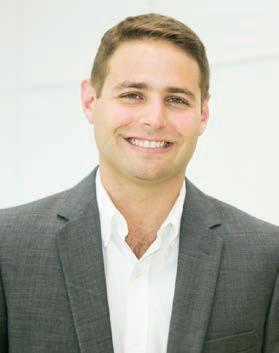
In my opinion, a good leader is someone who creates a positive work environment by fostering a culture that values efficiency and results, positive reinforcement, pride of ownership and comradery. Due to the high-pressure nature of our segment of the industry, it is important for a leader to create a team that is close knit and enjoys working with each other in order to be the most successful and productive. Another important characteristic of a leader is one who leads by example. In my experience, individuals who have successfully developed teams with strong work ethic are typically ones that embody this trait and practice what they preach.
With many working remotely or hybrid the past few years, how can young professionals be sure to “stand out from the crowd” with upper management?
The best advice I received related to standing out was that support staff should view every task, request or role within a deal or project as an opportunity to excel. In this industry, opportunity comes from being staffed on the most complex and profitable deals and every request from your manager or upper management is an opportunity to prove that you can be trusted with more responsibility. Those that are the most successful in taking advantage of the opportunities that present themselves are employees that learn how executives like to have information presented to them and tailor their requests to conform to those preferences.
What role has mentorship played in your career?
I believe mentorship has been a key differentiator in my career. I attribute my growth within this industry to my many mentors that have taught me the nature of the business, showed me the path to success and most importantly, instilled a value set which focuses heavily on
ethics and respect. I have been very lucky throughout my twelve years at Gordon Brothers to have a range of mentors, which include direct managers all the way up to executives. I was managed with a perfect blend of independence while also receiving support and guidance when it was needed. I thrived from this balance, and I strive to manage future leaders in this same fashion.
What is the best professional advice you have been given and how have you implemented it?
There are three key pieces of advice I have received that I not only live by, but instill within my team as well. First, never make the same mistake twice. When learning a new field or function, it is expected and helpful to make mistakes as you learn. In most cases, the best way to learn on the job is to make mistakes as it allows for recognition of what not to do. However, the key to becoming a valuable member of the team and firm is to learn from these mistakes and aspire to never make the same one twice.
Second, there is no such thing as a stupid question. While this advice is a little cliché, it is very relevant in our niche industry. When I received this advice early in my career from my direct manager, I took this to heart and frequently asked questions related to deal strategy, structure, etc. I ultimately learned the most important concepts of our business from informal trainings that started with simple questions.
Third, always have a point of view. It is critical to be decisive and make sure you have formed an opinion. A point of view should always be paired with analytical work to enable the most efficient decision making.




























































































































































































































































































































































































































































































































































































































































































































































































































































































































































McKenzie Thompson is the head of North American Operations – Factoring, at eCapital. With a decade of financial services and staff management experience, McKenzie’s primary focus is ensuring the daily delivery of high-quality services to customers, a critical component in a rapidly expanding organization. She is responsible for a team committed to developing positive and lasting relationships between the company and clients and nurtures a cohesive team environment, so clients’ financial needs are met every day while protecting the company’s well-being. McKenzie is an integral member of the company’s acquisition team, and as the organization continues to grow, her level-headed approach to problem-solving and strategic thinking continues to be essential to the team’s success in acquiring and merging businesses into eCapital’s corporate structure. McKenzie started her career in factoring as an account manager and developed the foundational skills that quickly elevated her within the industry. Her experience includes leading sales consultants for Marshall Acquisitions and serving as financial advisor for RJ Clarke Financial Solutions. McKenzie is a graduate of Nipissing University with a Bachelor of Business Administration honors degree.
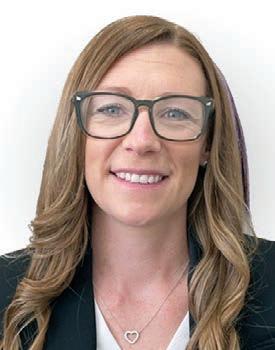
At eCapital, I have been extremely fortunate to work with a world-class leadership team. Throughout my career, I have noticed that the best leaders share the same key attributes, the first being strong communication skills. I quickly learned that the key to leading a successful team is communicating in a clear and effective manner so your team can understand objectives and how success criteria is defined. I believe that most people show up to work each day and want to do their best work, and it is the leader’s job to set them up for success by clearly communicating goals, objectives, and tasks.
Another common similarity between good leaders is their ability to be flexible and adapt to different situations. A great deal of time is spent formulating strategy and plans, but the reality is that things don’t always work out according to plan, so a leader needs to be able to pivot and change course when necessary.
Good leaders will always allow their team plenty of room to learn and develop. True growth requires individuals to step outside of their comfort zone, and sometimes that means making mistakes along the way. Leaders who focus on the development of their team know that certain mistakes can result in a positive learning experience, and they make it a point to lend support during those challenging times.
Throughout my career as an emerging leader, I was fortunate to have a safe space to make mistakes, so I make it a priority to keep this top of mind when working with my own team.
Finally, a good leader will not just understand their own strengths but will recognize and utilize the strengths of their team members. It’s important to allow people to focus on their own strengths and do what they do best, as they tend to be
more engaged and feel more successful. A good leader will accept that being really good at a few things is better than being a little bit good at everything. Great leaders will look to add value to their team with individuals who have strengths in areas that they may not themselves.
What is the best professional advice you have been given and how have you implemented it?
The best piece of advice that I received many years ago is that “if it scares you, it might be a good thing to try.” I have held on to this quote and have thought about it often in both my personal and professional life. Most of the time our fear of taking risks stems from the possibility of failure, but without risk there is no growth, no learning, and no reward.
I joined eCapital with very little knowledge of the industry but a whole lot of passion to learn. It was a turning point in my life and my career, and I was undoubtedly scared, but I knew that the reward would outweigh all the fear I had. The same fear resurfaces with each steppingstone of career opportunity; however, I will continue to face those fears and step outside of my comfort zone in order to grow.
We all encounter situations that scare us in life, either personal or professional. We can choose to avoid them so we don’t feel uncomfortable, or we can face them head on and embrace the discomfort as it leads us to something bigger and better.













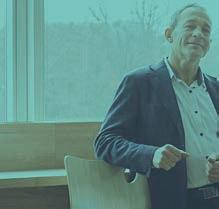




Our team is elated to congratulate McKenzie Thompson, recognized as one of SFNet's prestigious 40 Under 40 honorees for 2023.
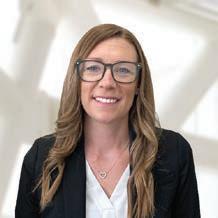
With over ten years of experience in financial services and staff management, McKenzie is a highly respected leader on our team. As Head of North American Operations - Factoring, she leads a team of 300 and has been instrumental in our rapid growth, committed to ensuring that clients receive top-quality services. Her strategic thinking and level-headed approach to problem-solving have been invaluable alongside her exceptional leadership skills which enable her to build positive relationships and create a united team environment.
We are fortunate to have McKenzie sharing her leadership insights with us every day, and this recognition serves as a testament to her hard work and dedication. Her continued contributions will certainly play a role in our company's future success.
Congratulations McKenzie!
Mehul Patel is vice president and operations manager senior for PNC Business Credit. He is responsible for monitoring and posting collateral for new deals and modifications. Mehul also assists on technology projects that improve the customer experience and create internal efficiencies.
He joined PNC’s Corporate and Institutional Banking development program in 2010 as a field examiner and was responsible for training many junior colleagues. As operations manager, Mehul played a crucial role in a major 2016 system conversion for PNC Business Credit’s customer facing and internal loan and collateral monitoring platforms. He also was integral to the successful conversion of deals resulting from PNC’s acquisition of BBVA and worked to generate efficiencies via intelligent automation. He began his career in financial reporting for Johnson & Johnson.
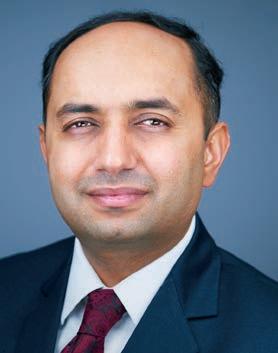
Mehul received his BBA from Temple University and his MBA from the University of Delaware.
MEHUL PATEL Vice President, Operations Manager Senior PNC Business CreditHe is a member of the Secured Finance Network and the PNC Business Credit Diversity & Inclusion council.
What is the best professional advice you have been given and how have you implemented it?
The best professional advice I have ever received is to work to learn, rather than work to earn. Because of this mindset, my personal goal is to seek learning and happiness above all else. I have implemented this advice from early on in my career by seeking mentors at the workplace from different areas of expertise and learning about their daily work. One’s career is a lifelong journey – I have made it a point to keep myself happy and motivated in the workplace to foster a long and fruitful career.
How do you define a good leader?
There are many qualities and characteristics that make a good leader. A good leader leads by example, motivates and inspires others to do better, communicates effectively, sets clear expectations, and welcomes new ideas. A strong leader has integrity, respects team members, and shows empathy and gratitude towards others. An effective leader is honest, flexible, responsible, and reliable. A good leader is someone who team members emulate, in hopes of becoming good leaders in the future. The team members are constantly watching the actions and the interactions of leaders around them.
What are your secrets to staying organized?
I value time management very highly, which helps me stay organized. I like to think of time as one resource that should not be wasted. I implement time management by setting reminders for tasks that need to be achieved by a certain deadline. I block time on my calendar to ensure that the tasks are being completed. As much as possible, I attempt to stay ahead of schedule. One example of my time management
is that I have implemented daily morning team meetings to ensure the team is also staying organized. At these meetings, we outline the important tasks for the day that must be completed in a timely manner, planning in anticipation of new deal closings, modifications to loan agreements, etc. By setting these morning meetings daily, I am ensuring that we are taking care of our customers correctly and that the necessary steps are completed for deal closings that are in our pipeline.
How would you encourage young professionals to become more involved in their community or volunteer? How have these activities outside of work helped shape your professional life?
I would encourage young professionals to look for opportunities to volunteer or get involved with community service events when available. I would stress the importance of dedication to the task at hand when signing up for volunteering opportunities. Volunteering opportunities have taught me key aspects of leadership qualities that will help shape my professional life such as empathy, compassion, and broadening one’s perspective. These qualities cannot be taught, but are cultivated through volunteering activities. Hence, it is very important that volunteering should come from within as it cannot be forced.
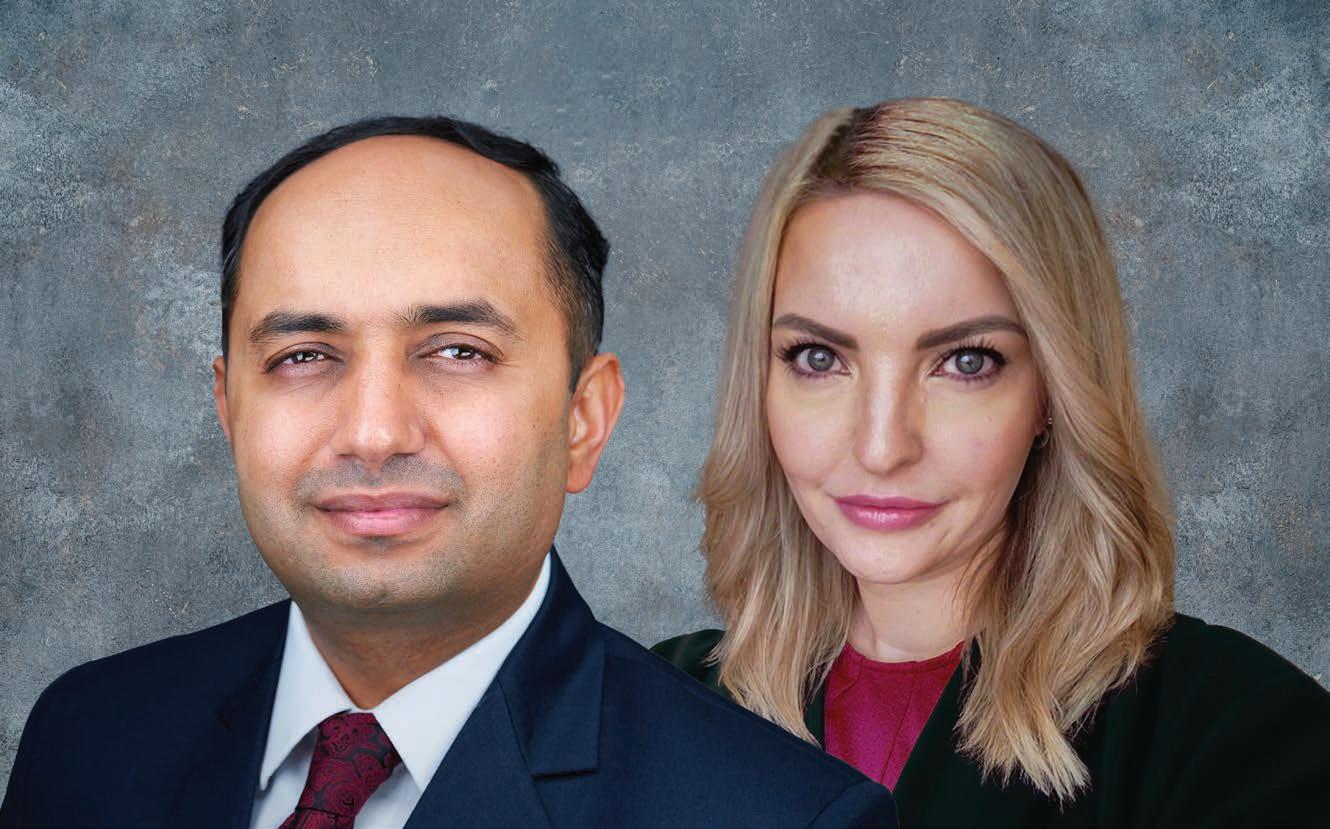
Christal Sturtz is vice president and development program manager for PNC Business Credit. She is responsible for oversight of the PNC Business Credit Development Program, one of the primary talent sources for the business.
Sturtz joined PNC Business Credit in 2012 through PNC’s Corporate & Institutional Bank development program. She has held several positions within PNC Business Credit, including field examiner, underwriter, and relationship manager for the Midwest region.
She received her B.S. in accounting and forensic accounting (Cum Lauda) from Franklin University and an MBA with a concentration in finance (with Distinction) from DeVry University.
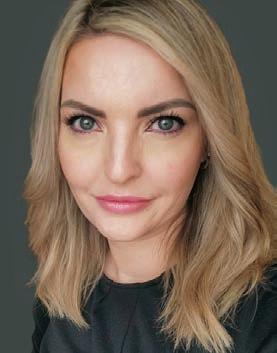
Sturtz is a member of the Secured Finance Network; committee member on PNC’s Diversity and Inclusion Group and PNC Business Credit’s Diversity & Inclusion team. She serves as advisor for the PNC Business Credit Diversity Networking Group.
CHRISTAL STURTZ Vice President, PNC Business Credit Development Program Line of Business Manager PNC Business CreditHow do you define a good leader?
I believe good leaders create and foster an inclusive and diverse environment where people can grow both individually and as a team. Strong leaders have a genuine interest in building relationships with their team and demonstrate it by actively listening and leading with integrity. They continuously seek growth and hold themselves accountable for their actions. Good leaders celebrate the successes of others and are persistent in making the impossible possible.
What role has mentorship played in your career?
Mentorship has played a huge role in my career. My mentors have pushed me out of my comfort zone, while providing guidance and encouragement when I was unsure of myself. When others believe in you, you are inspired to invest in yourself to be better and stronger, achieving things you never thought were possible. Mentorship has shaped me into the professional that I am today by helping me build my professional network, encouraging me to be open to change, seeking feedback to never stop learning, and being an active listener. My positive experience with mentorship has inspired me to strive to be a mentor for others.
What are your secrets to staying organized?
First, being open to new ideas and change. This allows me to be more efficient by utilizing new resources, trying new techniques, and creating a collaborative environment.
Second, I keep a prioritized list of tasks with deadlines that helps me remain on track. Before adding a project to my to-do list, I ask very thorough questions to ensure I have a clear understanding of the objective and timeline. Proper prioritization and organization allows me to be proactive and use my downtime to plan ahead or get a jump start
on a project or presentation.
Third, I utilize the resources available to me. I am a big believer in taking advantage of the technology enhancements available to me and my team. Recent technology innovations at PNC have enabled my team to be more effective with our time management.
With many working remotely or hybrid the past few years, how can young professionals be sure to “stand out from the crowd” with upper management?
I believe the most memorable version of yourself is your authentic self – it’s important to allow people in the workplace to get to know you for who you truly are. Take pride in your work and allow it to be a good representation of your personal brand. Build a reputation of being reliable by consistently delivering excellent customer service.
It’s also important to never stop growing. When you have a growth mindset, the people around you are likely to grow with you. Continuous growth creates the opportunity for us to learn from each other, develop innovative ideas, achieve goals, and create a more collaborative environment. Let your voice be heard. Don’t be afraid to share your ideas and ask questions that display engagement, confidence, willingness to learn and the ability to problem solve.
Lastly, put in the work to expand your network. I always encourage employees to meet new people within the business and get involved in a PNC Employee Business Resource Groups and/or participate in PNCsponsored volunteer activities. Networking helps build confidence and rapport, enables you to provide better customer solutions, supports career/personal growth, and leads to opportunities to be active in the community.















Diane Wszalek is currently the controller at Republic Business Credit. Diane has more than 10 years of commercial lending experience across accounting, operations and underwriting at Republic Business Credit. She oversees all of Republic’s finance functions as well as IT management, project management and human resources. Diane helped found Republic’s senior management team where she reports on all finance matters. She was instrumental in the merger/ acquisition of Republic with Renasant Bank Corporation as well as Republic’s prior acquisitions.
Diane received an Accounting Degree from the University of New Orleans. Previously, Diane was a two-year captain and collegiate soccer goalkeeper at James Madison University in Virginia, where she graduated with a BBA in finance and a BS in kinesiology in 2011.

How do you define a good leader?
Sports have always played a big role in my development, personally and professionally, and taught me a lot about leadership. I had leaders who were vocal and others who were quiet but led with their hard work ethic. While there is no one right way to lead, I believe there are a few things all good leaders do. A good leader is someone who adapts their style to their team members. Someone who understands that people are motivated differently, and you may need to adjust how you interact with each person. Most importantly, a good leader wants to see the whole team succeed. When somebody cares about the outcome of the team, it shows in their success. Part of what makes a good leader is setting the right example of putting in extra hours and treating others with respect.
What role has mentorship played in your career?
My mom was vice president of a finance company. I was lucky enough at an early age to have her to look up to personally and professionally. I have also learned it’s important to have somebody you can bounce ideas off or go to for advice who is outside of your direct boss, someone who doesn’t have a dog in the fight and can be objective. Having a mentor that I’ve been able to go for advice on a single issue or about career growth has been immeasurable to my success.
What advice would you give on how to self-advocate?
I feel very strongly about this and while it might come across as harsh, if you don’t believe in yourself enough to advocate for yourself, why would you expect someone else to? If you want to get better, if you want to move on to the next step, ask for help, get the education, speak up. It has to come from within. It is also remembering that the worst someone can say to you is ‘no.’ So keep asking, keep achieving. And if you experience failure, that’s OK. Good things can come from failure.
What are your secrets to staying organized?
I’m not sure I have any! I have sticky notes to remind me of tasks all over my desk.
What career trajectory would you like to be on?
The one I’m on now. I’d like to become a chief financial officer or a chief accounting officer, but as long as I’m learning and growing, I don’t care about titles. One of the most important things for me is continued growth. I would like to continue to grow my education both internally in the company and externally, such as through higher education.
With many working remotely or hybrid the past few years, how can young professionals be sure to “stand out from the crowd” with upper management?
Be seen. Whether you’re doing a Zoom chat or communicating from outside the office altogether, be sure to have those personal interactions wherever possible. And ask questions. I love when people ask questions because it shows you’re interested and want to grow. I have learned a lot from asking questions from more senior staff and gaining insight into their experiences.
What would you say to anyone considering a career in secured finance?
It’s a great industry to be in, especially as a young professional. You can learn a lot, earn a lot and grow your network if you’re willing to put the time in. The secured finance industry has put a lot of time and work into developing young professionals and growing their base. There are numerous chances to learn, network and go to events whether it is a ‘lunch and learn’ or the annual SFNet Emerging Leaders Summit.
“We are extremely proud of Diane and her growth within the company, she is constantly seeking out opportunities to learn and take on additional responsibilities, from our acquisition and accounting work to IT, onboarding new employees and more. This recognition is well deserved.”
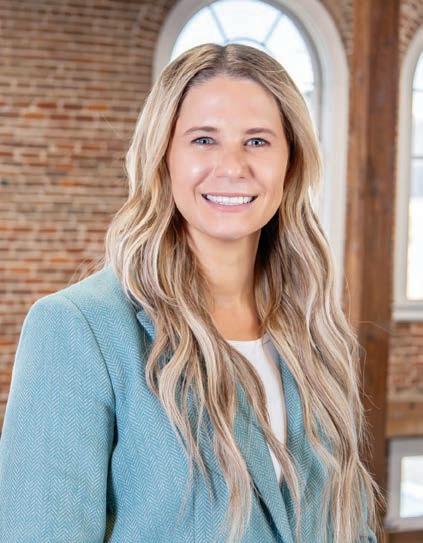 - Stewart Chesters, CEO
- Stewart Chesters, CEO





Michael Lukhton has held the title of chief financial officer since 2008 and is responsible for the overall fiscal health of REV Capital and all of its subsidiaries, including REV Prepaid and REV Tech. With a degree in mathematics and computer science, he has played a pivotal role in the creation and implementation of the company’s fiscal policies, credit policies, and IT policies. He is also the cofounder of the REV Foundation, a registered charity that supports minority-owned businesses and provides financial literacy resources to underprivileged communities. Michael is a member of the International Factoring Association, American Factoring Association, and Better Business Bureau and looks forward to furthering his involvement in the SFNet community.
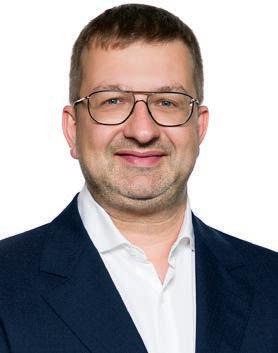
How do you define a good leader?
A good leader inspires, motivates, and guides their team towards a common goal. They have strong communication skills and the ability to listen as well as they speak. They have a clear vision and know how to rally people behind them. A good leader should also be empathic and be able to understand their team members. They can adapt, compromise, negotiate, and be quick on their feet. They encourage and empower those around them. A good leader is one that understands the value of strong relationship, teamwork, and a positive work environment.
What advice would you give on how to self-advocate?
Self-advocacy is a crucial skill for everyone to develop. It is important that young people, who are just starting their careers, learn how to effectively communicate their needs, wants, and boundaries. These are a few of the tips and tricks that I picked up over the years.
1. Speak up: Don’t be afraid to stand up for yourself. You don’t need to be aggressive, but that doesn’t mean you can’t be assertive.
2. Be prepared: It’s always important to be prepared and have your position well thought through. Take the time required to build your arguments and be ready to defend them rationally.
3. Stay calm: Emotions are rarely an asset in a business context. Staying calm helps you to communicate effectively and makes others more receptive to listening to your position.
4. Seek council: You don’t need to make decisions in a silo. You can always turn to people who are experienced and whose opinions you trust to validate or challenge you before deciding whether or not to speak up.
5. Follow your ethical compass: If your gut tells you that something is wrong, follow your gut. Speak up whenever you see mistreatment or unethical behaviour.
6. Follow up: After you speak up, always follow up with whomever you
spoke to. Ensure that your needs are met, even if you have to be a little persistent.
You know your value and your worth better than anyone else. If you feel that you deserve something (i.e. raise, attention, promotion, etc.), be ready to calmy, clearly, and effectively communicate why you deserve it. Telling someone that you believe you have earned something is always going to be more effective than telling them you need something.
What would you say to anyone considering a career in secured finance?
Secured finance is an exciting and challenging field that offers a range of opportunities for those interested in finance and business. The never-ending range of products, markets, segments, problems, and solutions, are guaranteed to keep you learning, growing, and engaged. This industry will provide with opportunities to hone your analytical skills and problem-solving abilities. It will grant you market knowledge across multiple sectors. It will test your attention to detail, challenge you, and push you...but it will be rewarding.
Don't let financial worries hold you back. Whether you need a quick cashflow boost or a long-term capital solution, we'll help to keep your business running smoothly.
Immediate Cash. Excellent Service. Peace of Mind. All this and more with




Jenny Medzi is a senior vice president at Bank of America Business Capital. As an ABL credit officer, she manages a portfolio of clients across a broad range of industries in both middle market and large corporate. Jenny is responsible for monitoring her portfolio and underwriting transactions to support acquisitions, refinances, turnarounds, and recapitalizations.
Prior to joining Bank of America in 2019, Jenny started her career as an ABL field examiner in 2011 at J.P. Morgan and then moved into the analyst program supporting the ABL portfolio management team. In 2015 she was promoted into a portfolio management role.
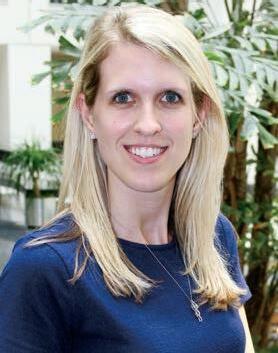
Jenny graduated from the University of Akron with a Bachelor of Science degree in accounting. She recently was a recipient of a Bank of America APEX (Achievement of Performance Excellence) Award. Jenny lives in Tampa, FL with her husband, Anthony, and two children, AJ and Reagan.
JENNY MEDZI Senior Vice President Bank of America Business CapitalHow do you define a good leader?
I have been fortunate to work with many great leaders. These leaders don’t rely on their authority, instead, they take the time to cultivate, develop and inspire others. They are self-aware and have empathy. A good leader acknowledges their own weaknesses and finds a way to use their teams’ strengths to benefit everyone. They are compassionate, with strong communication skills. Good leaders motivate you to do your best and because of the respect you have for them, you never want to let them down. A good leader can make the difference between being passionate about your career or treating it as just another job.
What would you say to anyone considering a career in secured finance?
I would tell anyone interested in secured finance that it is much more than just crunching numbers. As an accounting major, I had no idea what career I wanted to pursue. I worked as a bank teller through college and interned at the Federal Reserve in Cleveland. I knew I liked banking, but I didn’t know what that meant in terms of a career. With the encouragement of a colleague, I took a chance on a field examiner role and have never regretted it. It led me to a career in ABL, which has given me the opportunity over the past 12 years to work with all types of clients in different industries. I’ve had the opportunity to tour steel mills, lumber yards, metal stamping facilities, paper mills, and much more. I’ve created wonderful relationships with some amazing CFOs and CEOs and their management teams. Supporting clients and helping companies achieve their goals is very rewarding. If you are an organized, detailorientated, and inquisitive person, then secured finance may be the right fit. We need talented individuals who can learn the industry and help lead the next generation of successful ABL lenders.
With many working remotely or hybrid the past few years, how can young professionals be sure to “stand out from the crowd” with upper management?
The first thing I would suggest is to set up standing bi-weekly/ weekly calls with the people you support. This will keep you on top of your responsibilities and connected with your colleagues. Make sure that you are being proactive. Don’t wait for someone to come to you with a request, ask what you can do to help or even start something that you know needs done before it is asked of you. Ask to join client calls or internal calls, even if you think they don’t directly pertain to you. This will provide visibility and at the same time, experience, so that you will learn to be more comfortable conducting these calls yourself in the future.
I would also suggest volunteering for projects. The more projects you join, the more connections you will make with other people. Volunteering shows that you are passionate about your work and gives you the opportunity to be part of positive changes for an organization. Certain projects can also help improve your skillset and maybe even help you learn something you didn’t know before.
Finally, don’t be afraid to ask questions. Don’t ever think “I should know that” or feel embarrassed because you have a question. There is a lot to learn, and we all have questions, whether we have been here six months or 16 years. Pick up the phone, skype or email if there is something you can’t figure out on your own. The more you learn and experience, the more you can be relied on and be an asset for your team.

Bank of America is proud to support the 40 Under 40 award recipients. Congratulations to Jenny Medzi on your well-deserved recognition.


Mike Watson is responsible for underwriting, structuring, and portfolio management for Callodine Commercial Finance (CCF).
Prior to joining CCF, Mike spent six years at Wells Fargo Capital Finance (WFCF), most recently as a director, senior relationship manager in the Retail Finance Group. In this role, Mike was responsible for underwriting, portfolio management and restructuring of asset-based loans to North American-based retailers. Prior to WFCF, Mike spent two years as vice president, underwriting sponsor and loan originations at Salus Capital Partners (SCP). There, he was responsible for evaluating and structuring new asset-based loan opportunities, supporting the executive team, and ensuring continuity as loan mandates transitioned into underwriting and portfolio. He spent the first eight years of his career at GE Capital (GEC), starting as an Investment Analyst, and most recently as assistant vice president for GE Corporate Retail Finance. At GEC, Mike primarily performed portfolio management and underwriting for asset-based loans to North American-based retailers. Mike received a B.S. in corporate finance and accounting, with a minor in Law, from Bentley University.

Over the course of my almost 20-year career, I’ve had the good fortune of working with, and for, some very talented people with various leadership skills and management styles. There are a few leaders that very much stand out in my mind, and without naming names, I would say that the best leaders inspired and empowered me and their teams, providing guidance as opposed to direction. The most successful leaders would see their teams follow them into a proverbial burning building without hesitation, as their teams know they have their leader’s unwavering support, and it is reciprocated. I’ve experienced the “micromanager”, and the “macromanager”, and can say without a doubt that my personal development accelerated when I began working for leaders that empowered me to make my own decisions, knowing that they would support me regardless of the outcomes. My advice: allow team members to grow and take risks, and both leaders and teams will benefit from the outcomes.
What would you say to anyone considering a career in secured finance?
This is an ironic question for me as I often describe my career in secured finance—and asset-based lending in particular—as somewhat of an accident. As a college senior graduating with a degree in finance and accounting, I was searching for jobs that appealed to both skill sets, but I was particularly focused on roles in finance as I found it more interesting. I was fortunate that my college, now Bentley University, had a great career center and generated a lot of interest from both large and small public and private employers. I interviewed with several companies, but was drawn to GE Capital where I ultimately started my career. It was both the allure of a highly recognized, and at the time stable blue-
chip Company, and the job title of investment analyst. Ironically, investment analyst was somewhat of a misnomer, for what was ultimately a field examination role. Starting out as a field examiner auditing asset-based loans has led me to the career that I have today. In summary, my advice would be to take a role, take a risk, and even if it isn’t the path you thought you would be taking, learn from the experiences and use them to help you navigate to where you want to take your career next.
What role has mentorship played in your career?
Mentorship has played an integral role in my career on both a formal and informal basis. After working as a field examiner, my next role was a direct result of a formal mentorship program at GE Capital. The mentorship program afforded me the opportunity to get to know and network with group leaders and executives throughout the business that gave their time to support the development of young talent. Through this program I was introduced to the leaders of GE Corporate Retail Finance, who gave me my first opportunity to become a lender. Mentorship on an informal basis has largely led me to the role that I have today, as many of my current and former colleagues—many of whom I consider close friends—have helped guide me along my career path. This informal mentorship has proven invaluable for me in my career development, and I’ve made it a priority to try and pay it forward with talented individuals that have and will work with me in the future.
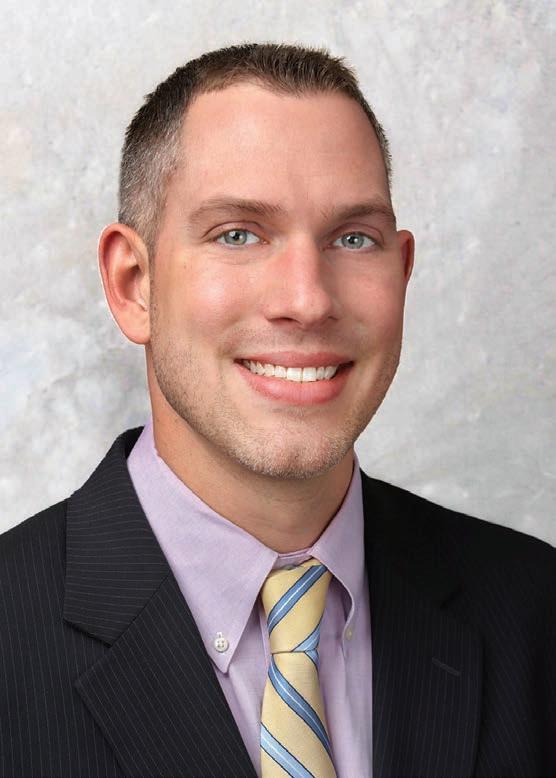
Michael Lipkin is the CEO of Assembled Brands, an innovative nonbank lender that works with entrepreneurs, sponsors and founders to power the consumer goods ecosystem. Michael has oversight of the entire company with direct responsibility for strategic growth as well as capital allocation. After joining the company in 2019, he helped structure and grow Assembled Brands’ portfolio from 6 to 45+ active borrowers. He is also a sought-after speaker on ecommerce lending and the consumer goods industry.
Michael has worked in asset-based lending for over 15 years, and started his career by joining Wells Fargo Foothill in 2007 with roles in portfolio management and field exam. He later worked on non-bankable middle-market credits at GemCap, where he oversaw a portfolio of diverse clients across their respective lifecycles.
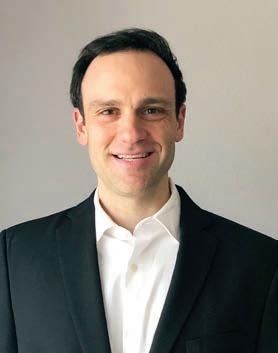 MICHAEL LIPKIN CEO
Assembled Brands
MICHAEL LIPKIN CEO
Assembled Brands
How do you define a good leader?
Michael currently lives in Los Angeles with his wife and two kids, ages 5 and under. He has a bachelor’s degree in finance from Tulane University and is an avid Lakers fan. In his free time, Michael enjoys traveling and spending time with his family.
I’ve been fortunate to work with several strong leaders during my career, including many great board members at Assembled Brands.
In my opinion, a good leader first and foremost has humility. They will not only give credit where it is due, but also take ownership of their own mistakes. Good leaders will provide a clear blueprint with results that will allow their team to find success. They are aware of their own strengths and weaknesses, and are not afraid to surround themselves with people that will provide the pieces necessary to achieve the desired outcome.
Good leaders are active listeners who provide guidance and set an example through their own work ethic. However, they will also enable individuals to figure out the best way to achieve the necessary result. Empowering people to become strategic thinkers is core to developing talent, and a good leader will actively delegate decision making and provide timely feedback to ensure that everyone stays on track.
Over the years I have developed a few of my own organizational best practices. Each week I create a new Google Doc with the high-level items I want to tackle by department, such as Pipeline, Finance, Admin, etc. Each department will have a few bullet points that serve as a guideline for the week. In addition, I’m a big fan of the “mark as unread” feature in my inbox. With a steady stream of emails, I use this tool to serve as a reminder of open items during the week. So, when I see anything in bold as unread, I know it still needs my attention.
What would you say to anyone considering a career in secured finance?
Secured finance is so much more than it appears to be. I’ve been fortunate enough to have worked in the industry throughout my career and have experienced everything from walking the floor of a tuna manufacturer’s facility, to sitting in a helicopter bound for the king of a foreign country. Use your unique experiences to think creatively and solve complex problems, whether that’s structuring a bespoke facility, or working through a tough credit.
Lastly, and most importantly, take the time to build trust and create long-lasting relationships. Regardless of where you are in your organization, if you treat your clients and colleagues with respect, you will build trust, and that will ultimately come across to both internal as well as external stakeholders. At the end of the day, this industry heavily revolves around people.
What advice would you give on how to self-advocate?
I am not a big fan of workplace politics, but rather prefer to let one’s work speak for itself. Openly raise your hand for those tough assignments and put in the time to show that you are capable of guiding the decision-making process. Ask thoughtful questions to show that you are invested in the outcome of the project. Not only will you gain a ton of knowledge, but you’ll also stand out and be remembered for driving the outcome.
Ashley originally started as an intern (the company’s first ever!) at Express Trade Capital, Inc. (ETC) back in 2011 while finishing her studies at Sacred Heart University in Fairfield, CT. Her major in accounting with a concentration in fashion lead her to find her perfect fit with Express, a working capital provider with a clientele heavily focused in the apparel industry. Over time, as Ashley’s personal passions started to shift from fashion to wellness, this shift translated to her efforts at ETC as well. She is now vice president and head of Express Trade Capital’s food & beverage division of clientele, comprised of companies making better-for-you consumer goods in the health & wellness space. In Ashley’s free time you can find her meditating, walking out in nature, or cooking up her favorite veggie-centered meal.

With many working remotely or hybrid the past few years, how can young professionals be sure to “stand out from the crowd” with upper management?
This might not be the answer that young professionals may expect or want to hear, but setting strict boundaries for yourself with social media (or even doing away with it all together) will have a huge positive impact on your outputs. Taking into consideration the times we’re currently in, with it becoming quite socially acceptable to be glued to our personal devices, this alone will immediately set you apart from the crowd. Your focus will improve, you will have more time in the day, and you will feel less overwhelmed and scattered as a whole. Look at it as an opportunity to prove to yourself that you are capable of setting boundaries and as a tool to improve your willpower. In time, it will be undoubtedly clear to upper management that you are doing something differently than your peers.
Then, of course, the usual tips you may expect, like getting your tasks done in a timely matter, being quick to reply to emails, and keeping distractions as minimal as possible. But all of these will effortlessly come as a result of successfully implementing tip #1.
I’ve been working remotely since before it really gained the spotlight, and I’ve found that having a dedicated workspace where my brain knows that it’s time to be in full work-mode is essential. (It works on the flipside, too, for letting your brain know that it’s time to be in life-mode once work is over and you exit that space).
Finally, I find having some coffee shop jazz playing as background music while I work sets me up for a peaceful and successful day. It’s a small, but mighty, gamechanger!
How would you encourage young professionals to become more involved in their community or volunteer? How have these activities outside of work helped shape your professional life?
Let what genuinely makes you feel fulfilled guide you. You might have a special place in your heart for helping animals, while somebody else may feel a special calling with the elderly. Follow what comes naturally to you and you might just find a way to synergistically blend this passion into what you do professionally! I believe that is the ultimate goal and what truly has the power to keep the wind in our sails long term. I’m grateful every day that I found a way to do that at Express and for the willingness and support I received from the ETC team along the way.
For me, the synergy was characterized by actively facilitating the expansion of our portfolio of clientele to include companies in the health and wellness space. This includes manufacturers of better-for-you food & beverage options that you see on the shelves at your local natural supermarket, including those with more sustainable packaging options, organic ingredients, and plant-based offerings. It’s fulfilling to know that we are not only helping small entrepreneurs get their ideas out there into the world, but we are simultaneously helping to get more beneficial options on the shelves for people, the animals, and the Earth. All the while, allowing me to check all of my passion boxes!
Ultimately, this blending of passion with profession will look unique for everybody, but living and breathing what naturally calls to you is the best way to allow the path to reveal itself to you. Keep yourself open to the possibilities, get creative, and don’t be afraid to push the envelope a bit against what has always been done.
George Vartanov is a director with SLR Credit Solutions (formerly known as Crystal Financial). His responsibilities include underwriting and structuring asset-based and cash flow loans, as well as portfolio management for existing investments.
Prior to joining SLR Credit Solutions, George was in the technology finance group at Wells Fargo Capital Finance where he specialized in lending to enterprise software companies in the US, Canada, and the UK. George began his career in the leveraged finance group at New Star Financial (n/k/a First Eagle Private Credit), where he was responsible for underwriting and portfolio management of cash flow loans to middle market companies across numerous industries.
George received his Bachelor of Science in corporate finance and accounting from Bentley University. He was born in Kyiv, Ukraine and currently lives in the Charlestown neighborhood of Boston with his wife, Kaitlyn, with whom he enjoys traveling both domestically and internationally.
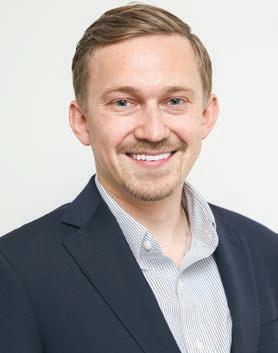
What is the best professional advice you have been given and how have you implemented it?
Over the course of my education and career, I have been fortunate to have many mentors and sources of professional guidance. However, the best advice that I have been given is to be honest and not fear taking chances. A significant application of this advice was when I transitioned to my current role at SLR Credit Solutions.
Prior to this position, I had solely focused on cash flow loans and lacked exposure to anything related to asset-based lending. I recall this was a specific point during my interviews, and when asked about my experience in this area, I answered candidly, sharing that while I had never reviewed a borrowing base or evaluated an assetbased transaction in my career, I would welcome the opportunity to learn and master it. The response was well respected, and upon my hiring, I leaned into working outside of my comfort zone and expanding my knowledge. So just as much as SLR trusted that I could get up to speed quickly, I took a chance that I could meet that challenge.
When I joined the firm in March of 2020, the COVID-19 pandemic had just started shutting businesses down across the U.S. and Canada and, needless to say, I got up-to-speed very quickly on all things borrowing bases, liquidation values, and managing liquidity.
How would you encourage young professionals to become more involved in their community or volunteer? How have these activities outside of work helped shape your professional life?
When looking for ways to get more involved in the community, I have found that the best approach is to seek out an organization that sparks your interest. Most of us have completed various one-off volunteer opportunities for different causes over the years. However, I believe the most impactful opportunities are those where you are
invested in the long-term success of the program.
A community organization that I am invested in and actively involved with is BUILD Boston. BUILD helps partner students from Boston Public Schools with mentors from various Boston-based businesses to teach entrepreneurial skills. Students develop a real business plan and create a product which they ultimately make and sell with guidance from mentors.
Volunteering in this capacity has taught me how meaningful my encouragement and guidance can be to these students. It has also helped me to think creatively and have an open mind, while finding unique ways to support different individuals.
are your secrets to staying organized?
Staying organized can be a struggle for many, but I have found the approach that works best for me. I take advantage of skills that I have developed professionally from day-to-day work and apply them to keep myself organized and keep my priorities clear. For example, using the skills I’ve learned from building out financial models, I’ve created Excel workbooks that I can quickly pull up to help me track various day-to-day tasks. This has allowed me to track reporting deliverables from borrowers and stay on top of post-closing items, which often get forgotten about if not meticulously tracked.
While Excel may be my go-to skill to help me stay organized, everyone needs to find an approach that works for them. I’ve seen others utilize OneNote, Outlook formulas, and various other systems. My wife, who is also in the finance profession, instead prefers the old-school approach of putting pen to paper. She always has a small Moleskin notebook on her (and several larger ones scattered around our home). While it may not be the most efficient method, it works for her to stay organized.

























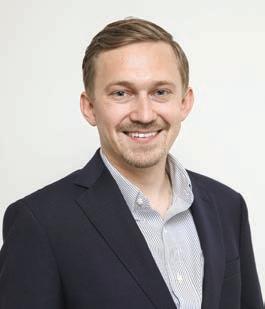
Brendan Hogan is a senior relationship manager in the Retail Finance Division of Wells Fargo Capital Finance. He is responsible for managing a portfolio of asset-based credit facilities to large corporate and middle market retailers across North America, overseeing $1.5 billion in direct bank commitments. Brendan has experience working closely with C-level management and private equity firms to support his customers through all stages of the credit cycle.
Brendan joined Wells Fargo in 2015 and prior to becoming a relationship manager in 2018, he held various positions within originations & underwriting. Brendan also spent time working directly with the Junior Capital Division, focused on providing second lien and stretch term loans to select clients. Brendan is particularly proud of the work he does in support of Wells Fargo’s annual sponsorship of the Boston Children’s Hospital Corporate Cup.
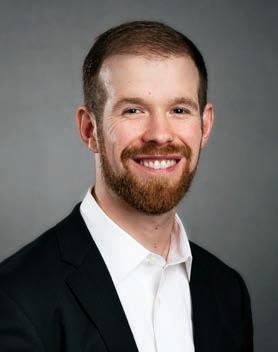
In his spare time, Brendan enjoys golfing and spending time in Maine with his family. Brendan graduated magna cum laude from Bentley University. He resides in Lynnfield, MA with his wife, Stephanie, and dog, Masie.
What is the best professional advice you have been given and how have you implemented it?
The best professional advice I have been given is to show up with an opinion – whether for a client meeting, internal conversation, or discussion with your boss. As a natural introvert, networking and self-advocacy has always been a challenge for me. I am thankful for the persistence of my mentors who pushed me to attend industry events, network outside of my direct line of business, and focus on defining my career goals. While this has served me well in several areas, it has been most impactful for my career development. I’ve benefited from many great advocates, both internally and externally, and have found that everyone is willing to help, but they can’t read your mind. Seeking advice about specific challenges and career goals allows mentors to provide guidance to help craft the best path forward and achieve the desired outcome together.
This same concept can be applied to client relationships. Showing up to a client meeting with a thoughtful solution, or list of options, not only best serves the client’s needs but also shows a thoughtful and collaborative approach to the relationship. After hearing the client’s view of a given situation, presenting your own recommendation will position you as a trusted advisor, likely resulting in a more successful outcome that may not have been achieved otherwise.
How do you define a good leader?
A good leader inspires, collaborates, listens to feedback, and knows the strengths of each team member. The most effective leaders assemble teams with diverse skill sets and experiences that complement one another. He or she will leverage these backgrounds to position each team member for success and utilize their strengths to build a stronger team. One cannot lead without transparency and communication; honest and frequent feedback allows for
development and growth for both the leader and team member. The best leaders I have worked with are the best advocates. They fight for their team members, and by doing so foster an inclusive environment built on respect and trust.
I have been fortunate to have so many great mentors throughout my career. From the very beginning, when I was an intern for Wells Fargo in 2013, I have had senior team members to confide in both personally and professionally. These mentors have helped guide me through difficult career decisions and, even more importantly, turned into my strongest sponsors. My mentors have taught me the importance of patience, honesty, and not being afraid to speak my mind.
I have learned that my role as a mentee is equally as important; everyone is willing to provide advice, but no one is going to do the work for you. I’ve continued to foster these relationships by taking ownership of them and showing up with intention and preparation. My ability to leverage the experience of my mentors has been impactful for my career growth. Through this experience, I have gained an appreciation for the importance of mentorship and have focused on coaching others to help them develop in their careers.
Wells Fargo congratulates our own Brendan Hogan for being named to Secured Finance Network’s “40 under 40” list for 2023. We celebrate Brendan, and all of the winners, for their leadership, passion, and dedication to helping commercial customers grow and thrive.
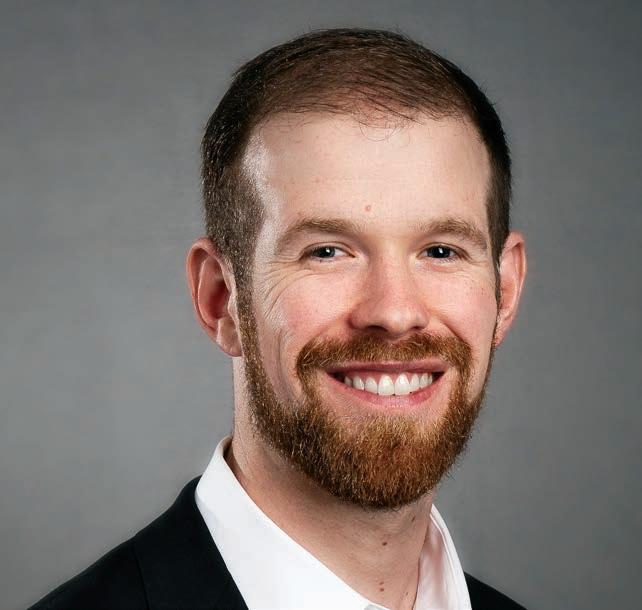
“Brendan focuses on delivering exceptional customer service and advice to his clients each and every da y, making him an important and vital asset to the company. His strong credit skills and attention to detail in a compliance-oriented environment, allow him to proactively manage risk while consistently providing strategic comprehensive solutions to meet his clients’ banking needs. He also understands the importance of people as a competitive advantage, and he’s proven to be an impactful mentor for many Wells Fargo team members over the years. I’m very proud of Brendan’s many achievements and he’s truly deserving of this industry wide recognition as one of the SFNet’s 40 Under 40 winners for 2023 ”
-Danielle Baldinelli, Managing Director Wells Fargo Capital FinanceEthan Rosenblum is a senior vice president of White Oak Commercial Finance, LLC (“WOCF”), where he is responsible for originating, underwriting, and servicing asset-based lending and factoring opportunities. His duties include managing a portfolio of complex credits and large exposures, working collaboratively with key executives to provide effective working-capital solutions and excellent customer service while upholding the security interests of WOCF.
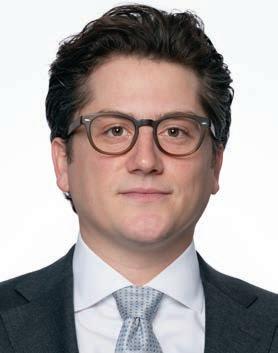
Prior to joining WOCF in 2018, Ethan was an account executive at both Hana Financial, Inc. and Versant Funding LLC, where his responsibilities included underwriting and servicing new and existing portfolio loans.
Ethan graduated with a B.A. from the University of Maryland in 2013. He currently resides in New York City with his wife, Arianna, and they are expecting their first child this fall.
How do you define a good leader?
A good leader is someone who is able to make informed decisions, and to communicate those decisions effectively, while adapting to varying circumstances required to recognize and maximize the strengths and minimize the weaknesses of their team members, all the while assisting them to achieve their potential. More than anything, a good leader leads by the example he or she sets: treating clients and business competitors, colleagues, team members and support staff, from top to bottom, alike, with the same approachability, friendliness, dignity and respect to create a positive culture to best enable their team to succeed.
What role has mentorship played in your career?
I am lucky to have had several great mentors early in my career. In their own ways, each has provided guidance, support and feedback to help me grow and achieve my professional goals. By generously sharing their wise counsel and experience, I have been able avoid mistakes that they learned the hard way. By challenging me to think outside the box, I have enhanced my problem-solving skills and my ability to negotiate. By offering their insight, I have been able to obtain a unique perspective. By taking me under their wings, I have been able to gain exposure to new opportunities and build strong relationships. Mentorship has been vital in my career, and I am grateful for the exceptional mentors I have had the pleasure of working with.
What is the best professional advice you have been given and how have you implemented it?
It’s nearly impossible to boil down the best professional advice I have been given into just a short paragraph, but if I had to, it would be something that rings true in my personal life as well. People remember how you make them feel. I’ve learned that every lender’s money is green so what differentiates me? Pricing, structure, speed, flexibility – these are the obvious examples, but they can change with market conditions and other existential factors. Relationships matter and it all comes back to humanity. While numbers are the bottom line in the secured lending industry, there is always another person on the other end of the check. Relationship building and client service are of the utmost importance and leaving a counterparty with the feeling of comfort and security, both financial and personal, goes a long way. I can’t always accommodate a client or a potential business partner, but I can always treat people with kindness and thoughtfulness and make them feel appreciated and respected, whether my message is positive or not. People walk away from every encounter with a feeling and by being mindful of that feeling, strong relationships can be maintained and future relationships built.















































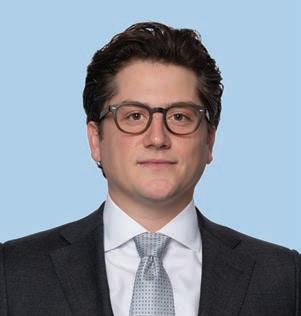
Kate Dorrlacombe is the senior vice president and head of underwriting at SLR Digital Finance, a division of SLR Business Credit. Kate graduated from the University of Iowa with bachelor’s degrees in finance and entrepreneurial management and a minor in Spanish. She previously worked as a financial analyst at IBM, Disney, and Wells Fargo. Kate built a lot of her credit foundation through Wells Fargo’s commercial banking credit training program. She joined Fast Pay, subsequently acquired by SLR Business Credit, as an underwriter in 2015 and quickly rose in the ranks to become the manager and lead a team of new business underwriters. Kate was raised in a big family with seven siblings and several extended family members under one roof, and family is the most important part of her life. She lives in Santa Monica, California with her dog, Lennon, and visits Iowa frequently to spend as much time with family as possible. In her free time, Kate enjoys volunteering for the Special Olympics and with youth in foster care and fostering rescue dogs.
What would you say to anyone considering a career in secured finance?
A career in secured finance is one of the best ways to become well rounded on aspects of how successful entrepreneurs run their businesses! If you have an entrepreneurial mindset, I encourage you to consider secured finance as a career as you are offered a holistic view of many businesses in various stages of their lifecycles and are comparing data and information about a wide range of companies in different sectors. Most importantly, you get to speak with seasoned ownership and management teams and learn from the experts themselves.
How would you encourage young professionals to become more involved in their community or volunteer? How have these activities outside of work helped shape your professional life?
Consider joining an organization with other like-minded, yet diverse, individuals! I met many of my closest friends through the Association of Junior Leagues International as the members were in similar places in their lives and careers where they wanted to enhance their own leadership skills and give back to the community. Although this organization is not specifically focused on individual career development, it has directly benefited my professional life through educational workshops, leadership development training, leading volunteer programs with community-based partners, developing and hosting fundraising activities, networking with community leaders, and building a strong support system of like-minded peers with diverse backgrounds.
What advice would you give on how to self-advocate?
Someone once told me to treat yourself like a business, and that’s been a very positive way of framing my mindset to advocate for myself
and for my company. In credit and underwriting, we do our best to stay objective about the facts and present the best recommendation for the company. In reframing your mindset about yourself this way, you focus on positive outcomes for the greater good. For example, if I were to selfadvocate for enhanced responsibilities for a promotion, I would present the information to show how it would benefit my company versus how it would make me feel or any other subjective or emotional reason. I would present my ask by showing how it will reduce risk, save money, or increase sales for the group, and ultimately serve as a win-win for everyone. Being able to tie your asks to broader-serving outcomes that benefit the business is an easy way to advocate for yourself.
With many working remotely or hybrid the past few years, how can young professionals be sure to “stand out from the crowd” with upper management?
In my opinion, doing what is asked of you is just a fraction of the job! The best team members take initiative to seek out projects on top of their typical day-to-day tasks. For example, if you notice something isn’t done efficiently, or there’s a better program or more cost-effective solution, or a way to improve the customer experience, bring those ideas to management and offer potential solutions. It can be very easy to fall into the routine of simply completing your daily tasks, but in order for the company to stay relevant and achieve economies of scale, every team member should be thinking outside the box and volunteering a little more than is asked of them. As it pertains specifically to remote and hybrid work, I encourage employees to stay in front of teammates, customers, channel partners, and management, whether that be attending networking events, utilizing video calls and phone over email when possible, and even coming up with unique ways to unite the team such as video-based teambuilding activities.
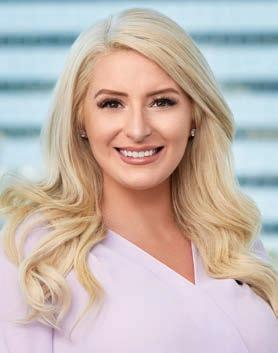
SLR DIGITAL FINANCE is proud that our team member has been selected as a 40 Under 40 winner.
Kate plays a vital role in our company and we look forward to her contributing for many years. Our best wishes to all 40 Under 40 recipients.
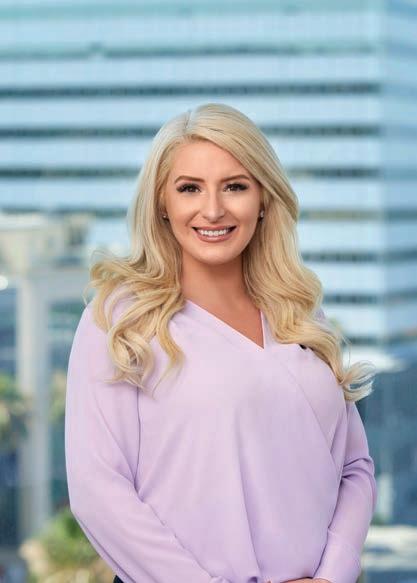
Fahad Haroon is currently a managing director, underwriting manager, within the Channel Finance group of Wells Fargo Distribution Finance. Fahad has spent majority of his career underwriting and managing direct and syndicated credit solutions for private and public companies. Currently, he leads a team of underwriters responsible for underwriting new and existing asset-based and channel finance transactions for a global customer base within the technology sector. Prior to joining Wells Fargo in 2016, Fahad spent eight years at GE Capital in various roles centered around asset-based lending, which included operations, field exam, relationship management and underwriting. Fahad resides in the Chicago suburbs with his wife, their three children and his mom. Outside of work, he enjoys spending time with friends and family, traveling, trying new foods and staying active.
FAHAD HAROON Managing Director, Underwriting Manager Wells Fargo Distribution Finance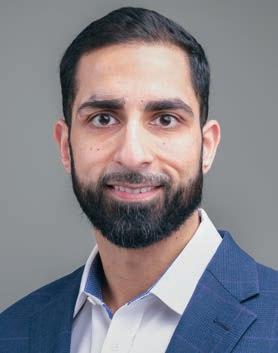
How do you define a good leader?
I think good leaders have a combination of qualities that make them successful leaders, but these combinations don’t always have to be the same. In my opinion, a good leader is a teacher and student simultaneously, a strong communicator (this includes listening!), someone who empowers everyone on the team to achieve collective and individual goals while leading with respect, empathy and humility, and one who exhibits a strong work ethic.
I’ve been fortunate to work for, and with, phenomenal leaders both in my past and current roles and I try to emulate strengths I see within these leaders as I continue to improve my leadership skills.
With many working remotely or hybrid the past few years, how can young professionals be sure to “stand out from the crowd” with upper management?
The best thing young professionals can do for their career is to be visible – and this applies to anyone, whether they are remote, hybrid or 100% in-person. The minimum requirement for a productive career is simply to be present and complete day-to-day tasks successfully. However, to set yourself apart, there are two key pieces of advice I’d give:
(1) Network, network, network and maintain relationships! I did not appreciate the value of this when I started my career, but value it so much more now – having mentors, sponsors, and peers who you can reach out to as needed is so important. I’ve really focused on this in the last several years and wish I had made it a higher priority earlier on in my career. You can’t replace the value of guidance and advice from successful individuals who’ve been where you are or where you are trying to go. Lending is a relationship-centric business and being able to build and maintain
relationships with partners, internally and externally, is key to differentiation.
(2) Volunteer for special projects that expose you to broader learnings, different business units and leadership. This is a great way to learn something new, be exposed to different teams and/or leadership and may also lead you to expand your own interests.
Outside of the advice above, your reputation is just as important and will help you stand out from the crowd– this includes your work ethic, attitude, approach to problems and change, curiosity, resourcefulness, and communication.
What would you say to anyone considering a career in secured finance?
A career in secured finance puts individuals at the center of solutions that contribute to the broader economy. It’s a field with phenomenal opportunity to continuously learn, grow and develop long-term relationships. Secured finance has a wide variety of opportunities for a long-term career that allows anyone the ability to find “the” job and organization that aligns with their personal and professional interests. Coming out of college, I was focused on joining a company with a strong reputation for growth and development, but was not aware of the endless possibilities within secured finance. I’m confident anyone who joins secured finance will find a role that they truly enjoy and, more importantly, a great team and individuals with whom they enjoy working.
Wells Fargo congratulates our own Fahad Haroon for being named to Secured Finance Network’s “40 under 40” list for 2023. We celebrate Fahad and all of the winners, for their leadership, passion, and dedication to helping commercial customers grow and thrive.
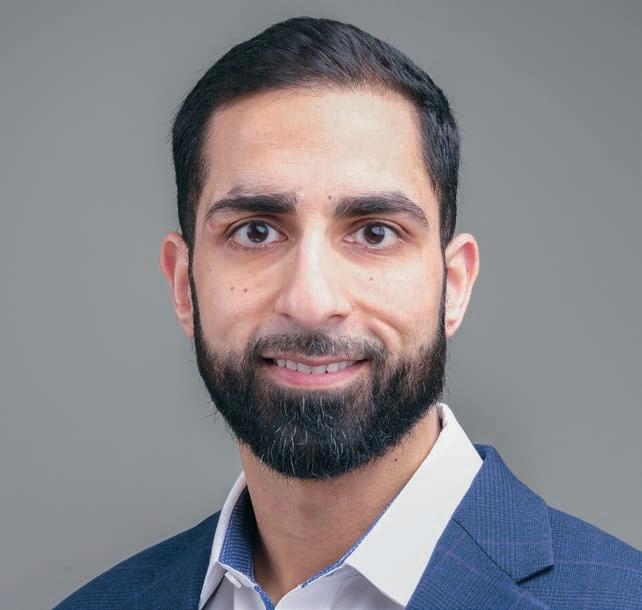
“Fahad’s leadership, credit acumen and work ethic drives his consistent high performance. Fahad partners with clients and internal stakeholders to deliver financing solutions that meet client needs while managing the firm’s risk. His ability to thoughtfully balance client goals and key stakeholder perspectives while leveraging his subject matter expertise has made him very successful in executing effectively and efficiently. Furthermore, he’s a talented manager and mentor who’s earned the respect of numerous team members across Wells Fargo. I’m extremely proud of Fahad’s accomplishments and the recognition by SFNet as one of the 40 Under 40 winners for 2023.”
-Jack Morrone, Managing Director, Head of Portfolio Management and Underwriting, Wells Fargo Channel Finance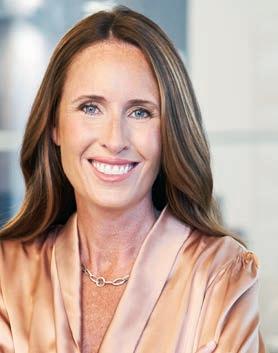 BY MICHELE OCEJO
BY MICHELE OCEJO
On March 8, International Women’s Day, SFNet president and former CEO of Gerber Finance and eCapital ABL, Jennifer Palmer announced the formation of JPalmer Collective. The asset-based lending firm will provide customized financing solutions with whiteglove, consultative services designed to help businesses grow sustainably and founders to retain their equity.
The company will specialize focus on highgrowth businesses that do not fit traditional lenders’ criteria, including women-led companies and consumer brands focused on conscious consumers, sustainability and inclusivity.
With 17 years of experience in the commercial finance industry, Palmer has helped fund the growth of many beloved and successful women-led and natural products brands, including Stasher, Baby Gourmet and Coola. She is joined by Melissa Fleishman as COO, a finance veteran with 25 years of asset-based lending expertise recognized as a distinguished leader in the industry by the Secured Finance Network, and Laura Newman as CFO, a CPA who has spent her career in the accounting and financial services industries on Wall Street and in Big 4 accounting.
JPalmer Collective is an asset-based lending firm empowering consumer brands with customized financial solutions that fuel sustainable growth. We have a team of finance experts and partnerships with lenders with industry-specific interests, guaranteeing tailored solutions that supercharge success. In line with my personal passion, JPalmer was born to help level the playing field and make financing more inclusive; we’ve
committed that at least 51% of our portfolio will be women-led companies. Additionally, we focus on businesses reaching the conscious consumer and that emphasize sustainability and inclusivity.
You mentioned the company has a special focus on getting capital to women-led businesses and I know you also focus on those who serve the “conscious” consumer. Why is that so important, and what is the upside from a business standpoint?
There is a gender financing gap - it’s been shown time and time again that women have less access to capital than men. Almost three quarters of female entrepreneurs say they’ve experienced difficulty securing funding. Studies have shown that women are less likely to be approved for loans than men — just 32% of women who apply for business funds are approved. And women who do receive loans get a loan that’s an average of 33% smaller than their male counterparts. Gender stereotypes often paint women as high-risk with less experience or less financial stability. However, in reality, funding women-led businesses makes business sense. Startups led by women return 78 cents for every dollar invested vs. 31 cents for those founded by men! As a purpose-driven company, JPalmer is also focused on representing entrepreneurs who are improving our world in a sustainable way. Again, this is not only the right thing to do, it also makes business sense. According to a study by MSCI Research, companies with strong environmental, social, and governance (ESG) performance had higher profitability and lower volatility compared to their peers; companies with high ESG ratings had an average return on equity of 10.1%, compared to 7.4% for companies with low ESG ratings. And, consumers increasingly choose sustainable companies. A survey by Nielsen found that 73% of consumers said they would definitely or probably change their consumption habits to reduce their impact on the environment. This trend is particularly strong among younger consumers: a survey by Accenture found that 72% of Gen Z consumers and 69% of Millennial consumers were willing to pay more for sustainable products.
You were a part of the SFNet 40 Under 40 inaugural class. What did winning this award mean to you, and what effect did it have on your career?
The award was such an honor and a stepping stone in my leadership journey within my company and the industry. The recognition launched opportunities on SFNet committees, connected me with other exceptional leaders and opened doors for me that would not have been accessible without this recognition.
What do you see as the biggest challenges and opportunities for nonbank lenders right now?
As banks tighten their requirements and have to shed assets, there is an opportunity for nonbank lenders to grow their portfolios. During recessions, institutional banks reduce lending to small businesses and do not return to pre-recession levels for several years. That, coupled with the increased need from borrowers for access to working capital in a downturn, creates an ideal environment for nonbank lenders. The challenge is that small- and mediumsized businesses will experience cash flow and liquidity challenges, which will create additional risk for lenders and, in some cases, may back lenders into an unforeseen overadvance position. In challenging times, we see the occurrences of defaults and frauds increase thus we must ensure that we improve and augment our monitoring procedures to detect early signs of trouble.
What advice would you offer to our new class of 40U40 winners?
First of all, congrats! This recognition is well-deserved and will open so many doors for you. I would tell all of them to use this as an opportunity to continue to build their reputation in the industry and leverage the recognition to connect with not only one another, but other leaders in the industry. And I would ask these leaders to mentor others in the profession - speak at your alma mater through SFNet’s guest lecture program, and work with young team members in your company and in the organization. It’s key to the growth of our industry that we
attract and retain young professionals.

Tell us one thing about yourself that may surprise people. I am a naturally shy person. Through my years in this industry serving on various SFNet committees, I have grown in many ways and stepped outside my comfort zone, which has helped me tackle this. In fact, the first panel I ever spoke at, the organizer (Stewart Hayes of Wells Fargo) had to work hard to convince me to participate. Since then, I cannot count how many panels I have been on, which has helped myself as well as my employers. I learned it’s vital to push beyond your comfort zone, try new things and just say yes. I have also learned to follow in Stewart’s footsteps and help encourage others to step forward.
Michele Ocejo is editorin-chief of The Secured Lender and director of communications for SFNet.As a purpose-driven company, JPalmer is also focused on representing entrepreneurs who are improving our world in a sustainable way. Again, this is not only the right thing to do, it also makes business sense.





 BY EILEEN WUBBE
BY EILEEN WUBBE

From promotions to new jobs, award winners share their career advice for the class of 2023 winners and what they have learned.

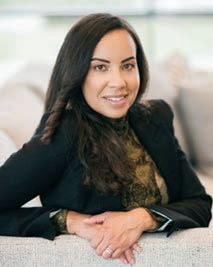
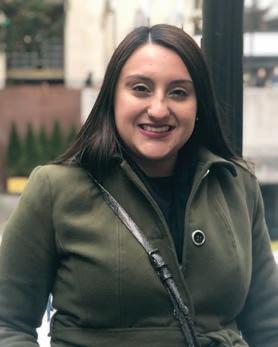
Did receiving the SFNet 40 Under 40 Award affect your career?
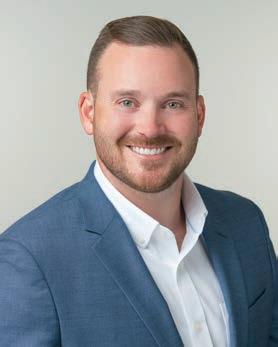
Receiving the SFNet 40 Under 40 award was such a rewarding experience. It not only helped serve as a reaffirmation of the value I was bringing to the company, but also made me feel like I was a valued part of the team. It was great to be able to put that award on my resume, and to share it on my LinkedIn profile. I was able to connect with a lot of people I hadn’t spoken with in a while, who reached out to congratulate me. I was also able to expand my network and build new connections with some of the other 40 Under 40 winners.
Since winning, you have moved on to Cost Reduction Solutions. How are you enjoying your new role as senior field examiner?
I am greatly enjoying my new role at Cost Reduction Solutions (CRS). Although I was already a senior field examiner in my prior role, at CRS, being a senior field examiner is a little different, in that instead of working with just one lender, I now work with several lenders. It can be a little daunting at times, but overall, it has been a great experience and a learning opportunity. I will forever be grateful to the team at SLR, and for the skillset I was able to develop there. I am excited to be able to bring that skillset, enhance it, and share it with my new team at CRS.

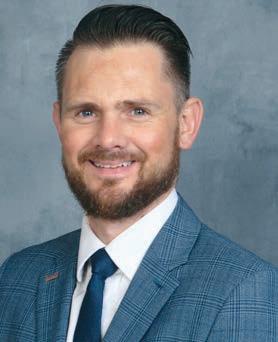
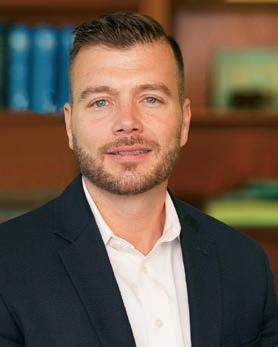
In your opinion, how can young professionals build their brand and recognition in this industry? Young professionals can build their brand and recognition in this industry by doing three things.
1) Showing up every day with an optimistic and cando attitude. People enjoy being around optimistic people a lot more than they do being around pessimistic people.
2) Making an intentional effort to connect with others in their company, industry and community. keeping in my mind that, intentional does not equal formal. Some of the best conversations I have had in my career have been informal and on the fly. However, I will say it does not hurt to be prepared. One of my favorite quotes is, “Luck is what happens when preparation meets opportunity.”
3) Not being afraid to ask questions. One of the most difficult barriers for me to overcome was thinking that I should know all of the answers, or
at a minimum, I should know where to find the answer, without having to ask someone for help. This can quickly become a draining and time-consuming process. And as I’ve come to realize over the years, it does not get easier than reaching out someone and asking for their input. In my experience, people are always willing to help, and if they don’t know the answer you are looking for, they will point you in the direction of someone who does.
ROSENTHAL & ROSENTHAL
2021 WINNER
Did being a recipient of an SFNet 40U40 Award affect your career?

I feel very honored to have received the SFNet 40 Under 40 award in 2021. Being recognized by my peers as one of the top performing young professionals in the secured finance industry, was a great accomplishment. It validated my passion and commitment to the industry and the clients we serve. Receiving an award from such a well-known and respected organization like SFNet, was invaluable to furthering my career and reconnecting me with some old friends in our industry.
You joined Rosenthal & Rosenthal in March. Congrats! What does your new role entail? What do you like about it so far?
I am thrilled to have joined Rosenthal & Rosenthal as portfolio manager of its recently launched Recourse Factoring Division. Alongside Leigh Lones, our director of Recourse Factoring, I will be focused on building and managing a book of business that services wholesale distributors, manufactures, and services companies.
What attracted me to Rosenthal is their reputation and track record in the market and their 85+ year standing as a privately held family business. Rosenthal’s flexible and competitive financing solutions provide the opportunity to be a true financing partner to its clients, and that is what excites
me most about the opportunity. Rosenthal has a unique suite of product offerings (asset-based lending, PO financing, non-recourse, recourse, international factoring, and D2C & ecommerce inventory lending) providing one-stop-solutions for working capital needs at all stages.
In your opinion, how can young professionals build their brand and recognition in this industry?
Network – attend in-person industry conferences and events when possible, connect with professionals on social media platforms, and join industry associations and local chapters to build your network.
Improve your knowledge and skillsets – continue to learn and develop your skills through courses, seminars, and on-thejob training, which will help you stand out and gain the respect of your colleagues.
Be ethical – Build a reputation for integrity and ethical conduct, which will help you gain the trust and respect of your clients, colleagues and the industry as a whole.
What advice would you give on meeting people and networking in this industry?
Make your rounds!
You don’t have to be everything to everybody but work the room a bit. We are all guilty of staying in our little clique, catching up with old buddies/colleagues, and just staying comfortable. Just mix it up a bit!
How can young professionals stand out, especially now as remote and/or hybrid work arrangements are the norm?
Remote and hybrid work models have become more and more common in today’s workforce. With this comes challenges for YoPros to maintain relationships and stand out. Even in a remote or hybrid work environment, building in-person relationships with colleagues and clients is essential. I also
Receiving the SFNet 40 Under 40 award had a profound impact on my life both personally and professionally. I immediately felt compelled to utilize winning as an opportunity to pay it forward. I dedicated more time to other organizations including the SFNet. In fact, when asked to serve as a 40 Under 40 judge for two consecutive years, I immediately accepted the opportunity.
take advantage of virtual networking opportunities, participate in teambuilding activities, and always seek out mentorship from veterans in the industry. This helps me stay engaged with my colleagues and clients even in a remote setting.
It is also important to be proactive and take the initiative to seek out new projects or tasks, ask for feedback, and take steps to improve your skills. Find a good mentor and show that you are willing and able to go above and beyond; this will differentiate you from your peers and stand out as a valuable asset to your organization.
What advice would you give to recent grads or entrants in this industry?
The ABL and factoring industry is a very small market. Everyone knows everyone! So, first and foremost, get out there and network. Join your local chapters, participate in virtual training opportunities, seek mentorship, and lastly, be yourself and you will be sure to fit in!
2018 WINNER
What changed for you professionally after receiving the Award?
Receiving the SFNet 40 Under 40 Award had a profound impact on my life both personally and professionally. I immediately felt compelled to utilize winning as an opportunity to pay it forward. I dedicated more time to other organizations including the SFNet. In fact, when asked to serve as a 40 Under 40 judge for two consecutive years, I immediately accepted the opportunity. I continued to seek leadership roles and graciously accepted the opportunity to serve as this year’s 40 Under 40 Awards Chair.
Did receiving the 40 Under 40 award encourage you to become involved in additional professional or community activities or organizations?
I found broader ways to give my time and reframed and joined the SFNet’s Diversity Equity and Inclusion Committee. I am deeply passionate about mentorship. So, I rewrote the SFNet’s Mentorship Program, which successfully launched in Spring 2022 with over 40 total mentees and mentors across the United States. The next iteration is in progress now. I recently joined the TMA board and serve on the Network of Women Committee. I have approached my career modestly over the years. However, to be modest is not to dismiss the opportunity to guide others to a path of success. I quickly learned the 40 Under 40 Award was very much a torch for recognition that needed to be passed. While the recognition is nice, it can and should be used as a steppingstone for those seeking to advance in their careers. Five years have passed since I won. After 10 years with my previous firm, I accepted a new role as director of business development for Chiron Financial. I took
a leap of faith and chose to advance in my career, and it has been such a great experience! Every day, I am thankful for my family, friends, and, lastly, winning and achieving such an award. It has propelled me to new heights in my career and has opened a new pathway to opportunity in the investment banking space, a path that I didn’t see five years ago. I am thankful for such a great opportunity.
Networking is one of the most vital factors to having a successful career. However, my definition of networking is a little different. In fact, I see networking as being a useful resource to my industry friends, referral sources, and organizations to which I belong. When I walk into a room, meet over Zoom, or have a lunch meeting, I always try to find ways to be a center of influence, someone that can provide additional resources, advice, and meaningful introductions. Once you see yourself as a resource and a source of support, you begin to enhance and deepen your connections. There are many ways to be a resource to others. Promote and recommend your connections to others within your network even when you may not have a direct or an immediate need for their services. Advocacy opens doors and ironically leads to opportunities you least expect. There are several other abstract ways to network. For instance, if you have strong oratory skills, volunteer as a subject matter expert as a panelist for an organization in which you belong. This provides an opportunity for people to get to see you in action! Thus, many will naturally reach out to you. If you like writing and enjoy sharing information, find an industry publication and submit an article. While it can take a little time to write, your expertise is invaluable, and many will find your contribution helpful. Grab lunch with more than one person. Find a group of people that share similar interests and invite them to lunch. This is a great way to be a connector while deepening relationships. Take the process of networking personal. Many of the people you meet will become your greatest supporters, so spend your time wisely. Truly get to know what they do and share your expertise with them. Beyond showing up in several different rooms several times a week, find ways to pace yourself. While conferences and events are a great way to engage with others and learn industry specific news, sometimes deepening is a challenge. In summary, you are valuable and so is your time. Networking comes in many different forms and many approaches. Find the approach that works for you, and you will be successful in building a great network!
BRAD ROSENTHAL
PNC CAPITAL MARKETS, MANAGING DIRECTOR
2017 WINNER
Did receiving the SFNet 40 Under 40 Award affect your career? If so, how?
Receiving SFNet’s 40 Under 40 Award has provided me with confidence in my career growth and a sense of industry
validation for PNC’s achievements in the secured lending industry. During my tenure in our New York City office from 2011-2014, I had the privilege of enhancing my network with ABL professionals through SFNet industry events. The industry events are a good tool for debt capital markets professionals to expand their investor universe for syndicate bank partnerships.
Did receiving the 40 Under 40 Award encourage you to become involved in additional professional or community activities or organizations?
My manager at the time nominated me for the award. He played a critical mentorship role in my career development from building my technical (deal-related) skills to expanding my network of ABL banking professionals. After receiving the award, many industry stakeholders began to contact me. So, this recognition gave me the opportunity to expand my network and form many relationships, which I value today. Additionally, a number of PNC’s early career bankers with diverse backgrounds expressed interest in becoming more involved in the SFNet. I began to serve as a mentor for these bankers by bringing them to SFNet events and helping them augment their respective networks. I view mentorship and career development as core values within PNC, which make it a special place to work as I am approaching my 15th year anniversary.
What did your promotion to managing director of PNC’s Debt Capital Markets practice entail?
By becoming a managing director, I gained the responsibility of becoming a lead originator to structure financing solutions and raise debt facilities for large corporate and middle market leveraged borrowers. I specifically lead transaction teams comprised of bankers and attorneys through deal processes, including upfront client prospecting/diligence, building financial models, issuance of proposals, authoring offering memoranda,
answering investor questions and negotiating required legal documents. My current coverage territories are the Northeast, Canada, Midwest and Southwest regions. PNC Business Credit has had a prolific growth story in recent years, which makes it an exciting place to work.
In your opinion, how can young professionals build their brand and recognition in this industry?
Young professionals in today’s hybrid work environment could greatly benefit from a strong mentor. I encourage our early career bankers to find a mentor who has a long tenure within the business and has successfully navigated through different job functions. The mentor can help young professionals with soft skill development and an overall trust network for career growth. The power of showing respect, maturity and integrity is paramount in personal brand building within the ABL industry.
What advice would you give on meeting people and networking in this industry?
I would encourage young professionals to enhance their network by meeting with finance professionals from diverse backgrounds. Do not be afraid to meet with individuals who specialize in areas outside of your comfort zone –networking is a great way to learn about different financial products and respective job functions. I am amazed that I continue to learn about new financial product innovation and various job functions in the financial ecosystem. The power of a strong tailored followup from networking goes a long way, as it helps to differentiate your personal brand. I tend to respond much more quickly to a follow-up networking email that references specific parts of our conversation.
How can young professionals stand out, especially now as remote and/or hybrid work arrangements are the norm?
The power of networking within a firm has become more powerful than ever. While different firms’ office attendance

Make sure you take advantage of every interaction that you have and do not take it for granted. Try to give everyone the best version of yourself and apply the golden rule. Make sure that you are mindful about the time that you have with everyone because you can learn a lot from that interaction or individual. Your reputation is really a function of everyone you interact with.
policies vary, it is a good opportunity for young professionals to make a point of coming into the office. It is important for a young professional to own their networking and career growth experience by reaching out and setting up meetings with key business partners. Career advancement is a twoway street; young professionals need to take initiative to own their careers, just as good managers provide mentorship and employee development to employees. If you aren’t happy in your current job function, do not be afraid to strategically have conversations with your manager about trying something new. If you work hard for the firm and showcase company values, firms generally would like to retain talent rather than lose talent to competitors.
What advice would you give to recent grads or entrants in this industry?
As a new entrant to the financial services industry, you will be soaking up knowledge like a sponge for your job function and overall firm IQ. Most assignments tend to be fast paced in this industry and are very different from a college setting with a set schedule of classes and corresponding exams. After you finish working on a transaction, take the time to do a postmortem with your deal team or manager, reflecting on the “what” and “why” questions to fully synthesize the content of the assignment. I encourage our early-career team members to take the time to reflect on prior transactions so they can train themselves to pick up on trends and themes in future engagements. Moreover, we challenge our early-career team members to present a summary of the deal in larger group settings to build confidence in presenting concepts and other public speaking skills.
What is something you know now that you wish you knew when you started your career?
The values of consistency and trust create a powerful combination for growing a career. At PNC, we thrive in a teambased environment where diverse sets of ideas lead to the best solutions for our clients. An individual contributor will thrive as they become a “go-to” team player by consistently delivering an accurate work product and earning trust within the firm. Building these skills enhances your brand value within the firm, along with being a team player and living the daily values of the company you represent. The self-awareness to know your role on a team and where and how you can add value in other ways, lead to a fruitful career and many long-term benefits to grow a franchise career within a company.
Did receiving the SFNet 40U40 Award affect your career? If so, how?
I saw an increase in my visibility. People reached out that I had
not heard from in a while, and people I didn’t know reached out. It also gave me a reason to get better plugged into SFNet which I look forward to continuing. Before that, I didn’t really know much about anything that wasn’t directly business generating. So, all of the staffing conferences and associations I had visibility to, but any other industry events I ignored up until that point. It made me realize how beneficial these types of industry associations could be. It spawned some new relationships and re-sparked old ones as well.
How are you enjoying your current role as head of Business Development at Access Capital?
I am beyond blessed to work with the quality of people at Access Capital and be part of such an amazing culture. I think prior experiences have helped me take on this new role. It contributed to some nice early wins we have had so far at Access Capital, with building a new team, and getting new deals in the pipeline.
It is easy to see why the average tenure of clients and team members is over 10 years. The leadership team members are dedicated to the organization and its clients, reflecting their approach of adding value as a true partner in countless ways. In his first year as CEO, it has quickly become clear that Terry Keating is an astute and empathetic leader and has really embraced and is evolving the Access Capital culture and operations. Paul Mehring’s credit acumen, deep knowledge of the staffing industry and devotion to the Access Capital brand resonates across the organization. Angela Santi was recently featured in The Secured Lender’s Women in Secured Finance issue and clearly exemplifies the role of a leader here at Access. She is incredibly dedicated to the success of our clients as well as the success and career advancement of the members of her team. I built great relationships along my career path; many I maintain to this day and am able to utilize in this new role. However, I have been overwhelmed by the support and relationships I have built here in my short tenure. As it relates to the role itself, my past experiences prepared me for the amazing opportunity I have in front of me: Leveraging the great reputation that Access has established as the leading independent lender to the staffing industry, and building upon that as we expand our new business team with energetic like-minded staffing industry professionals. We have aggressive growth goals and seeing some early wins come to fruition through planning and collaboration is what I am enjoying most.
I think the last couple of years of my career have been challenging, because I left somewhere I never thought I was going to leave on my own will. I was motivated to try something more entrepreneurial. The first decision I made did not work out. I was happy at my previous company, but this feels much more fulfilling than the success I was blessed with previously. So, take chances, believe in yourself, and be prepared for potential setbacks. Through passion and perseverance, I think
you will find that there is opportunity out there beyond what you can think of.
How can young professionals build their brand and recognition in this industry?
Make sure you take advantage of every interaction that you have and do not take it for granted. Try to give everyone the best version of yourself and apply the golden rule. Make sure that you are mindful about the time that you have with everyone because you can learn a lot from that interaction or individual. Your reputation is really a function of everyone you interact with.
What advice would you give on meeting people and networking in the industry?
It is important that when you approach someone or are getting to know them, you are mindful in taking a listening approach more than being excited to share what you do or what you need from the interaction. Listen to how you could add value for that person and see what you can do to serve in that situation. Always look to do the next thing to make your job, your boss’s job, or your subordinates’ job easier.
What advice would you give to recent grads or entrants in this industry?
When you’re younger, you’re more focused on certain things like pay, a job title or how big a company is, but there is also importance in leadership. Make sure you understand the leadership structure and the company’s direction. Without strong leadership or if it’s not good leadership you’re aligned with, it’s meaningless and nothing else matters because you’re going to be unhappy.
The value of networking. I’ve never really been one to go and make conversation or small talk; it has been something that I’ve had to work on over my life. Take advantage of

learning and every interaction. Everyone has different diverse experiences and perspectives, and you can learn so much from interactions, it really gives you an opportunity to spread your brand and reputation. If I would have known that getting out of college, I think I would have been better served in my approach. I was very much driven to what my task was, and how I could get to be the best at whatever I was doing and had blinders on.
NICK WELCH, MANAGING DIRECTOR BDO CONSULTING GROUP, LLC2022 WINNER
Did receiving the SFNet 40 Under 40 Award affect your career? If so, how?
It increased visibility a lot. On social media there is strong visibility as my network saw that I was awarded the honor and reached out to connect and congratulate me. The various publications that included the announcement created awareness and opportunities to connect with new and existing clients and contacts. There were some people in my network who I hadn’t connected with in a long time who reached out, which enabled me to resurrect historic relationships.
I am a board member of the SFNet South Florida Chapter and believe that there has been two or three of us who have been awarded the SFNet 40 Under 40 Award. When we’re at SFNet events, this gives us the opportunity to speak with the YoPros about our experiences and provide coaching on the factors we found important in being considered for the Award.
Many of my clients are lenders of all types. The award raised a lot of awareness in the lender community and helps to add credibility when presenting proposals and/or pitching for new projects.
What changed for you professionally after receiving the award? Did getting the award encourage you to become
Any successful brand ultimately is based on trust – trust to deliver what is expected – trust needs to be earned by consistent commitment, actively listening, and understanding and committing to what you say you will do.
involved in any other professional groups or organizations or activities?
In August 2022, I was promoted to managing director in BDO’s Business Restructuring and Turnaround Services practice. While the Award was not the sole reason for the promotion, it certainly added weight to what was a strong year for me in general. I’m already involved in the South Florida SFNet board and TMA Atlanta NextGen, but since being awarded the 40U40, I became part of the “Content Council” SFNet committee and two planning committees for significant events for the TMA.
How can young professionals build their brand and recognition in this industry?
In my opinion, this is more about good habits vs. a particular art or science. Being positive and involved in industry events and activities as much as possible, while still being able to manage and deliver quality on client engagements.
Since the pandemic, networking is now done more online, as well as in person and there are opportunities with both. If you, or some of your network, are fully remote, it may be more difficult to attend in-person events, or seeing the same people at those events, if they’re now remote also. But setting up regular calls with your closest contacts is a habit I try to practice often. It can be efficient and even more convenient, especially if you are busy with project work and have limited time to travel. Consistency is key. If trying to build a personal brand, become more prominent in a local or national market, or internally at your firm, consistently “showing up” is important. It’s difficult to foster personal goodwill by only attending a one-off event, or speaking with your key network once a year. Attending regular, relevant events where you can build valuable relationships with a consistent group of industry contacts allows you to understand better how you can help them, and vice versa.
Any successful brand ultimately is based on trust – trust to deliver what is expected – trust needs to be earned by consistent commitment, actively listening, and understanding and committing to what you say you will do.
in touch, no matter how small it might seem.
What advice would you give to recent grads or entrants in this industry?
Don’t be afraid to ask questions about what you’re working on and why you’re working on it. I think that’s one of the fastest ways to learn. People on both sides benefit. I’ve benefited when one of my more junior colleagues asked me a technical question about something that I usually do as second nature now as it made me stop to consider it step by step in order to explain it so they could learn. If you’re interested, curious and engaged in what you’re doing, I don’t think it matters what question it is.
Eileen Wubbe is senior editor of The Secured Lender magazinegive on meeting people and networking in the industry?
I was taught this a long time ago but have only really started practicing it in recent years, and that is, it’s okay to say “no”. Not to everything, but the essence of this is that, as much as possible, everything you do should be intentional and in alignment with your client’s goals as well as yours, whether personal, career driven, or otherwise. It helps to have a plan as to which associations you are going to subscribe to, and which events to regularly attend and then divide your available time accordingly. For example, if you work from home and not getting much face time, then look at who in your industry or firm lives close by that you can reach out to and arrange a lunch, dinner or a drink to catch up. Sometimes client commitments restrict the volume of events and calls you can attend, but usually it’s possible to always do something to keep
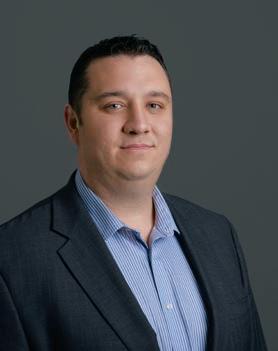
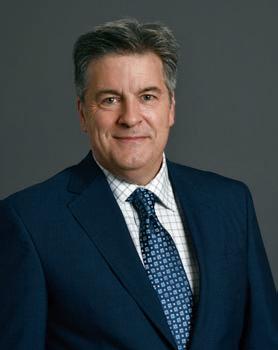 BY BRIAN ALLEN AND THOMAS DEMAYO
BY BRIAN ALLEN AND THOMAS DEMAYO
Business disaster is only a click away. Cyberattacks are becoming an epidemic affecting all businesses. A single mishap can critically impair business operations or even shut down operations entirely resulting in catastrophic financial and reputational damage.
Cyberattacks have been steadily increasing as well as getting more sophisticated and the challenge for companies to thwart these attackers continues to evolve. Business exposure has increased with more of the labor force working remotely, creating more entry points for intruders to exploit systems and get access to a company’s information and system resources.
According to the FBI Internet Crime Report 20221 , the potential loss has grown from $6.9 billion in 2021 to more than $10.2 billion in 2022. And while ransomware incidents have decreased, many attacks go unreported.
For businesses, cybercrime can include any of the following: Theft of financial and intellectual property or sensitive information of an individual that can be sold and used in other cybercriminal activities.
Cyberextortion, such as ransomware, where attackers install malicious code that encrypts company data, preventing the owner from accessing their data unless a ransom is paid for the encryption key. Another common form of extortion is the exfiltration of company data and a threat to make that data public unless the ransom is paid. Often, the attack will include both encryption and exfiltration, further increasing the pressure on the company to pay the ransom.
Diversion of funds through manipulated e-mails that result in the change of electronic payment instructions.
Denial of service attacks that result in company systems being overwhelmed and unable to process legitimate business transactions.
For a company to prepare successfully for and defend against the cyber threat, it must establish a cybersecurity program that includes a core competency and capability in the five pillars of information security: Identify, Protect, Detect, Respond and Recover.
As companies evaluate their security programs and look to align with the five pillars, below are some of the key controls they should consider:
Establish a cybersecurity committee. Effective governance and a philosophy of security that resonates from the top down is critical in the success of a cybersecurity program. Perform ongoing risk assessments and more technical exercises, such as penetration testing to evaluate the cyber defenses and response capabilities of the company. Perform effective due diligence on any third party that will store, process, transmit or have the potential to impact the security of the company.
Establish a cybersecurity awareness program. Educate
employees on cybersecurity threats and the identification of phishing e-mails. Ongoing phishing testing should be part of the overall awareness training program. Enforce strong logical access controls, such as robust passwords and multi-factor authentication. Multi-factor authentication (MFA) should be utilized consistently for access to remote systems or applications that contain data of value and for any privileged access to a system or application.
Restrict access to only what is needed for an individual to perform their assigned duties. Further, restrict access to not just the user, but also the device from which the user is connecting. Employ next generation anti-virus software, known as Endpoint Detection and Response platforms.
Install vendorprovided security patches on a consistent and timely basis relative to the risk of the vulnerability the patch is intended to fix.
Collect, analyze and store security logs from all critical systems, network devices, and applications. Alert on known security threats or anomalous activity.
Implement a backup strategy that is ransomware resilient so that in the event of a ransomware attack, a backup of last resort exists.
Be resilient. Establish and maintain an incident response, business continuity, and disaster recovery plan. Test the plans to ensure they will work as designed and employees fully understand their roles as part of the plans.
insurance and while it can provide some reimbursement for damages, it can’t prevent intrusions from occurring so it’s not a replacement for effective IT systems management.
Cybersecurity insurance coverage is on the rise, but in one recent survey, only 19% of organizations claimed to have coverage for cyber events beyond $600,000 and only 55% of organizations claimed to have any cybersecurity insurance at all.2
Cyber insurance is still a relatively young product and is going through rapid change as the carriers adjust to loss history and are still working around the edges of a highly unpredictable liability to make it a profitable business. The cost of coverage has been going up too and many firms view cyber coverage as a luxury.
Companies need to do proper planning to understand what their risks are and which cyber insurance products best fit their needs. This should all be done in the context of what the current internal risk management looks like and where it may be necessary to shore up its defenses. Policies are varied and may or may not include a provision for ransomware payments. Most policies will pay for network security, legal and forensic professionals, as well as the costs of restoring data and those necessary to get operations back up and running.
There are generally two types of loss liability — first-party and third-party — and policies may cover one or the other, or both.
Cybersecurity Insurance Companies can mitigate financial damage with cyber

First-party coverage typically includes reimbursement for investigations, IT forensics, risk assessments, loss of revenue due to business interruption and costs incurred for data breaches, including customer notification and credit monitoring for example. First-party coverage may also include ransomware payments to extortionists to enable the company to get its data back.
Third-party, also called cyber liability coverage, insures
Phishing attacks against banking systems have been on the uptick as well. They occur when a threat actor poses as a trusted person or organization to convince individuals to share sensitive information or to send money. Information often includes bank account or credit card information and can be used to make unauthorized purchases or commit bank wire fraud.
for damages the company may be blamed for and generally include coverage for costs of legal proceedings, settlements, and regulatory fines, for example.
A recent survey by the CRC Group, a wholesaler of specialty insurance, indicates that the minimum standards of underwriting cyber policies include affirmative controls, such as multi-factor authentication (MFA), endpoint detection, backup strategies and email security filtering. In addition to requiring more controls by the insured, many carriers are imposing sub-limits and, in some cases, introducing other exclusions to control their exposure. All this means that careful attention should be paid to obtaining the appropriate cyber policy and understanding the actual coverage and any limitations.
Lenders, just like any other business, have to be on guard to protect their information and they are not immune to vulnerabilities with their customers either. A ransomware attack can impair or shut down a customer’s business operations entirely and even put a company out of business. Paying a ransom does not guarantee data will be retrievable or that adverse data loss or exposure can be reversed.
Medium- and small-size businesses are at the greatest risk of becoming victims of cybercriminal activity. They don’t typically have the resources and sophistication of larger enterprises and are often more vulnerable. A smaller business may very well be unable to pay a ransom or cover uninsured losses if they have insurance coverage at all.
Phishing attacks against banking systems have been on the uptick as well. They occur when a threat actor poses as a trusted person or organization to convince individuals to share sensitive information or to send money. Information often includes bank account or credit card information and can be used to make unauthorized purchases or commit bank wire fraud. These acts can be costly to lenders and put them at reputational risk. Borrowers’ information that is hacked can be used by criminals to get fraudulent access to bank funds in the lender’s accounts.
Lenders should include in their customer risk analysis a general understanding of their customer’s business and general controls around cybersecurity. In some cases, lenders or potential lenders may require a security audit to help a company determine where there may be weaknesses in a company’s IT systems.
Brian Allen is a partner with PKF Clear Thinking and has over 25 years of experience serving in controller and CFO positions with both public and private companies. Over the past 15 years, Allen has been engaged by numerous companies in the consumer electronics, beverage, nursery, media, furniture, printing, consumer product, retail, and manufacturing
industries to improve financial operations and performance with strategic and financial alternatives, and to serve in interim senior financial positions. During his career, he has had direct responsibility for the accounting, finance, treasury, information technology, real estate, and investor relations functions. Prior to joining PKF Clear Thinking, Allen owned a financial advisory practice with a focus on middle market, consumer product businesses. He can be reached at ballen@pkfct.com.
Thomas J. DeMayo is a partner with PKF O’Connor Davies Advisory LLC. He leads the Firm’s Cybersecurity and Privacy Advisory Group and is responsible for the implementation and design of cybersecurity and privacy related services, internal and external audit programs and testing procedures. He focuses on services relating to threat and vulnerability management, governance, privacy, incident response, business continuity, disaster recovery and computer forensics.
He has 20 years of experience with securing and managing information risk across a wide range of industries including commercial entities, hospitality, not-for-profit, governmental, healthcare, private schools and higher education. DeMayo is also a computer forensic specialist and can assist with the acquisition and analysis of data in a forensically sound and legally approved manner.
DeMayo specializes in the areas of information threat and vulnerability management, PCI-DSS compliance, SOX 404 IT Controls, HIPAA, COBIT, and ISO 27001. He has helped many organizations achieve their compliance obligations through intensive and meaningful compliance gap analysis, cyber and information security risk assessments, privacy assessments and penetration tests. Tom has also made numerous presentations on cybersecurity before client and industry groups and has written extensively in this area. He can be reached at tdemayo@pkfod.com.
SFNet’s March 30th Crucial Conversations webinar, “The Value and Effective Use of Covenants in a Factoring Transaction,” focused on why covenants are needed in a discretionary factoring facility; covenant types and reporting frequency; the art of picking the right covenant(s); the value of compliance certificates; whether covenants imply a lending commitment; the value and importance of a good “market” factoring agreement and more. Here, panelist Hugh Larratt-Smith provides a recap of the webinar.
Moderator: Peter Hughes, sr. vice president, Merchant
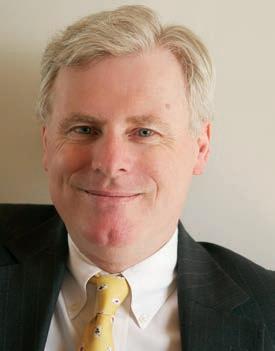
Financial
Panelists:
Jeanne Siegel, partner, Business Finance, Thompson Coburn Hahn & Hessen LLP
Hugh Larratt-Smith, managing director, Trimingham
Elena Goynatsky, managing director, Commercial Services, Webster Bank
Brad Stanza, senior vice president, Wells Fargo
In 1928, the newly constructed The Lefcourt Clothing Center, a massive block-long building on 7th Avenue that housed hundreds of garment companies, was the epicenter of New York’s garment industry that stretched from 13th Street to 42nd Street, with Seventh Avenue – Fashion Avenue – as its spine. It was one of the first fire-proof industrial loft buildings in New York, an attractive feature for garment companies, coming on the heels of The Triangle Shirtwaist Company fire in 1911. One of the central figures in the development of the garment district was Abraham Lefcourt, a dynamo whose rise to riches from poverty is the story of the American garment industry.
This compact industrial area, less than a mile and a half mile long, housed nearly 7,000 garment shops and employed nearly 200,000 workers. Unlike Chicago’s garment district with its gigantic factories that employed eight to ten thousand workers, the majority of New York’s garment companies employed less than ten workers and only 200 had more than 50 workers. Despite this difference, these Manhattan garment shops comprised the biggest manufacturing industry in the largest industrial city on earth at the time. In 1927, over 50%
of the dresses made in America came from the garment district in Manhattan.
The vast majority of these companies were owned by Eastern European immigrants who arrived in America with little money. Factoring was the only financing available to many of these entrepreneurs.
Many got their start in home production in Lower East Side tenements, but by 1910, new state laws prohibited home production. This led to migration to the area around Madison Square at Fifth Avenue. Problems soon arose, however. In 1914, the owners of the large department stores, backed by leading banks of the area, mobilized to force the garment companies away from Fifth Avenue. The fear was that the garment companies’ cut and sew operations would move further up Fifth Avenue to 34th Street, home to Macy’s and Gimbels. The retailers pressured New York City banks to stop financing the construction of buildings for the garment companies. In 1921, the store owners and garment entrepreneurs reached a city-shaping agreement: Seventh Avenue would be the new center of the garment trade. However, one of the lasting legacies of these seven years of acrimony was that many New York City banks became reluctant to finance the garment industry.
HUGH LARRATT-SMITH Trimingham IncFactoring became the jet fuel for a massive number of New York City garment entrepreneurs in The Jazz Age.
Fast forward 100 years.
Factoring has proliferated into many tributaries in the American economy. And factoring has, in many cases, increased in complexity. With complexity comes the need for legal frameworks that have vastly evolved over the decades.
In a recent SFNet Webinar, Peter Hughes from Merchant Financial moderated a panel entitled “The Value and Effective Use of Covenants in a Factoring Transaction”. The following are the highlights from this Webinar.
Peter Hughes: Hugh, how have the events in the banking industry affected the outlook for factoring?
Hugh Larratt-Smith: Federal Reserve Bank Chair Powell has said that credit is tightening, as have several chief risk officers that I know. U.S. bank lending contracted by the most on record in the last two weeks of March 2023, indicating a tightening of credit conditions in the wake of several high-profile bank collapses that risks damaging the economy. Commercial bank lending dropped nearly $105 billion in the two weeks ended
March 29, 2023, the most in Federal Reserve data back to 1973.
I think this will trigger a migration to factoring. Many bank borrowers will discover they have nowhere else to go other than control rescue equity. This is good for banks that offer both ABL and factoring to avoid asset run-off as ABL borrowers are forced to pivot to factoring for working capital financing. These borrowers will typically be accustomed to covenants in their loan agreements.
In the face of tightening credit, I think the factoring companies which use bank lines to fund their portfolios will face greater portfolio scrutiny by the lender finance groups at banks – so, the more factoring relationships with covenants, the better. With greater OCC scrutiny, bank-owned factoring groups which don’t currently require covenants may face pressure from the OCC to strengthen their factoring relationships with covenants.
Bradley Stanza: We typically require covenants on larger deals. Call it “belts and suspenders”. I think that covenants keep the customer a little bit more engaged and, as long as they stay within those “guardrails”, they know they are doing something right. We try to keep it simple, since many of our customers are entrepreneurs or family- owned businesses. Our usual covenants are minimum net worth or a minimum increase in net worth. We like it to be “cut and dried”, so there is no ambiguity. On legacy and smaller deals, we don’t usually have covenants.
Hughes: Elena, talk to me about “The Art of Selling the Right Covenants.”
Elena Goynatski: I like to keep it simple and readily understandable. Covenants that are measurable and tested on a timely basis are best. I like covenants that focus on how the business is managed, such as limits on distributions and minimum net worth. When I am discussing covenants with a new borrower, a lot depends on their prior financial performance and business model. For example, a seasonal apparel company needs covenants that mirror the tempo of their business and their business model – that take into account those slow sales months. It is also important to avoid hindering the relationship by requiring a number of overlapping covenants. Many smaller clients don’t have a CFO – or sometimes even a controller, so preparing interim and monthly statements is not possible. All we get is the annual tax return of the borrower. That makes testing financial covenants less meaningful. Instead, we rely on borrowing bases that can track accounts receivable and inventory aging. By watching the collateral on a daily or weekly basis, we have almost real - time knowledge of what is happening at the borrower. Since we have full dominion, we can control the risk more closely. Finally, all ABL borrowers are accustomed to covenants, so any factoring company sales reps should ask for them in the first meeting.
Stanza: I agree. If a company is owned by a private equity group, then that borrower will be accustomed to covenants, and the factoring sales rep should always require them. For entrepreneurial and family-owned businesses, I like covenants that limit distributions and related party transactions. In some cases, I will get affiliates and subsidiaries in the loan agreement. Another very effective covenant is testing for accounts payable aging, so that the borrower is prevented from leaning on the trade.
Hughes: I like the accounts payable covenant a lot. Agree, if the borrower sees the covenants as guardrails and knows you won’t hammer the company if leverage is 4.5X versus 4X in a quarter because of a hiccup, that creates a positive working relationship. Covenants help us all understand where the business is headed and alert us to problems on the way.
Larratt-Smith: Covenants that are financial tests for borrowers, such as fixed charge coverage and tangible net worth, actually help owner/managers plan and budget. Running a business with no plan and budget is like driving across country with no road map. With a solid plan and budget in place, there is less likelihood of panic, which can lead to fraud – we don’t like to see companies driving off the edge of the cliff leaving no skid marks. Covenants can “foam the runway”, allowing the factor to help with a soft landing and be a true partner to the borrower. Some borrowers will say that they “steer their boat by looking at its wake” and therefore covenants are useless. In the process of crafting covenants, borrowers may realize the value of a rolling 13-week cash-flow forecast. When companies are migrating to ABL from leveraged finance structures, many realize that the discipline of borrowing base compliance is positive for the management of the business. The same holds true for factoring borrowers, especially when the borrower is signing a monthly compliance certificate. Robust covenants can allow the factoring sales team to back off an unconditional guarantee to a “bad boy/girl” guarantee.
Hughes: Jeanne, do covenants imply a lending commitment?
Jeanne Siegel: No, there is no New York State law that recharacterizes a discretionary facility as a committed facility. That said, one needs to be very careful about putting in things that make it look like a committed facility. When litigation arises, it is usually centered around whether the implied covenant of good faith and fair dealing affects the lenders’ rights to exercise discretion.
Hughes: Jeanne, from a legal perspective, if I’m going to bring the borrower to the table who trips a covenant, should I put them on notice?
Siegel: Yes, always put them on notice, maybe through a Reservation of Rights letter. Hopefully, they can correct their course and fix the problem.
Stanza: We call it out immediately, so no one comes back later. We may require a 13- week cash-flow forecast if we are concerned about the collateral and cash flow – more so than the balance sheet at that juncture.
Hughes: Hugh, in a turnaround situation how are covenants best utilized?
Larratt-Smith: Many owner/managers think that “de Nile” is a river in Egypt, not their management style. Many owner/managers have never experienced the type of turbulence that may lie ahead. Covenant defaults bring the owner/ manager to the table, may put an end to denial and may force them look in the mirror.
By the close of The Roaring 20s, Seventh Avenue’s reputation was firmly established as a style center second only to Paris. New York City’s temperament in The Jazz Age was best captured by the entrepreneurial spirits of Seventh Avenue: fast moving, competitive, quickly adaptive, and resourceful. A key driver in the success of Seventh Avenue was the abundance of working capital provided by entrepreneurial factoring companies.
By 1927, Abraham Lefcourt’s real estate holdings with Seventh Avenue as its spine, was worth over $100 million. In 1928, he built over $50 million of new buildings in mid-town. By then, he was the largest individual owner of factory loft buildings in the garment district. Like many others, he lost his most of his fortune in the crash of 1929 and the onset of The Depression. The last building he developed - the Lefcourt-Alan Building at Broadway and 49th Street - became the Brill Building when Lefcourt defaulted in 1932. Named after his son, Alan, who died at 17 years of age in 1930, the building had a bronze bust of a young man above the front entrance, looking down Broadway toward the garment district.
Hugh Larratt-Smith, MBA, is a turnaround and crisis management specialist with experience spanning 30 years. He is a managing director, Trimingham Inc.
Hugh is on the Board of Directors of the New York (Upstate) Chapter of TMA and was a founder of the Toronto (1992), New York – Upstate (1998) Serbia (2014) and Croatia (2015) TMA Chapters. He was a director of the Secured Finance Foundation in New York for 10 years.
For the past two decades, Hugh has been a contributing author for The Secured Lender and The ABF Journal. He can be reached at Larratt@trimingham. com.

By the close of The Roaring 20s, Seventh Avenue’s reputation was firmly established as a style center second only to Paris. New York City’s temperament in The Jazz Age was best captured by the entrepreneurial spirits of Seventh Avenue: fast moving, competitive, quickly adaptive, and resourceful.
are ways to combat it.
Is “imposter syndrome” real? Unfortunately, for many people it is. I have worked in corporate America, advanced to executive-level leadership roles, and participated in leadership support groups for women and people of color. Based on my experience, I can attest to the anxiety-inducing effects imposter syndrome can have.
Introduced in 1978 by two psychologists, Pauline Clance and Suzanne Imes, this phenomenon was then defined as a self-perceived fear of intellectual phoniness. Though popular culture frequently adopts the term imposter “syndrome,” the terms “phenomenon” or “experience” are more appropriate as they don’t connote a clinical diagnosis or suggest permanence.
Understanding of the phenomenon has expanded over time to include feelings of not belonging, undervaluing your competence, and attributing your success to luck or other external factors. The experience is pervasive: A 2020 study in the Journal of General Medicine found that up to 82 percent of respondents faced feelings of impostor phenomenon, including that they hadn’t earned what they had achieved.
Factors like race, ethnicity, sex, gender identity, and age affect the likelihood that a person will experience imposter phenomenon. For example, Black, Indigenous, and people of color (BIPOC) who work or study in predominantly White environments wrestle with impostor feelings at higher rates, either contending with feelings that they don’t belong or that they’re products of affirmative action, according to Kevin Cokley, Ph.D., a professor of educational psychology at the University of Texas at Austin who has studied impostor phenomenon since 2013.
There can be no meaningful discussion about imposter phenomenon and how it holds women and other individuals back in their careers without consideration of workplace culture and climate—meaning what an organization values in principle and, more importantly, in action. Imposter phenomenon is common in times of uncertainty or significant change. In work settings, it often coincides with taking a new job, being promoted, or being given responsibility for leading a high-profile project. Despite their qualifications, many professionals reported experiencing anxiety, self-doubt, and exhaustion from doubling and tripling their efforts when taking on new responsibilities. These feelings are often hastened by passive-aggressive, undermining, and sometimes hostile behavior of colleagues who are uncomfortable (subconsciously or not) with the authority of a woman or BIPOC individual in a leadership position.
In these circumstances it’s vital for organizations to have resources in place to support the success of new leaders. Cultivating an inclusive culture focused on equity and belonging, instituting mentoring programs for new leaders, and holding individuals accountable for toxic behavior are some of the ways that imposter phenomenon in the workplace can be mitigated.
If you are experiencing imposter syndrome, remember that you are not alone. Feelings associated with imposter phenomenon can affect people in various aspects of life, such as work, academics, romantic relationships, and friendships. Here are some tips for handling it.
Gain perspective. Share your experience with people you trust. They likely see you differently than you see yourself, and their feedback can be helpful with truly understanding the value of your skills and accomplishments.
Reframe negativity. When you recognize that you’re engaged in negative internal thoughts and put-downs, acknowledge them, let them go, and replace them with, “I can, I will, and I have” statements. These allow you to anticipate the positive result you want to experience.
Prioritize progress over perfection. Striving to be perfect focuses on achieving an unattainable result. Progress focuses instead on learning, growing, and improving as a complete person while you work toward accomplishing your goal.
Recognize that failure is OK. Sheila Wellington, a business leader and think tank executive once said, “At the end of the day, it’s not how far you fall but how high you bounce.” Failure offers many lessons, not the least of which is how to succeed.
Celebrate success. The times we live in value speed, instant gratification, and moving on to the next thing. Allow yourself to experience the benefits of taking time to reflect on what you’ve accomplished, how it makes you feel, and
Many people, especially women and people of color, experience self-doubt and think they don’t deserve the success they’ve achieved. Known as “imposter syndrome,” this view of self can be debilitating if left unchecked. Here
any lessons learned. Don’t be too quick to consider what’s next when you haven’t spent enough time with what’s now.
Although individuals can take steps to change how they think about themselves, employers share responsibility for combating imposter phenomenon in the workplace. It is a business imperative for leaders to create more inclusive work environments where people of every race, ethnicity, sex, gender identity, and age believe in their own ability to lead and succeed.

This article originally appeared on asaecenter. org. Reprinted with permission.
Copyright ASAE: The Center for Association Leadership (June 2022), Washington, DC.
Sheila Amo is founder and CEO of the Perry Perspective, LLC, a consulting group based in Annapolis, Maryland, and Washington, DC.
In these circumstances it’s vital for organizations to have resources in place to support the success of new leaders. Cultivating an inclusive culture focused on equity and belonging, instituting mentoring programs for new leaders, and holding individuals accountable for toxic behavior are some of the ways that imposter phenomenon in the workplace can be mitigated.
This column highlights the hard work and dedication of SFNet committee volunteers. Here we speak with Larry Flick, firm-wide vice chair, and chair of the Financial Services Industry Group at Blank Rome, LLP, and the chair of SFNet’s Membership Committee.
TSL: Please provide us with some background on your career. Flick: I’ve been practicing law for my entire career, about 40 years, with Blank Rome. I started at Blank Rome in Philadelphia, where the firm was founded in 1946, and clerked for them both summers during law school. The firm has expanded and now has 14 offices and approximately 700 lawyers.
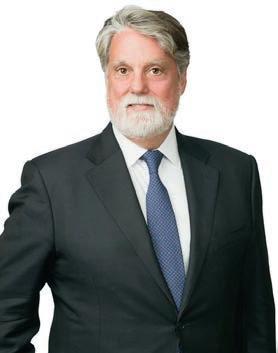
I’ve always been involved in asset-based lending and secured finance from the day I joined the law firm. Even while I was a summer law clerk, I spent a lot of time working with our secured lending and restructuring group. I attended my first SFNet (Commercial Finance Association at the time) Annual Convention in New York when I was a first- or second-year associate and I’ve been attending local and national SFNet events ever since.
I lead Blank Rome’s financial services industry practice firmwide and spend significant time in our offices in New York, Chicago, Los Angeles, Houston, and Philadelphia. Our group is now about 85 lawyers across the country representing secured lenders in loan transactions, restructurings and in bankruptcy proceedings and enforcement actions.
For someone who’s reading this and may want to join SFNet’s Membership Committee, how would you describe it to them? What are some of the benefits of being an SFNet member?
I think membership is critical to the success of SFNet, and continuing to add new members is important. SFNet is an organization that exists for its members to support the industry and for the members. So, we need to make sure that all the significant players in asset-based lending, factoring, and secured finance are represented. Every year we have membership attrition going back many years due to mergers and consolidation in the banking and finance industry. SFNet is an organization that is not only for the members, but it’s also run by the members with important support from the SFNet staff.
It is an organization where the members are active on many
committees, including the Membership Committee, and can make a difference.
Our committee is focused on identifying and convincing nonmembers of the value of being an SFNet member. Membership helps you increase market share through referral sources across the industry, network and participate in syndicated deals, increase your organization’s exposure immediately to potential partners, connects you with thought leaders from across the secured finance community and more.
There is also industry data that is only available to SFNet national members, including SFNet’s Annual Asset-Based Lending & Factoring Survey, which has measured year-toyear asset-based lending and factoring activity since 1976. Trends in asset-based lending are demonstrated in SFNet’s Quarterly ABL Index, which provides new business and portfolio performance indicators for members on a quarterby-quarter basis. The Secured Finance Foundation conducts a Secured Finance Industry Market Sizing and Impact Study for benchmarking, strategic planning, attracting capital and assisting in advocacy efforts on behalf of the industry. For some of the studies, excerpts are available for non-members, but full reports are only available for members.
Members can attend unlimited on-demand SFNet education courses, Crucial Conversations webinar series and member forums. They also receive registration discounts for SFNet’s events, including its Annual Convention and Asset-Based Capital Conference. SFNet members receive a significant registration discount for the Annual Convention, SFNet’s largest event.
We have a very active committee, and we work to identify people who would benefit from becoming SFNet members through both our regular meetings and at other industry events. So, we’re all ambassadors for SFNet.
For example, one of our priorities this year is focusing on non-bank credit funds that should become SFNet members. We’ve had several non-bank credit funds join as members in the last couple of years. We exhibited at the LSTA’s Private Credit Industry Conference on Direct Lending and Middle Market Finance for the first time April 27-28 in Ft. Lauderdale, FL to let those attendees know the benefits of being an SFNet member and participation in the industry.
We are also focused on engaging with community banks, as they are one of our targeted audiences that are involved in or want to be involved in asset-based lending. The Committee identifies various service providers that are working with the asset-based lending community and are not members. We review and approve all new member applications and are thrilled that SFNet has had about 60 new members join during the past two years and has a 92% renewal rate.
We have also added two new Committee members this year, Cassie Rosenthal, and Jeanne Siegel. The Committee is mostly comprised of senior people who know the industry well and have personal relationships that enable them to approach prospective members at a senior executive level. James Kravitz and Rich Gumbrecht of SFNet are critical to the success of the committee, they’re very active, and we work with them closely. Once we’ve identified somebody that we think should be an SFNet member, the committee tries to identify which of us, and sometimes that’s several people, know them best and we reach out and talk to them about the significant benefit of being an SFNet member.
How much time is involved if you’re a Membership Committee member?
A couple of hours a month. We’ll have monthly meetings on Zoom, sometimes more. Attending the meetings and then making calls and meeting with people that are prospective members are also part of what’s involved.
What are some of your goals for the remainder of the year as chair of the Membership Committee?
Our goals are to make sure that all secured lenders and service providers who service the asset-based lending industry are members and to have more engagement with community banks and private debt funds. We also strive to replace the members that have left the organization for various reasons, including because they’ve merged with another member, which happens almost every year, and to end up with a net increase in membership.
When you’re not busy at Blank Rome or SFNet, what can you be found doing?
I spend a lot of time with my family and friends. My wife and I like to travel and play golf. This year we have been playing competitive croquet.
Chairperson: Lawrence F. Flick, Blank Rome LLP
Staff Liaison: James Kravitz, Secured Finance Network
John M. DePledge Valley National Business Capital
Mark Fagnani, PKF Clear Thinking
Robert P. Grbic, White Oak Commercial Finance, LLC
Frank Grimaldi, Gordon Brothers
Richard Gumbrecht, Secured Finance Network
Michael D. Haddad, Axiom Bank, N.A.
Stewart W. Hayes, Wells Fargo Capital Finance
Lawrence E. Klaff, First Eagle Alternative Credit
Cassie Rosenthal, Rosenthal & Rosenthal, Inc.
Jeanne F. Siegel, Thompson Coburn Hahn & Hessen LLP
Why is this committee important and why are you a part of it?
Mark Fagnani, PKF Clear Thinking: “What I enjoy most about being on any committee for SFNet, including the Membership Committee, is the sense of community I get from assisting an industry association dedicated to furthering the interests of all members. The work we do, we do for each other, and the overall industry, and I like being a small part of that. I am proud that as a group, the Membership Committee has been able to continue to attract and retain an increasing number of members each year. We do this through outreach and relationships and cooperative work among the members of the committee and it is gratifying to know we are successful. Beyond that, there is camaraderie and good humor in the committee, and it is fun participating, not an effort. I have great colleagues on the committee and encourage others to volunteer.
Robert P. Grbic, White Oak Commercial Finance, LLC: As a member of the SFNet, we believe there is strengthen in numbers in supporting our industry. New members often bring new concepts and approaches in expanding our collective market reach.
James Kravitz, Secured Finance Network: We’ve added 15 new members this fiscal year so far. Members enjoy discounts at SFNet conferences and programs including: SFNet’s Annual Convention, Asset-Based Capital Conference, one-day conferences and in-person and online education classes. Our Crucial Conversations webinars are free for members.
This new column will highlight those times in our professional lives where we are especially proud of a successful outcome; the times where it was “all worth it.” Thank you to Mark Fagnani of PKF Clear Thinking and a member of the SFNet Content Council for suggesting the concept of this column. If you’d like to participate, please reach out to Eileen Wubbe at ewubbe@sfnet.com.
BY EILEEN WUBBE MARK FAGNANI Senior Managing Director, PKF Clear ThinkingA long-time borrower that was an importer came to us asking for a very large overadvance. They claimed they had received significant new orders from one of the major retailers and would need to significantly increase their inventory. That meant opening a large volume of L/Cs as well as increasing the inventory sub-limit. With the help of our field exam team, we verified the orders and matched them up with the vendor purchase orders backing the L/Cs. We were very comfortable with the character of the owners and decided to proceed as requested. All the goods came in as planned and went out to the new customer as planned. The overadvance was repaid, the company’s volume grew exponentially and they made a lot of money. We solidified our relationship such that they remained our client for over 20 years. Whenever I met with the principals, they referred to us as more than their lenders, but as trusted advisors and partners. I loved hearing that and working with this company.
Anna Piszczatowski, Associate, Thompson Coburn Hahn & Hessen LLPEarlier this year, I tackled one of the most challenging transactions of my career. My team and I were tasked with documenting the refinancing of a revolving asset-based lending facility for an aircraft manufacturer and simultaneously negotiating with a new term loan creditor. Knowing the pandemic’s detrimental impact on the airline industry, I was excited to
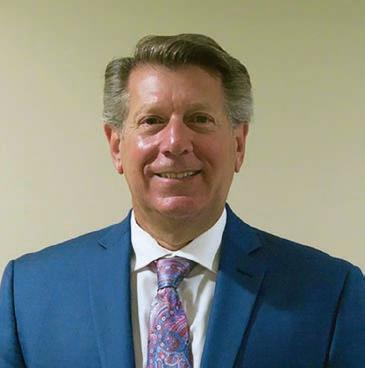
take a leadership role on a team that would support and strengthen such a significant trade.
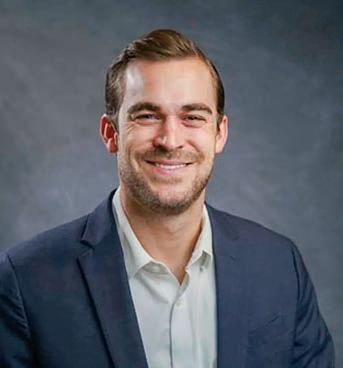
As this was a large refinancing in the midst of pandemic pressures, the deal naturally had a few significant bumps in the road to closing - from negotiating delicate intercreditor issues and dealing with specialty collateral, to working through difficult facts in the borrower’s due diligence disclosures - but with the support of a great team, the transaction finally came to a close after four months. Thankfully, I was provided with a robust team, which allowed me to delegate many curveballs (including a last-minute merger of two of the borrower’s subsidiaries).
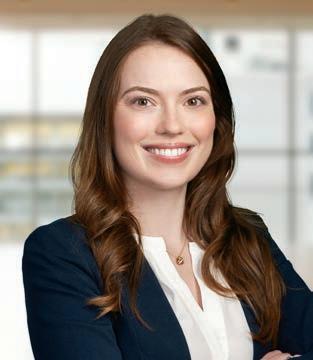
Though a bit cliche, it is undeniable that the challenges we face in life pave the way for the greatest growth. I believe this transaction single-handedly gave me the boost and confidence to become a leader at my firm and for my clients, and I look forward to working on more complex deals in the future. It was certainly rewarding and inspiring to see so many different lenders and law firms work together toward a common goal.
terms trickled down by the owner, but liked their work and did not want to lose them to other projects. Enter CapitalPlus. The savvy owner understood that even though it would slightly lower their margins, a factoring company was a smart option to support his subcontractor’s timely needs. Keeping the subcontractor’s cash flow positive would accelerate the project and eliminate costs on the back end of the development. As a result, their subcontractors have been thrilled with being paid early, and are willing to commit to more work in the future while the GC’s company continues to grow rapidly.
Construction is a unique space where not many lenders like to play. This results in contractors contacting me daily to assist with their weekly payroll and monthly payables. Many of these contractors might be fantastic out in the field, but their shortfall is their back office. For example, last month CapitalPlus offered a growing Texas-based general contractor a $2 million working capital facility. This facility provided the additional funding needed to build a new 800-unit apartment complex. The owner of the company had over 20 years of experience in the industry, but due to only being in business for two years, his bank was not willing to offer any additional funding beyond the construction loan. He knew his subcontractors could not handle the extended payment





























Hilco Corporate Finance (HCF) has re-imagined how best to provide investment banking services to the middle market. Our practice is designed from the client’s point of view — delivering a customized, solutionsbased approach to every transaction. HCF’s seasoned team of professionals have decades of experience providing M&A advisory, private capital markets, and special situations/restructuring advisory services across a broad range of industries. As an a liate of Hilco Global, HCF clients also benefit from the expertise and relationships of the global leader in asset valuation, monetization, and related business advisory services. For more information on how Hilco Corporate Finance can assist you, please contact Geo Frankel at 847.504.3263 or gfrankel@hilcocf.com.






